- Home
- FPMT Homepage
Foundation for the Preservation of the Mahayana Tradition
The FPMT is an organization devoted to preserving and spreading Mahayana Buddhism worldwide by creating opportunities to listen, reflect, meditate, practice and actualize the unmistaken teachings of the Buddha and based on that experience spreading the Dharma to sentient beings. We provide integrated education through which people’s minds and hearts can be transformed into their highest potential for the benefit of others, inspired by an attitude of universal responsibility and service. We are committed to creating harmonious environments and helping all beings develop their full potential of infinite wisdom and compassion. Our organization is based on the Buddhist tradition of Lama Tsongkhapa of Tibet as taught to us by our founders Lama Thubten Yeshe and Lama Thubten Zopa Rinpoche.
- Willkommen
Die Stiftung zur Erhaltung der Mahayana Tradition (FPMT) ist eine Organisation, die sich weltweit für die Erhaltung und Verbreitung des Mahayana-Buddhismus einsetzt, indem sie Möglichkeiten schafft, den makellosen Lehren des Buddha zuzuhören, über sie zur reflektieren und zu meditieren und auf der Grundlage dieser Erfahrung das Dharma unter den Lebewesen zu verbreiten.
Wir bieten integrierte Schulungswege an, durch denen der Geist und das Herz der Menschen in ihr höchstes Potential verwandelt werden zum Wohl der anderen – inspiriert durch eine Haltung der universellen Verantwortung und dem Wunsch zu dienen. Wir haben uns verpflichtet, harmonische Umgebungen zu schaffen und allen Wesen zu helfen, ihr volles Potenzial unendlicher Weisheit und grenzenlosen Mitgefühls zu verwirklichen.
Unsere Organisation basiert auf der buddhistischen Tradition von Lama Tsongkhapa von Tibet, so wie sie uns von unseren Gründern Lama Thubten Yeshe und Lama Thubten Zopa Rinpoche gelehrt wird.
- Bienvenidos
La Fundación para la preservación de la tradición Mahayana (FPMT) es una organización que se dedica a preservar y difundir el budismo Mahayana en todo el mundo, creando oportunidades para escuchar, reflexionar, meditar, practicar y actualizar las enseñanzas inconfundibles de Buda y en base a esa experiencia difundir el Dharma a los seres.
Proporcionamos una educación integrada a través de la cual las mentes y los corazones de las personas se pueden transformar en su mayor potencial para el beneficio de los demás, inspirados por una actitud de responsabilidad y servicio universales. Estamos comprometidos a crear ambientes armoniosos y ayudar a todos los seres a desarrollar todo su potencial de infinita sabiduría y compasión.
Nuestra organización se basa en la tradición budista de Lama Tsongkhapa del Tíbet como nos lo enseñaron nuestros fundadores Lama Thubten Yeshe y Lama Zopa Rinpoche.
A continuación puede ver una lista de los centros y sus páginas web en su lengua preferida.
- Bienvenue
L’organisation de la FPMT a pour vocation la préservation et la diffusion du bouddhisme du mahayana dans le monde entier. Elle offre l’opportunité d’écouter, de réfléchir, de méditer, de pratiquer et de réaliser les enseignements excellents du Bouddha, pour ensuite transmettre le Dharma à tous les êtres. Nous proposons une formation intégrée grâce à laquelle le cœur et l’esprit de chacun peuvent accomplir leur potentiel le plus élevé pour le bien d’autrui, inspirés par le sens du service et une responsabilité universelle. Nous nous engageons à créer un environnement harmonieux et à aider tous les êtres à épanouir leur potentiel illimité de compassion et de sagesse. Notre organisation s’appuie sur la tradition guéloukpa de Lama Tsongkhapa du Tibet, telle qu’elle a été enseignée par nos fondateurs Lama Thoubtèn Yéshé et Lama Zopa Rinpoché.
Visitez le site de notre Editions Mahayana pour les traductions, conseils et nouvelles du Bureau international en français.
Voici une liste de centres et de leurs sites dans votre langue préférée
- Benvenuto
L’FPMT è un organizzazione il cui scopo è preservare e diffondere il Buddhismo Mahayana nel mondo, creando occasioni di ascolto, riflessione, meditazione e pratica dei perfetti insegnamenti del Buddha, al fine di attualizzare e diffondere il Dharma fra tutti gli esseri senzienti.
Offriamo un’educazione integrata, che può trasformare la mente e i cuori delle persone nel loro massimo potenziale, per il beneficio di tutti gli esseri, ispirati da un’attitudine di responsabilità universale e di servizio.
Il nostro obiettivo è quello di creare contesti armoniosi e aiutare tutti gli esseri a sviluppare in modo completo le proprie potenzialità di infinita saggezza e compassione.
La nostra organizzazione si basa sulla tradizione buddhista di Lama Tsongkhapa del Tibet, così come ci è stata insegnata dai nostri fondatori Lama Thubten Yeshe e Lama Zopa Rinpoche.
Di seguito potete trovare un elenco dei centri e dei loro siti nella lingua da voi prescelta.
- 欢迎 / 歡迎
简体中文
“护持大乘法脉基金会”( 英文简称:FPMT。全名:Foundation for the Preservation of the Mahayana Tradition) 是一个致力于护持和弘扬大乘佛法的国际佛教组织。我们提供听闻,思维,禅修,修行和实证佛陀无误教法的机会,以便让一切众生都能够享受佛法的指引和滋润。
我们全力创造和谐融洽的环境, 为人们提供解行并重的完整佛法教育,以便启发内在的环宇悲心及责任心,并开发内心所蕴藏的巨大潜能 — 无限的智慧与悲心 — 以便利益和服务一切有情。
FPMT的创办人是图腾耶喜喇嘛和喇嘛梭巴仁波切。我们所修习的是由两位上师所教导的,西藏喀巴大师的佛法传承。
繁體中文
護持大乘法脈基金會”( 英文簡稱:FPMT。全名:Found
ation for the Preservation of the Mahayana Tradition ) 是一個致力於護持和弘揚大乘佛法的國際佛教組織。我們提供聽聞, 思維,禪修,修行和實證佛陀無誤教法的機會,以便讓一切眾生都能 夠享受佛法的指引和滋潤。 我們全力創造和諧融洽的環境,
為人們提供解行並重的完整佛法教育,以便啟發內在的環宇悲心及責 任心,並開發內心所蘊藏的巨大潛能 — 無限的智慧與悲心 – – 以便利益和服務一切有情。 FPMT的創辦人是圖騰耶喜喇嘛和喇嘛梭巴仁波切。
我們所修習的是由兩位上師所教導的,西藏喀巴大師的佛法傳承。 察看道场信息:
- FPMT Homepage
- News/Media
-
- Study & Practice
-
-
- About FPMT Education Services
- Latest News
- Programs
- New to Buddhism?
- Buddhist Mind Science: Activating Your Potential
- Heart Advice for Death and Dying
- Discovering Buddhism
- Living in the Path
- Exploring Buddhism
- FPMT Basic Program
- FPMT Masters Program
- FPMT In-Depth Meditation Training
- Maitripa College
- Lotsawa Rinchen Zangpo Translator Program
- Universal Education for Compassion & Wisdom
- Online Learning Center
-
- Prayers & Practice Materials
- Overview of Prayers & Practices
- Full Catalogue of Prayers & Practice Materials
- Explore Popular Topics
- Benefiting Animals
- Chenrezig Resources
- Death & Dying Resources
- Lama Chopa (Guru Puja)
- Lama Zopa Rinpoche: Compendium of Precious Instructions
- Lama Zopa Rinpoche: Life Practice Advice
- Lama Zopa Rinpoche Practice Series
- Lamrim Resources
- Mantras
- Prayer Book Updates
- Purification Practices
- Sutras
- Thought Transformation (Lojong)
- Audio Materials
- Dharma Dates - Tibetan Calendar
- Translation Services
- Publishing Services
- Ways to Offer Support
- Prayers & Practice Materials
-
- Teachings and Advice
- Find Teachings and Advice
- Lama Zopa Rinpoche Advice Page
- Lama Zopa Rinpoche: Compendium of Precious Instructions
- Lama Zopa Rinpoche Video Teachings
- ༧སྐྱབས་རྗེ་བཟོད་པ་རིན་པོ་ཆེ་མཆོག་ནས་སྩལ་བའི་བཀའ་སློབ་བརྙན་འཕྲིན།
- Podcasts
- Lama Yeshe Wisdom Archive
- Buddhism FAQ
- Dharma for Young People
- Resources on Holy Objects
- Teachings and Advice
-
-
*If a menu item has a submenu clicking once will expand the menu clicking twice will open the page.
-
-
- Centers
-
- Teachers
-
- Projects
-
-
-
-
*If a menu item has a submenu clicking once will expand the menu clicking twice will open the page.
-
-
- FPMT
-
-
-
-
-
Every second of this human life gives us the freedom to choose between hell and enlightenment, samsara and liberation.
Lama Zopa Rinpoche
-
-
-
- Shop
-
-
-
The Foundation Store is FPMT’s online shop and features a vast selection of Buddhist study and practice materials written or recommended by our lineage gurus. These items include homestudy programs, prayers and practices in PDF or eBook format, materials for children, and other resources to support practitioners.
Items displayed in the shop are made available for Dharma practice and educational purposes, and never for the purpose of profiting from their sale. Please read FPMT Foundation Store Policy Regarding Dharma Items for more information.
-
-
Social Services
16
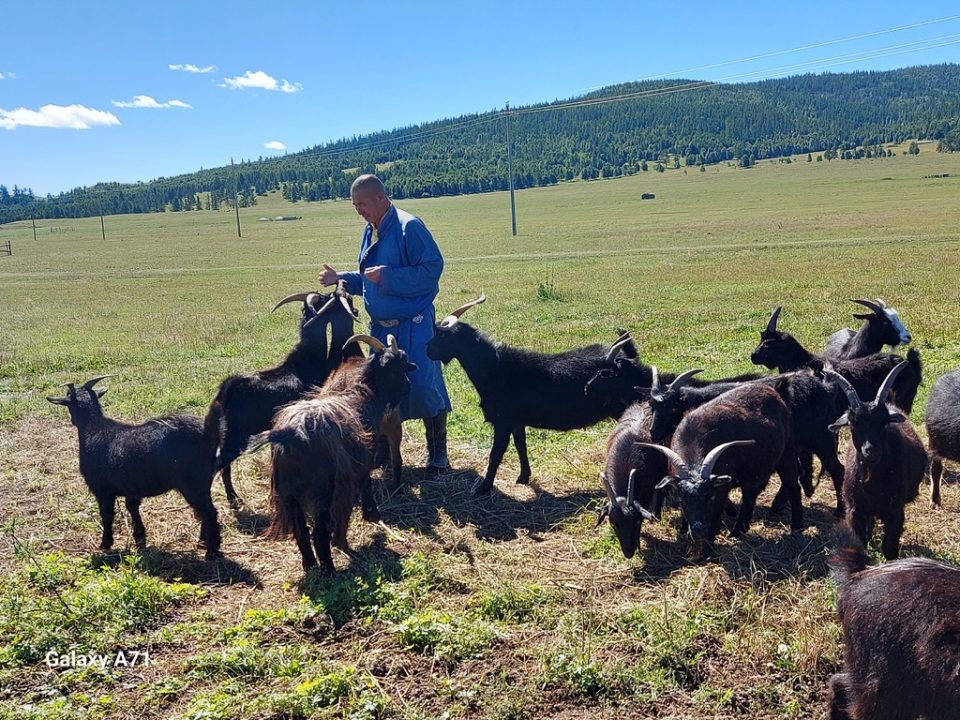
Herder Jigmed with liberated goats, Animal Liberation Project, FPMT Mongolia.
The Animal Liberation Fund continues to fulfill the holy wishes of Kyabje Lama Zopa Rinpoche by supporting the liberation and care of animals through extensive prayers, dedications, and compassionate action. These efforts benefit not only the animals but also those to whom the prayers are dedicated – including our sponsors, the sick, and those facing untimely death.
The fund enables weekly liberations and extensive dedications at Buddha Amitabha Pure Land in Washington State, USA. We are delighted to share that the Animal Liberation Fund provided US$13,139 in grants in 2025. Please read below to learn about the different grants offered and some of the ways that we are benefiting animals in the organization.
Animal Liberation Sanctuary in Nepal | Washington State, USA | FPMT Mongolia | Nalanda Monastery, France | Thank you!
Kopan Animal Liberation Sanctuary in Nepal
We were overjoyed to share the uplifting news that three young buffalo – Losang (Wise), Ngawang (Lord of Speech), and Jampal (Gentle Glory) were rescued from imminent slaughter in Kathmandu, in celebration of His Holiness the Dalai Lama’s ninetieth birthday and in sincere prayers for His enduring health and happiness.
These precious animals now enjoy a peaceful sanctuary near Kopan Monastery, where they are enfolded in daily care and kindness. Here, they rest in warm shelters, graze on nourishing food, and are gently soothed by the constant resonance of mantras and sutra recitations.
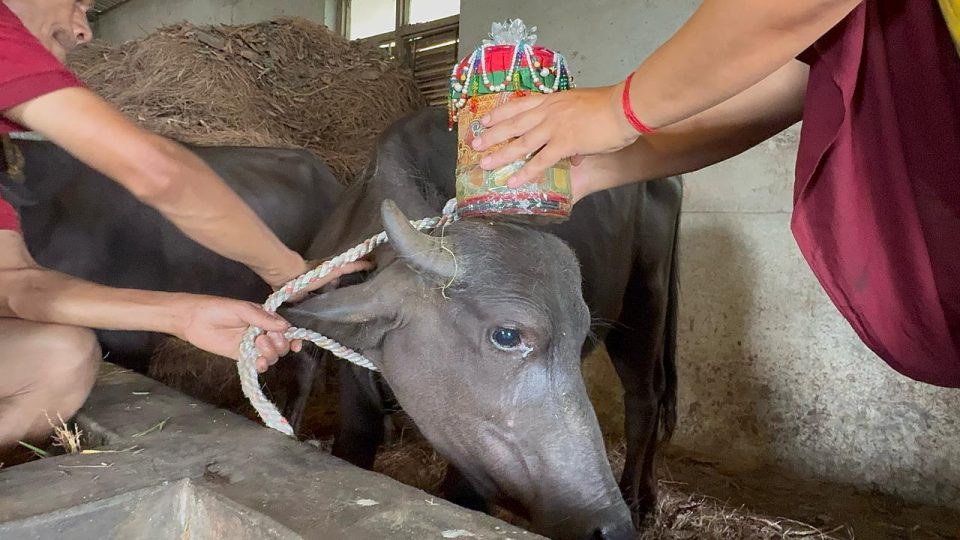
One of the buffaloes at the Kopan Animal Liberation Sanctuary receives a blessing of millions of different mantras placed on his head.
At the request of Ven. Roger Kunsang, H.E. Ling Rinpoche bestowed upon them the names Losang, Ngawang, and Jampal – each a reflection of the profound qualities we aspire to cultivate. His Holiness the Dalai Lama reminds us that universal responsibility extends beyond our own lives to embrace all sentient beings and the environment that sustains them. In honoring this responsibility, we nurture compassion for every creature.
The Animal Liberation Sanctuary currently houses: 61 goats, 5 cows, 1 buffalo (named Bodhichitta), several dogs, and 3 ducks. Bodhichitta was personally blessed by Lama Zopa Rinpoche in 2021. The animals receive food, shelter, and daily blessings, including mantra recitations, and circumambulation around stupas. They are blessed by microfilm mantras printed billions of times, as instructed by Lama Zopa Rinpoche, to create the causes for enlightenment
In 2025, the Animal Liberation Fund offered a granted in support of the sanctuary’s ongoing care.
We also have a large future grant prepared for the development of a new animal sanctuary, including infrastructure and construction of eight stupas.
Thanks to the perfect example and guidance of Lama Zopa Rinpoche, these three buffalos – and all the residents of the Animal Liberation Sanctuary – are now enveloped in love, safety, and spiritual care. Their liberation was made in the name of the entire FPMT family, a collective act of devotion and loving kindness.
Animal Liberation Practices in Washington State, USA
At Buddha Amitabha Pure Land in Washington State, USA, Sangha members continue to dedicate themselves to animal liberation practices with deep compassion and care. Over the past year alone, 41,238 animals – mostly crickets – were liberated, supported by the Animal Liberation Fund. With every animal liberation extensive prayers are made for those who have requested or who support the Fund.
Following the precious advice of Lama Zopa Rinpoche, the monks create as many opportunities as possible for animals to encounter the Dharma and accumulate merit. Ant nests in the area are offered charity in the form of tsampa, sugar, butter, and crushed mani pills, while lakes are blessed with mantras and recordings, and special fish food. Bird feeders are filled not only with seeds and water but also with blessings – sunflower seeds are consecrated with mantras, the water is infused with the mantras and crushed mani pills, and continuous Dharma audio plays in the background so that even the simple act of eating becomes an occasion for purification and awakening.
Venerables Tarchin and Tenzin, the monks in residence, recently shared inspiring glimpses of these activities. Videos show birds gathering under a Namgyalma mantra roof to eat blessed seeds and drink consecrated water, crickets being liberated during the summer months with microfilms of powerful mantras placed on top of their containers, and ants receiving blessed offerings. Each of these practices – whether blessing, feeding, or liberating – creates the conditions for animals to meet the path to enlightenment and to be freed from suffering.
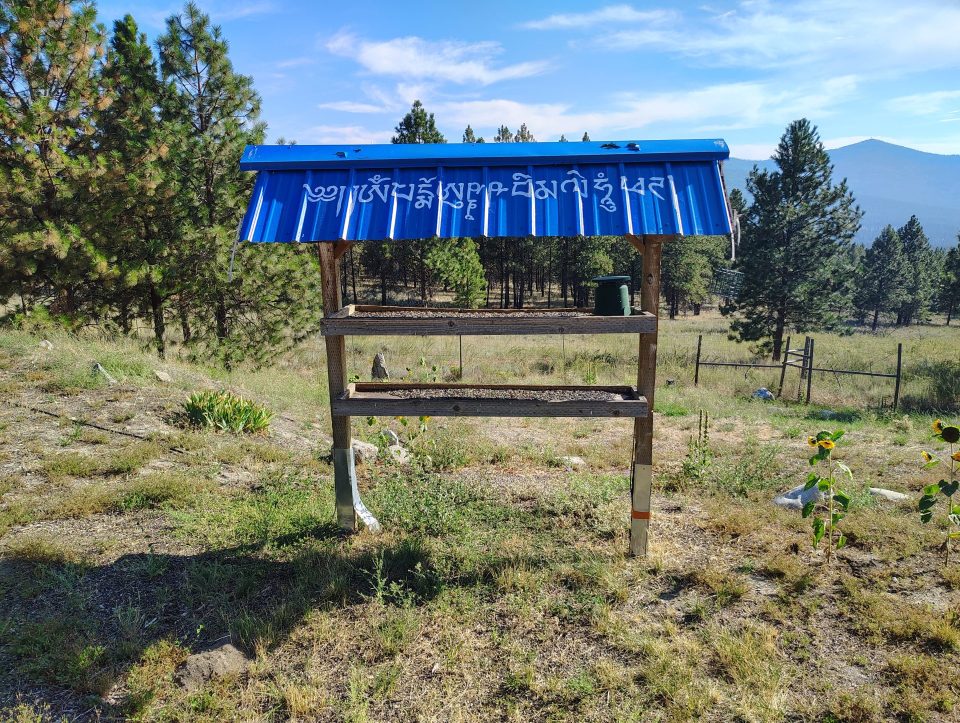
Bird feeder at Buddha Amitabha Pure Land in Washington State, USA.
Through such dedicated efforts, Buddha Amitabha Pure Land embodies Rinpoche’s vision of caring for every living being, ensuring that no act of compassion is too small to bring benefit.
Animal Liberation Project in FPMT Mongolia
Since 2019, FPMT Mongolia has been deeply committed to one of Lama Zopa Rinpoche’s most cherished activities – liberating animals from suffering and premature death, while offering them the opportunity to receive positive Dharma imprints. This unique project, now in its seventh year, has grown into a vibrant and compassionate initiative that continues to inspire communities across Mongolia.
Currently, the liberated herd includes 96 animals (mainly goats), lovingly cared for by a dedicated local herder Jigmed (pictured at top of page). These animals roam freely across the vast landscapes of Bulgan Aimag, marked for identification and protected throughout the harsh Mongolian winters with supplemental food and shelter.
In 2024, several new animals were added to the herd and received blessings from Geshe Thubten Soepa and other geshes during H.E. Jhado Rinpoche’s visit. These additions have expanded the animal family and deepened the responsibility to care for them until their natural passing.
Unlike traditional animal liberation practices where animals are released and never seen again, FPMT Mongolia’s approach emphasizes ongoing care, spiritual blessings, and community engagement. Each year, staff and nuns travel to visit the herd, meet with the herder, and perform prayers and rituals, ensuring the animals continue to receive Dharma imprints.
In 2025 the Animal Liberation Fund offered a grant to support:
- Herder salary and community gifts
- Annual team visits for blessings
- Supplemental food and winter care
- Veterinary and medical supplies
This compassionate work is gaining recognition among local herders, many of whom now believe that having liberated animals in their herds brings protection and better health to all. This unique liberation model ensures long-term care and Dharma exposure, fulfilling Rinpoche’s vision in a culturally resonant way.
Nalanda’s Animal Welfare Initiative
In 2025, the Animal Liberation Fund contributed a grant to support the meaningful work of Nalanda Monastery’s Animal Care Project, a unique initiative dedicated to the welfare of animals living in and around the monastery.
The grant covers essential care and expansion efforts, including:
- Veterinary treatment for stray and injured cats, including infections, cancers, dental issues, and parasite control
- Nutritious food for resident cats
- Onsite nursing, rehoming, and wild release, including support for local monastics caring for animals
- The BeeKind Project, which provides winter feeding, hive maintenance, and colony support for bees
- New wildlife support structures, including 40 songbird nesting boxes and 6 pipistrelle bat roosts built in Nalanda’s workshop.
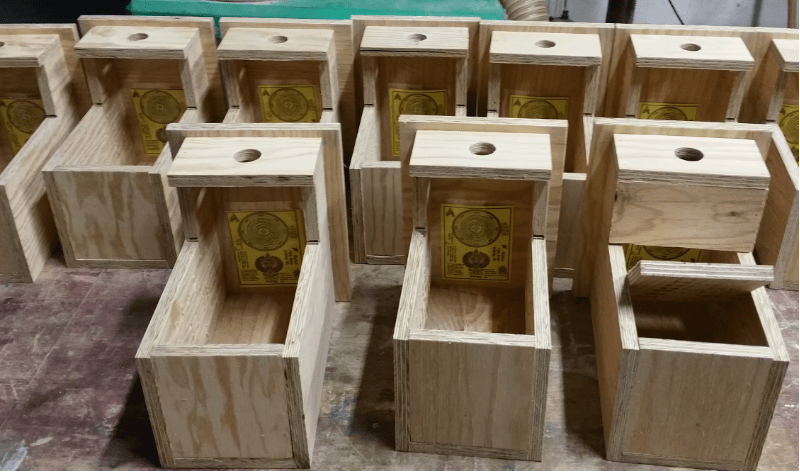
Songbird nesting boxes with mantras at Nalanda’s workshop.
This project demonstrates how Dharma practice can extend into ecological and community care. The support from FPMT ensures that Nalanda can continue offering refuge and healing – not just to humans, but to the animals who share their beautiful space.
With Deepest Gratitude
To our compassionate sponsors: your generosity is the lifeblood of these auspicious activities. Through your support, countless beings are saved, blessed, and guided toward enlightenment. May all the merit generated be dedicated to the enlightenment of all sentient beings!
All are welcome to contribute to the Animal Liberation Fund to help ensure that our work sponsoring animal rescue, care, and liberation continues.
- Tagged: animal care project, animal liberation, animal liberation fund, animal liberation sanctuary, buddha amitabha pure land, fpmt mongolia, nalanda monastery
8
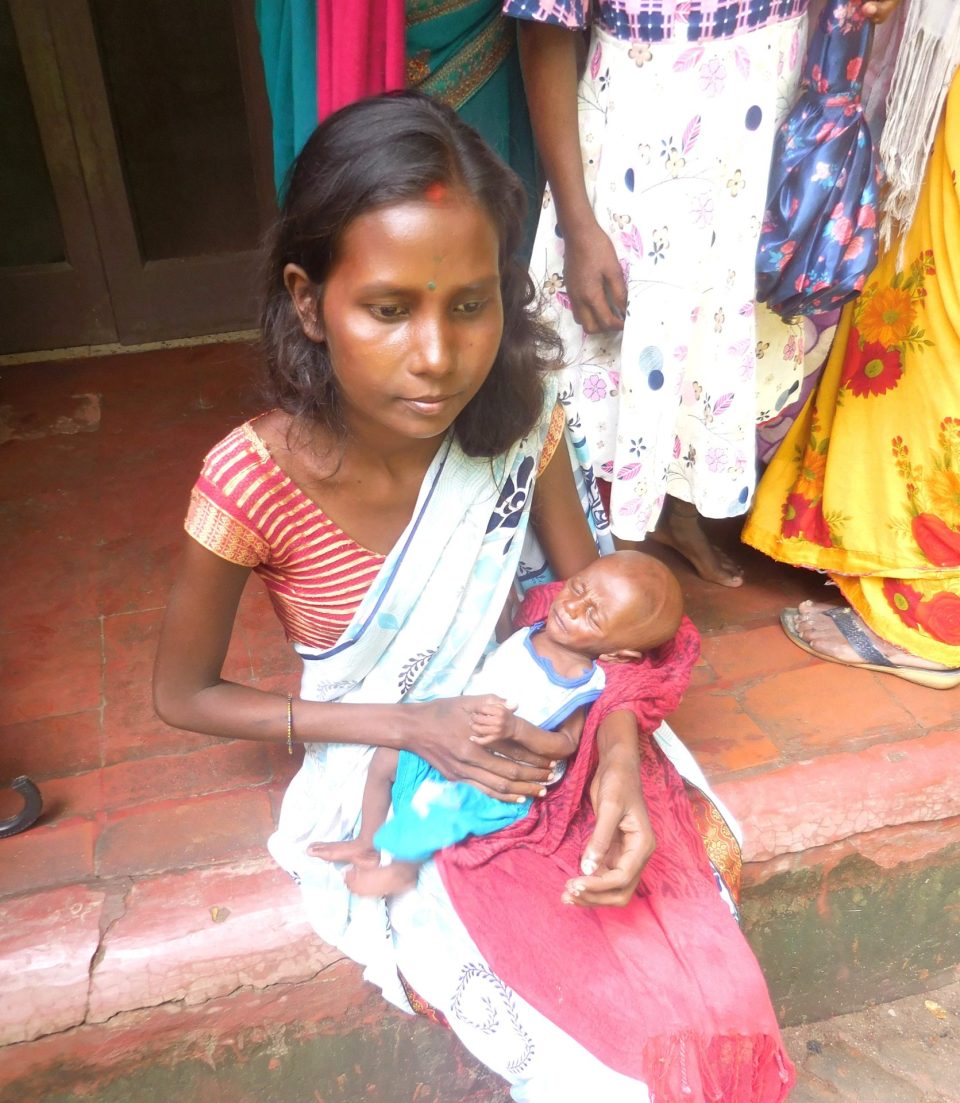
Young mother with child receiving care from the Maitri mobile clinic.
In 2025, the FPMT Social Services Fund (SSF) remained dedicated to its mission of uplifting the most vulnerable populations in India and Mongolia. With a strong focus on supporting children, the elderly, the sick, and the extremely poor, the fund allocated over US$179,706 to essential healthcare and service initiatives. These grants facilitated the operation of health camps, mobile clinics, soup kitchens, and outreach programs, providing life-saving care and support to thousands. In total, these efforts impacted an estimated 44,000 individuals offering not just medical aid but also dignity, hope, and a pathway to well-being. We hope you will enjoy learning about the different health care and essential services we are currently supporting, and how the grants were utilized this year.
Shakyamuni Buddha Community Health Care Centre | Maitri Charitable Trust | Lamp of the Path | Patient Care Trust | Tibetan Heart Foundation | Integrated Indigenous Tribal Children’s Ministry of India | Thame Support Fund | Thank you!
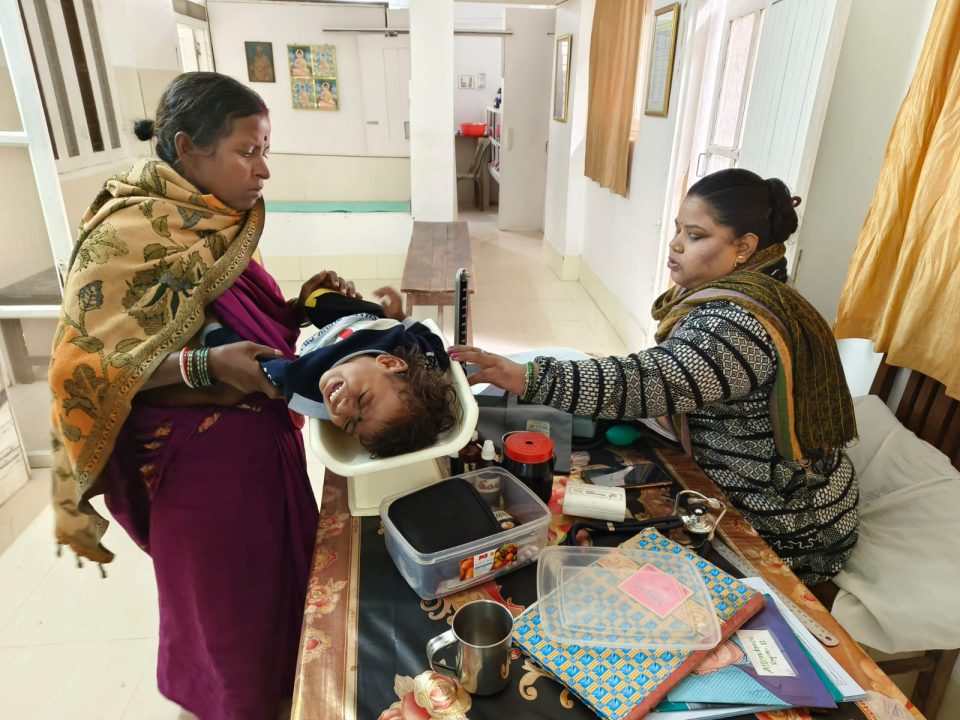
A young patient receiving care from Shakyamuni Clinic.
The Shakyamuni Buddha Community Health Care Centre, located in a remote Bihar region of India, continues to be a vital source of medical care for underserved and isolated communities.
The clinic has made remarkable progress in improving healthcare access and outcomes. The mobile clinic program, which previously operated twice a month, now runs five days a week, reaching five villages – including one newly added this year. This expansion enabled the clinic to serve 10,303 patients through mobile outreach and an additional 23,543 patients at the main clinic, totaling 33,846 individuals reached with free consultations, screenings, and treatments.
The clinic also conducted community health education workshops on hygiene, nutrition, mental health, and disease prevention, reaching approximately 3,000 people. Special attention was given to women’s health, with a female doctor leading sessions on personal hygiene and reproductive health.
Despite these successes, the clinic faced challenges such as poor road conditions, limited medical supplies, and the need for greater infrastructure. Looking ahead, the team aims to open a 4-bed inpatient care facility, acquire an ambulance, and expand preventive health campaigns focused on malaria, clean water, and hygiene.
In 2025, the clinic has received a grant from the Social Services Fund, that covered roughly 75% of their annual budget, helping to sustain and expand its essential services.
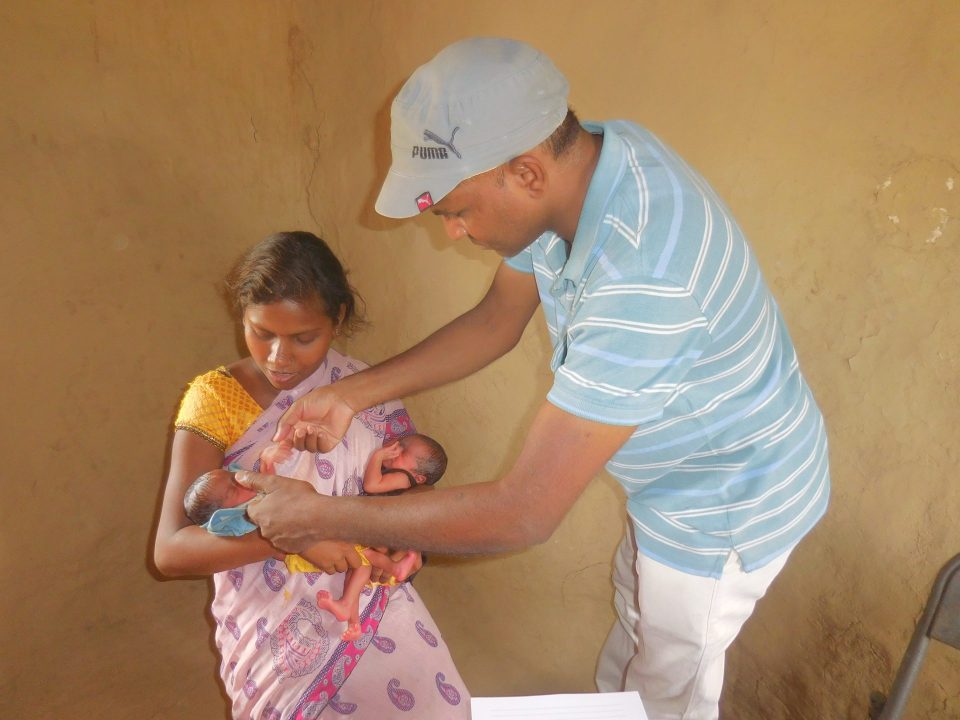
Maitri’s doctor checks on twins in the mobile clinic.
The Maitri Charitable Trust, based in Bodhgaya, India, continues to provide essential health services to vulnerable populations through its Mother and Child Care and Tuberculosis (TB) Care programs.
In 2024, Maitri’s TB Care program identified and registered 475 new TB cases, collected 76 follow-up sputum samples, and provided monthly rations to 302 under-treatment patients. The team conducted awareness campaigns across 1,346 villages, organized educational events for students, and celebrated World TB Day with community outreach and educational material distribution. At the Maitri’s headquarters, 139 individuals were tested for TB, 44 confirmed cases were referred for treatment, and 11 patients were hospitalized.
The Mother and Child Care program registered 335 new mothers, delivered 215 healthy babies including twins, and administered 19 tetanus vaccinations. The program also ensured 27 tubectomies for third pregnancies. For children aged 0-5, 488 new patients were managed, with 265 released from treatment, and 223 children received monthly check-ups and supplements. Among girls aged 6-14, 195 new cases were registered, with 101 released from treatment.
Additional support included the distribution of 144 monthly rations of legume seeds, 461 packets of sanitary pads, and 159 rations of milk powder and infant cereal. The grant also funded critical repairs to Maitri’s facilities and contributed to a Fixed Term Deposit for future sustainability.
In 2025, the grant offered from the Social Services Fund supported Maitri’s ongoing efforts in both field outreach and clinic-based care, covering the entire budget of the Mother and Child and TB programs.
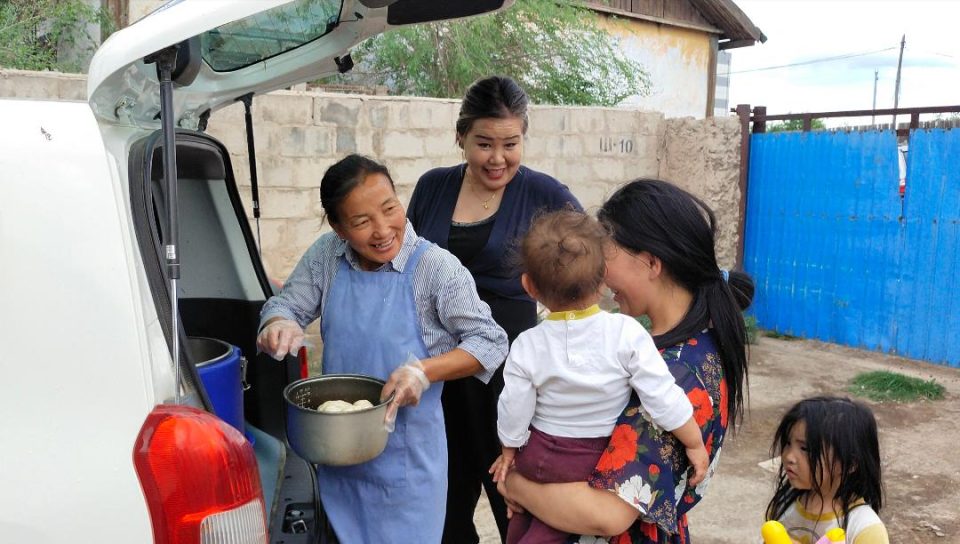
Lamp of the Path’s mobile food delivery program.
The Lamp of the Path (LOP), FPMT Mongolia’s flagship community service project, continues to serve as a vital support system for vulnerable populations in the Amgalan ger district of Ulaanbaatar.
In 2024, LOP provided over 7,245 hot meals through its daily Soup Kitchen, and delivered 6,084 meals to 21 individuals across 7 families who were unable to visit the center due to age, disability, or distance. The kitchen’s renovation this year has enhanced its capacity and improved service quality, much to the satisfaction of both staff and beneficiaries.
LOP also distributed second-hand clothing to over 400 individuals, including children in women’s prisons and homeless men through partner NGOs. The team emphasized dignity in service by allowing beneficiaries to choose their clothing when possible.
Medical outreach remained a core focus, with multiple health check-ups conducted in collaboration with local hospitals, international volunteers, and medical students. Services included wound care, blood pressure monitoring, and tuberculosis screening. LOP also provided alcohol abuse counseling and hosted 16 AA outreach sessions to support recovery and community reintegration.
The Mahayana Children’s Program (MCP) continued to operate, offering weekly life-skills and creative classes to children aged 6-14. The program also hosted seasonal celebrations and distributed school supplies and clothing to children from disadvantaged families.
LOP’s vegetable garden and greenhouses yielded 1,000 kg of produce, which was used in the soup kitchen, preserved for winter, and sold to generate income. The garden also supported the annual 100 Million Mani Retreat at Idgaa Monastery.
In 2025, the grant offered from the Social Services fund covered the entire annual budget of all of LOP’s wide-reaching programs.
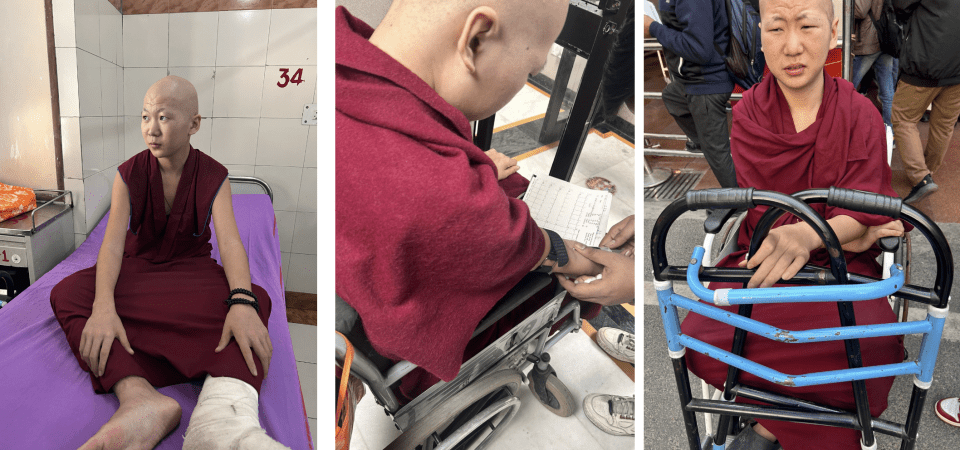
Patient Care Trust 16-year-old monk diagnosed with osteosarcoma undergoing treatment
Patient Care Trust (PCT), a Delhi-based NGO serving the Tibetan refugee community, is committed to delivering accessible, affordable, and high-quality healthcare to vulnerable populations across India. Since 2012, the organization focuses on supporting monks, nuns, the elderly, and destitute individuals through a combination of direct medical aid, housing support, and large-scale outreach programs.
In 2024 alone, PCT assisted 3,499 patients, including 3,273 through its free medical camps in Dharamsala and South India (Bylakuppe). These camps, staffed by top specialists from AIIMS Delhi and other institutions, provided general and specialist consultations, diagnostic tests, cancer screenings, and free medications. One such camp in Bylakuppe served 2,800 patients in just four days, with the oldest patient being 100 years old. The camp offered services across 20 departments and screened 81 women for cervical cancer, 12 of whom tested positive and were guided into further treatment.
Beyond camps, PCT’s impact is deeply personal. The organization provided housing, food, translation, and financial aid to patients undergoing long-term treatment in Delhi. The 2024 patient casebook tells stories of resilience and recovery – from a 6-year-old girl battling a brain tumor to elderly patients receiving life-saving surgeries, and monks and laypeople overcoming cancer, kidney disease, and neurotrauma with PCT’s unwavering support.
In 2025, the grant offered covered half of the annual budget of the life-saving work of Patient Care Trust.
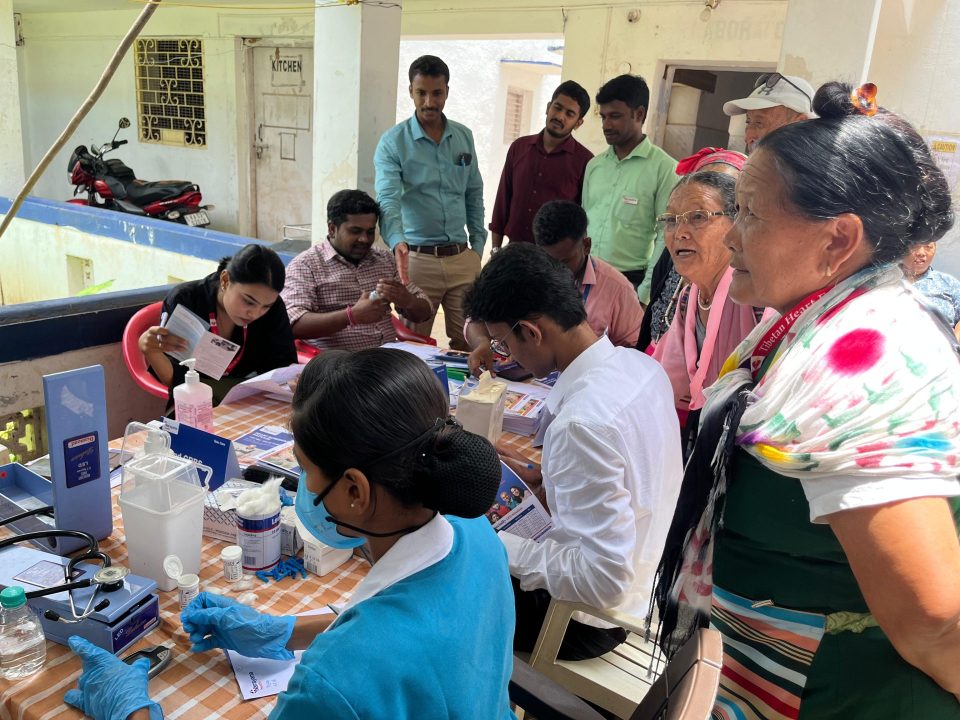
Tibetan Heart Foundation’s free medical camp.
Tibetan Heart Foundation (THF), based in New Delhi, India, is an NGO dedicated to supporting the underserved Tibetan settlements across both northern and southern India.
The foundation’s core mission is to raise awareness about heart-related health issues and provide access to life-saving cardiac care. Through its free medical camps and patient support services, THF ensures that vulnerable individuals receive timely diagnosis, treatment, and follow-up care. The foundation also plays a vital role in guiding patients to top-tier hospitals, offering translation and logistical support, and easing the burden of medical journeys for those facing language and financial barriers.
In 2025, THF is organizing free medical health camps in key Tibetan settlements including Bylakuppe, Kollegal, Hunsur, Mundgod, and Mainpat in the south, and Ladakh, Manali, Dehradun, Odisha, and Bandra in the north. These camps will offer a wide range of services such as cardiovascular screenings (including BP monitoring and ECGs), eye and dental check-ups, gynecological and prenatal care, diabetes and ENT screenings, orthopedic and oncology consultations, and general health check-ups. Essential medicines and preventive healthcare kits will also be distributed free of cost.
The Social Services Fund offered a grant in 2025 to support their mission.
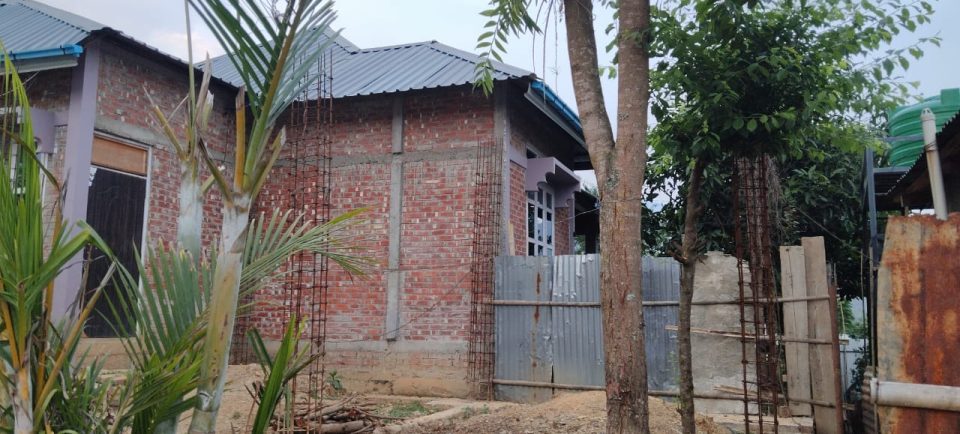
Nearly finished construction of the orphanage in Manipur.
Integrated Indigenous Tribal Children’s Ministry of India (IITCMI) is an NGO based in Manipur, India, dedicated to supporting orphaned and homeless children from indigenous and tribal communities. The organization’s mission is to provide a safe, nurturing environment where children can access shelter, education, healthcare, and emotional support.
One of IITCMI’s most impactful initiatives is the construction of a permanent orphanage facility, which began in 2019. This project has been made possible through the major contribution from Lama Zopa Rinpoche via the Social Services Fund.
In 2025, the project received an additional grant to support the final phase of construction.
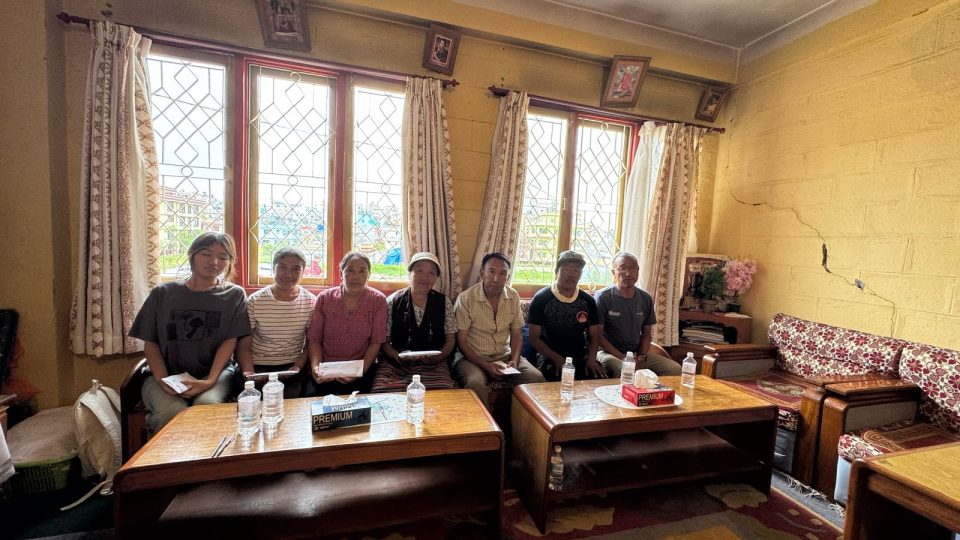
Seven families received essential aid after their houses were destroyed by the Thame floods.
On August 16, 2024, Thame, which is the birthplace of our kind guru Kyabje Lama Zopa Rinpoche and is situated at an altitude of 12,450 feet (3,800 meters) and has a population of 300 Sherpas, suffered immense devastation. The flood destroyed half the village, including houses, hotels, the school and health clinic plus essential infrastructure. Through the Thame Support Fund we were able to quickly raise funds and offer direct support to 55 families from Thame, who were profoundly affected by the catastrophic floods.
On June 16, 2025, through the Social Services Fund we were able to offer US$7156 to seven families who had lost everything in the floods. Many of the families from Thame are still in Kathmandu, so the disbursement was carried out at Khachoe Ghakyil Nunnery.
Thank you!
Thank you to everyone who contributed during this most desperate time to support the families of Thame, especially Yeshe Norbu Association, that has offered an incredible amount of support over the years to important projects benefiting Tibetan refugees.
Please join us in rejoicing in the many ways the FPMT Social Services Fund is offering direct support to those most in need in India, Nepal and Mongolia. To all our generous sponsors and supporters – thank you! Your compassion and commitment have made this impact possible. Every contribution has helped bring healing and hope to the most vulnerable among us.
If you would like to be part of this meaningful work, please consider supporting the FPMT Social Services Fund. Together, we can continue to extend our reach and uplift even more lives in the years to come.
The Social Services Fund, established to support Lama Zopa Rinpoche’s Vast Visions for the FPMT organization, focuses efforts primarily in India, Nepal, Tibet and Mongolia. Funds help children, the elderly, sick, and very poor.
- Tagged: integrated indigenous tribal children ministry of india, lamp of the path, maitri charitable trust, patient care trust, shakyamuni buddha health care center, thame, thame support fund, tibetan heart foundation
5
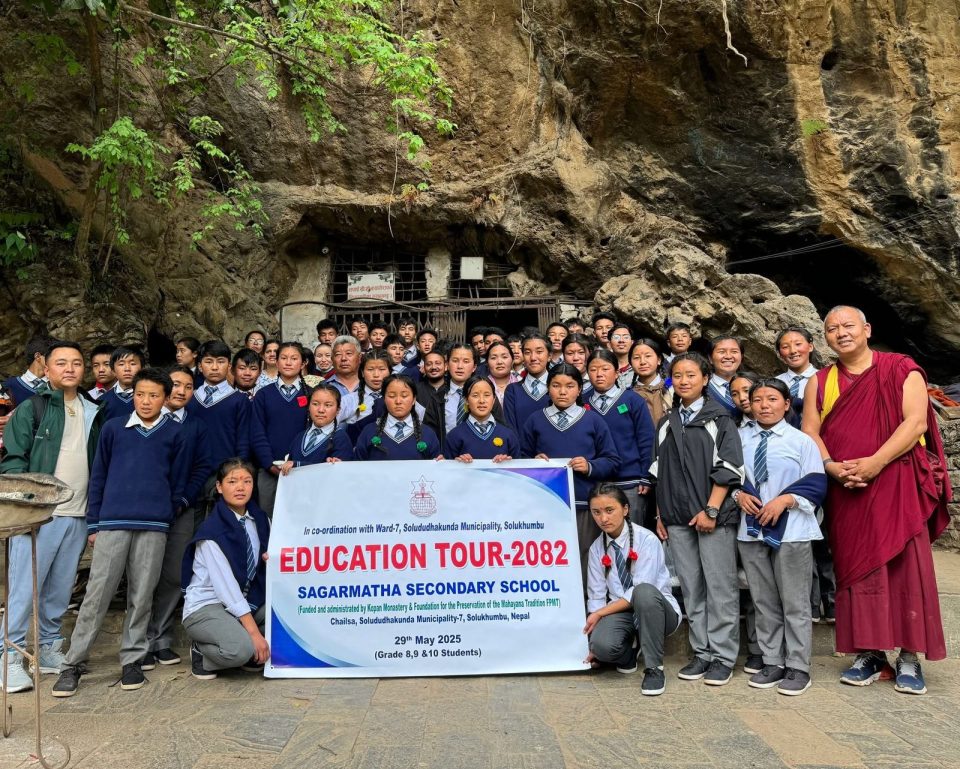
Sagarmatha School children on an educational tour to Maratika Cave, May 2025.
In the remote valleys and small local communities of India and Nepal, education is more than a classroom experience – it is a lifeline to opportunity, cultural preservation, and spiritual growth. FPMT’s Social Services Fund (SSF) continues to play an important role in this journey, offering consistent support to schools that serve children and young monks from Tibetan, Nepali, Sherpa, and Indian backgrounds. By the end of 2025, the SSF will have disbursed a total of US$226,563 across eight schools, reaching over 1,400 students. These grants helped cover essential needs such as nutritious meals, teacher salaries, classroom materials, and cultural activities. Through this support, the SSF not only strengthens access to quality education but also nurtures the values of compassion, wisdom, gratitude, and resilience in the next generation. Please learn below about the schools we are currently supporting, and how the grants were utilized this year.
Sagarmatha Secondary School | Sambhota Tibetan School CVP | Ngari Institute of Buddhist Dialectics | Maitreya School | Rolwaling Sangag Choling Monastery School | Shree Sangka Dechholing Gonpa School | Gaden Jangtse Monastic College |
Tashol Tengyur School | How to Help
Sagarmatha Secondary School, situated in Chailsa, Solukhumbu, Nepal, remains a shining example of holistic education for children from remote Himalayan communities. The school provides free education, uniforms, books, hostel accommodations, and nutritious meals to all students. The Social Services Fund has been supporting the school since 2015. In 2025, a grant was offered to sustain its educational and welfare programs. Currently, the school serves 275 students and is supported by 16 teachers and 2 staff members.
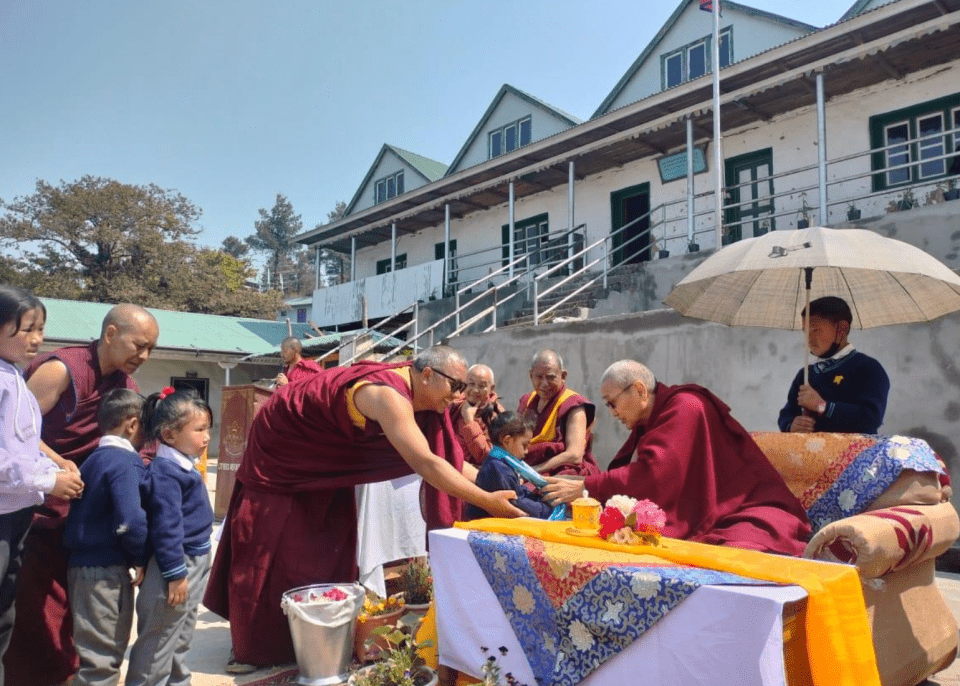
Sagarmatha School children receive blessings from Khenrinpoche Geshe Thubten Chonyi,
the Abbot of Kopan Monastery.
On April 23, 2024, the school hosted guests from Kopan Monastery and Singapore, including Khenrinpoche Geshe Thubten Chonyi, who offered blessings and shared profound insights on the importance of ethical education. Uniforms and books were distributed to students, continuing the tradition of removing financial barriers to learning.
Among other highlights was an educational tour to Maratika Cave (the place where Guru Padmasambhava achieved immortality through meditation and blessings from Amitayus). This pilgrimage offered students a chance to deepen their spiritual understanding and personal growth. A short prayer session was held during the visit, where students expressed heartfelt wishes for the swift return of Lama Zopa Rinpoche.
On July 6, 2025, the school joyfully celebrated the 90th birthday of His Holiness the Dalai Lama. The day began with a traditional Sang-Sol incense offering puja (purification puja), followed by a formal ceremony in the prayer hall. The event brought together geshes, students, teachers, and members of the Chailsa Tibetan settlement. Students showcased their cultural heritage through vibrant performances, reinforcing the school’s commitment to preserving Tibetan identity and values.
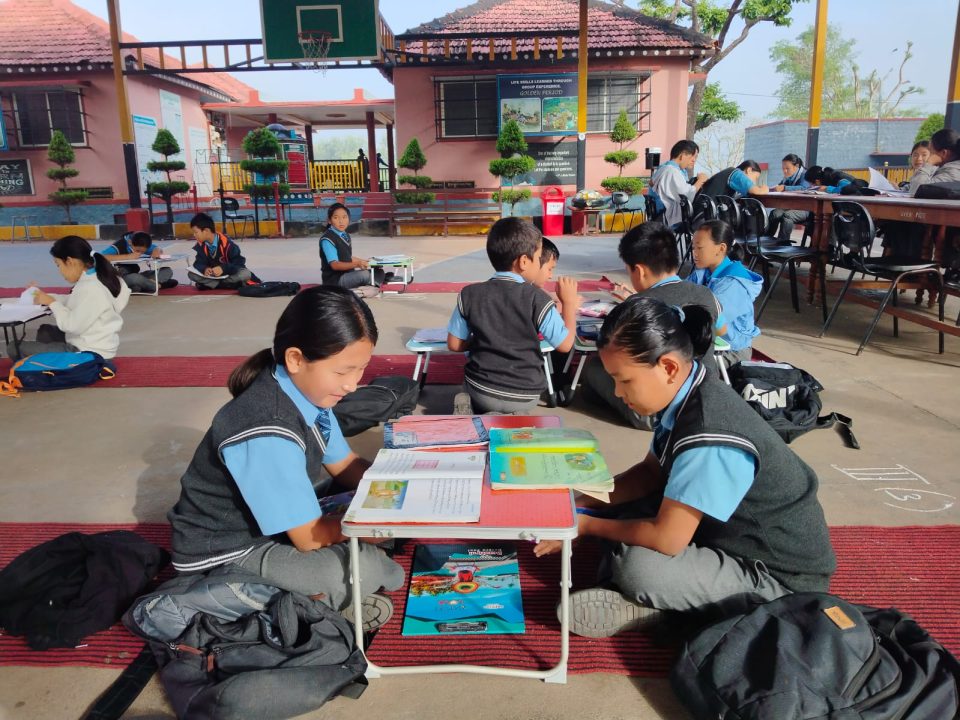
Children at Sambhota School studying together.
The Sambhota Tibetan School CVP Bylakuppe, located in the Tibetan Dickey Larsoe Settlement in Karnataka. Established in 1971, the school currently educates 132 students from classes 1 to 10. Tibetan is the medium of instruction at the primary level, transitioning to English from class six onward. The school is supported by a committed team of 25 teaching and non-teaching staff.
Since 2015, the Social Services Fund has been supporting the school’s vegetarian midday meal program. This initiative has significantly contributed to students’ health, concentration, and academic engagement. In 2025, the SSF again offered a grant to continue this essential program, ensuring that students receive the nourishment they need to thrive academically and personally.
In a letter dated January 2025, Settlement Officer Chime Dorjee expressed deep gratitude for the continued support of the midday meal program, emphasizing its role in enhancing student well-being and learning outcomes.
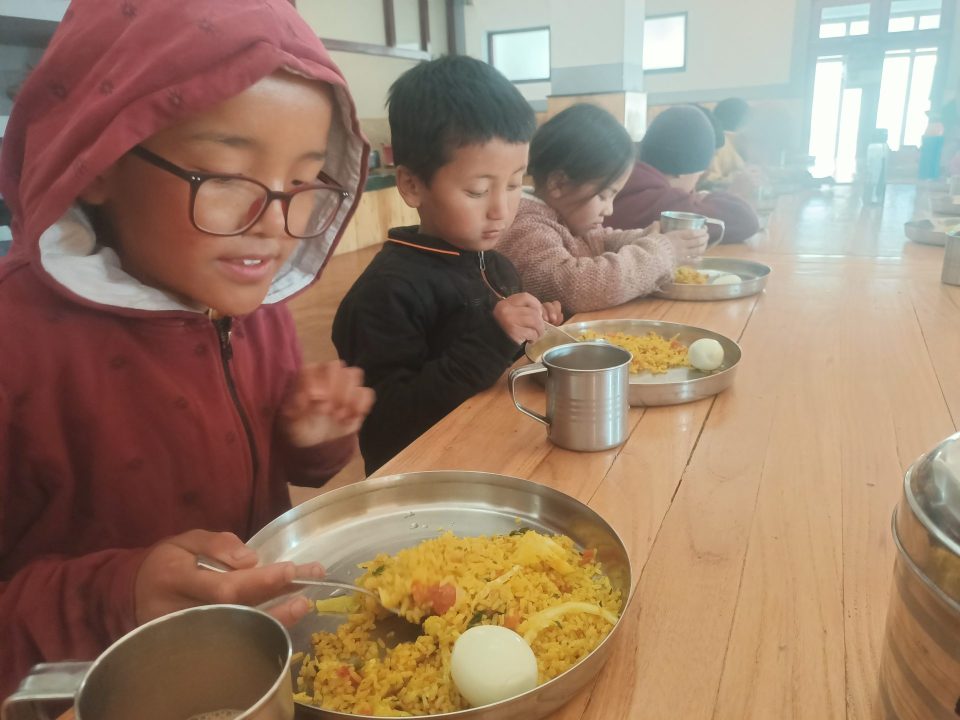
Ngari Institute’s children enjoying a meal.
The Ngari Institute of Buddhist Dialectics, located in Saboo-Do Village, Ladakh, was founded in 2010 under the leadership of Geshe Tsewang Dorje, a Lharampa Geshe graduate from Sera Je Monastery. The institute was established with the vision of preserving the Tibetan Buddhist Nalanda tradition, Tibetan culture, and the unique way of life of the Himalayan people – especially at a time when such traditions face immense challenges inside Tibet.
The institute offers a unique blend of modern education and traditional monastic training, including debate classes, which are rare in Ladakh. Students receive regular schooling during the day and attend additional tuition and monastic classes in the mornings and evenings. This dual approach ensures both academic and spiritual development.
As of 2025, the institute supports 73 students and 22 dedicated staff members, with a long-term goal to serve 200 children. The institute has seen remarkable progress. Students have consistently performed well in government board exams, and alumni have gone on to pursue higher education at institutions like the Dalai Lama Institute for Higher Education. Infrastructure projects are underway, including a Buddha Relics Temple, Girls Hostel Extension, retreat rooms, and an ambitious tree plantation project to green the dry Ladakhi landscape.
Since 2013, the Social Services Fund has been a steadfast supporter of the institute, particularly in funding the daily meal program. This program has been vital in ensuring the health and well-being of both students and staff. For the year 2025, a grant was given to cover the full cost of meals for all students and teachers.
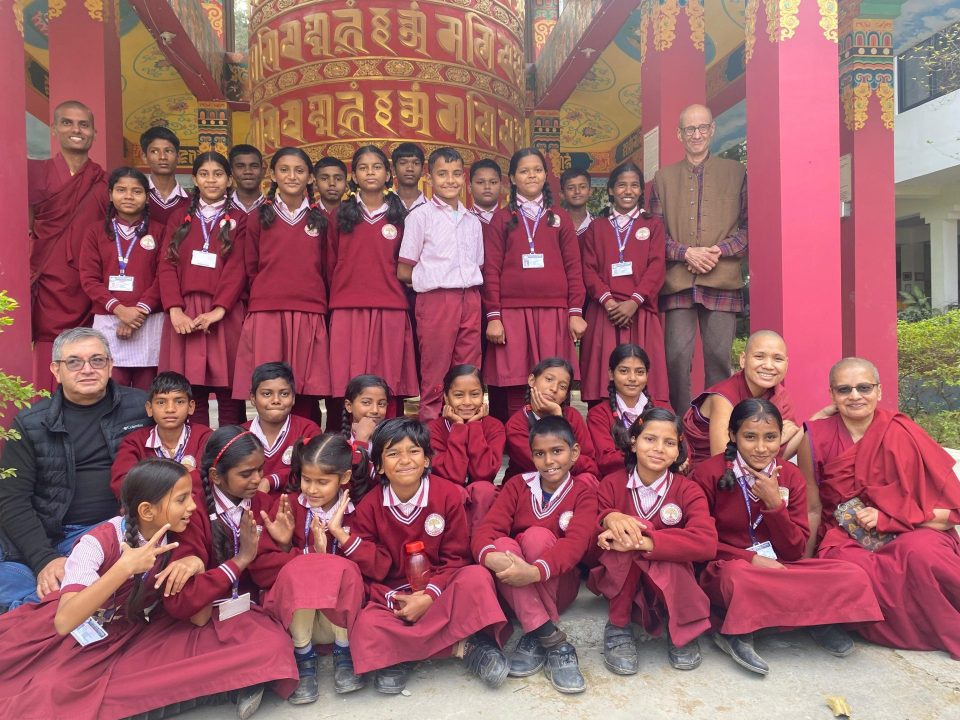
Maitreya School children visiting the Root Institute for Wisdom Culture.
The Maitreya School in Bodhgaya, Bihar, India, continues to serve as an educational sanctuary for children from some of the most underserved communities in the region. Rooted in the compassionate vision of Lama Zopa Rinpoche, the school’s mission transcends conventional academics. It aims to nurture children who are not only intellectually capable but also spiritually grounded and socially responsible.
In 2024–25, the school organized a wide range of enriching activities, including:
- Creative writing, quiz, and speech competitions in Hindi and English, with over 300 participants.
- A pilgrimage to Rajgir, Nalanda, and Pawapuri, where students recited the Heart Sutra alongside international pilgrims.
- A visit to Root Institute for Wisdom Culture, where Class 5 students had an opportunity to explore Buddhist teachings and practice meditation.
The school has also begun meditation classes, introduced group discussions based on the 16 Guidelines for Life (practical methods to incorporate wisdom and compassion into every facet of our daily lives), and is actively transforming its infrastructure. Six new rooms are being renovated for music, dance, drama, yoga, and arts, and plans are underway to develop the rooftop and garden into creative and permaculture-based learning spaces. The library, revitalized by dedicated volunteers, has become a hub of literacy and imagination, where students are learning to read, write, and care for books.
Despite its many successes, the school faced significant challenges. Bihar remains one of India’s most economically disadvantaged states, where poverty, malnutrition, and limited access to quality education are widespread. Many students arrived at school hungry, which severely impacts their ability to learn and thrive. To address this, the school urgently sought support to provide nutritious, protein-rich morning snacks for all students. Additionally, the school plans to offer afternoon tuition support for struggling students. This initiative will be led by three to four additional teachers or alumni, providing both academic help and a small income for former students.
In 2025, the school received a grant from the Social Services Fund that will support its ongoing efforts to provide free, value-based education to 277 children from Lower Kindergarten through Class 8.
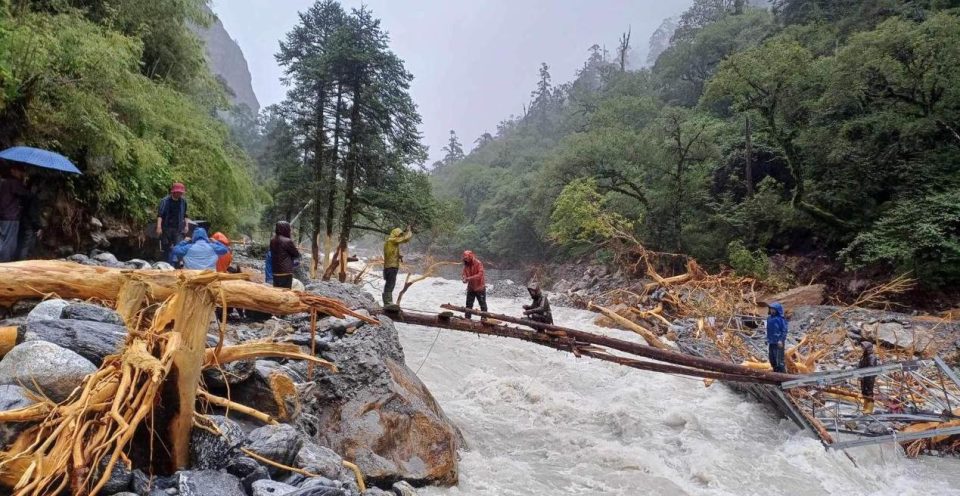
Rolwaling School: Trail repair work in progress.
The Rolwaling Sangag Choling Monastery School, nestled in the Himalayan valley of Rolwaling, Nepal, continues to provide holistic education to 36 students, rooted in Buddhist values, cultural preservation, and compassionate service.
By 2025, the school successfully completed the construction of two winter hostel buildings and a temporary kitchen-dining facility in Lamabagar, enabling year-round education despite the harsh climate. The academic year began in February with the arrival of students and staff, including the enrollment of eight new children from nearby villages. In April, the school community returned to Beding village, where classes will continue through November. Two senior students completed their primary education and traveled to Namdroling Monastery in South India for further studies. The school also organized vocational training in hospitality, bakery, and barista skills for fifteen local women, empowering them with practical livelihood skills. Throughout the year, students actively participated in traditional ceremonies, preserving the spiritual and cultural heritage of the Rolwaling valley.
Among their many impactful initiatives, two stand out:
Protection of Yaks in Rolwaling
In alignment with the vision of Kyabje Lama Zopa Rinpoche, the school continues to support the protection and care of over 108 rescued yaks. These animals were originally saved from slaughter in Solukhumbu and brought to Rolwaling by crossing the Yalung La Pass. Today, they roam freely in the valley, where the local Sherpa community strictly forbids the killing or selling of animals. The school founder, Ngawang Labsum Rinpoche, along with students, regularly visits the grazing areas and ensure their well-being. A dedicated herder has been employed to protect the yaks from mountain wolves, reinforcing the school’s commitment to animal liberation and environmental stewardship.
Trail Maintenance and Emergency Relief
On July 5, 2024, a devastating flash flood struck the Rolwaling valley, destroying over 10 kilometers (6 miles) of trail, sweeping away four bridges. In response, the school and monastery mobilized immediate relief efforts. They led the reopening of trails, provided emergency support to affected families, and constructed temporary shelters for travelers.
In 2025, the school received a grant from the Social Services Fund for the school operations and for classroom furniture and beds for the winter school in Lamabagar.
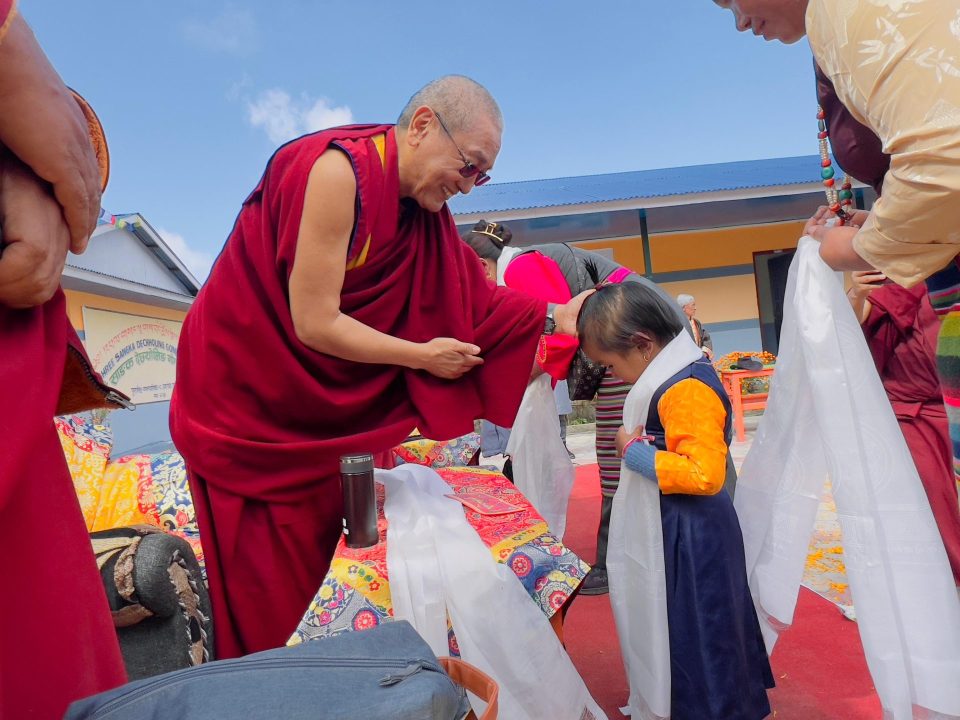
Shree Sangka Dechholing Gonpa School children receive blessings from Khenrinpoche Geshe Thubten Chonyi, the Abbot of Kopan Monastery.
The Shree Sangka Dechholing Gonpa School, situated in Taplejung, Nepal, is making significant progress in offering comprehensive education to children in the area. Established in 2007 and affiliated with the National Examination Board (NEB), the school currently serves 171 students with the support of 16 dedicated teachers.
The school’s core vision is to integrate modern academic instruction with moral and spiritual education under the guidance of Kopan Monastery. This approach aims to nurture students into not only academically capable individuals but also responsible and compassionate people.
In 2024, the school achieved praiseworthy academic results, with students excelling in Mathematics, Science, and Social Studies. Beyond academics, the school has placed strong emphasis on extracurricular development such as the inter-school football competition and cultural dance, quiz competitions, reflecting children’s diverse talents and enthusiasm.
Infrastructure-wise, the school comprises four buildings with 18 classrooms, a stupa, a prayer wheel, six washrooms, a dining and kitchen facility, and a large playground that supports inter-school sports events. These facilities create a well-rounded environment for both academic and personal growth. Additionally, the school’s commitment to its staff is evident in its structured salary system, which includes a 13-month pay scale and government-aligned compensation. This ensures stability and motivation among the teaching and administrative team.
In 2025, the grant given supported its ongoing educational mission.
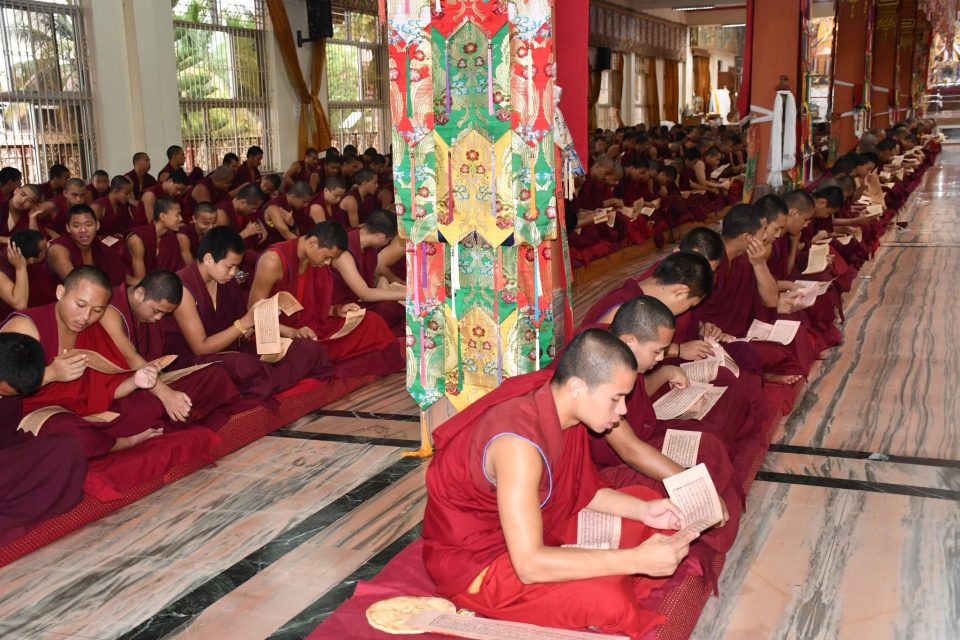
Gaden Jangtse Monastery (source: Gaden Jangtse Monastery Facebook page).
The Gaden Jangtse Monastic College, re-established in 1969 in Mundgod, South India, is a renowned institution within the Gelug lineage of Tibetan Buddhism, dedicated to the preservation and transmission of Buddhist philosophy, scripture, debate, and meditation. As part of its broader educational mission, the Gaden Jangtse School serves as a vital platform for educating young monks, ensuring they receive both traditional monastic training and formal academic education.
The school currently supports approximately 500 monk students and employs 13 salaried teachers, with additional support from senior monks who volunteer as tutors. These teachers play a crucial role in shaping the intellectual and spiritual development of the next generation of Buddhist scholars and practitioners.
In 2025, the grant provided supported the annual salaries of the school’s teachers. This funding is essential to maintain the quality and continuity of education at the school, especially as it aligns with the guidance of His Holiness the 14th Dalai Lama, who has encouraged the integration of monastic education with the Indian secondary school system. This allows monk students to receive recognized academic qualifications alongside their spiritual training.
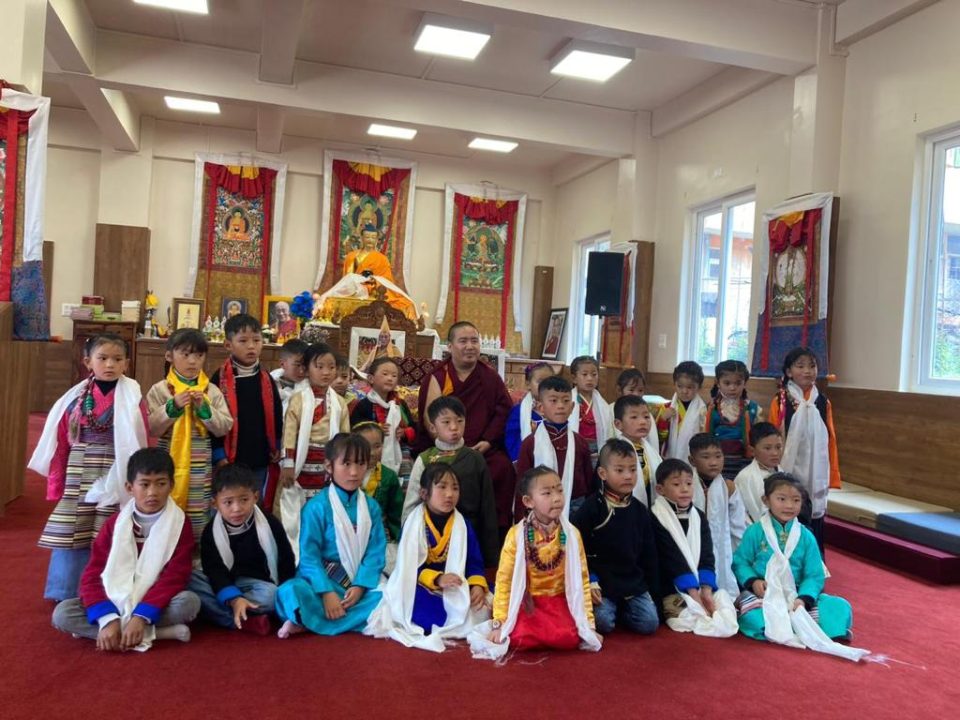
Tashol Tengyur School children with Tenzin Gyurmey Rinpoche.
The Thubten Shedrubling Foundation, a Gelug Buddhist Center founded in 2014 by Tenzin Gyurmey Rinpoche in Tawang, Arunachal Pradesh, is dedicated to preserving and promoting Tibetan Buddhism and culture through education. The Foundation’s vision aligns with the aspirations of Lama Zopa Rinpoche and Lama Yeshe to spread the Dharma and expand Universal Education Programs.
Over the years, the Foundation has offered free courses in English, computer literacy, Tibetan language, and Buddhism to both adults and children, benefiting over 600 individuals. It has also hosted workshops on secular ethics and teachings by Tibetan lamas, building a vibrant community of around 100 active members.
In 2023, the Foundation launched the Tashol Tengyur School, a Buddhist primary school that admitted 30 first-grade students and provided a well-rounded curriculum including Tibetan and English languages, mathematics, physical education, and morning prayers. Despite its success and positive feedback from parents, the school had to close due to challenges in retaining qualified teachers in the remote and climatically harsh region of Tawang.
In 2025, a grant from the SSF was given for the first time, The Foundation plans to resume its educational programs with renewed focus. The funding will support salaries and operational costs for a two-year initiative that includes:
- For children: Out-of-school and weekend classes in Tibetan language, Buddhism, and Social Emotional Ethical Learning (SEEL), each offered three times a week.
- For adults: Introductory and intermediate Buddhism classes held six times a week, Tibetan language classes three times a week, and regular pujas on holy days.
The Social Services Fund remains a source of hope and opportunity for children and monastic students in some of the most isolated and under-served areas of India and Nepal. Thank you so much to all our kind donors, as well as Yeshe Norbu Association and Unione Buddhista Italiana (U.B.I.), who make these grants possible and provide these young learners with not just an academic education but also spiritual guidance and emotional support based on Buddhist principles. This support has a profound impact, empowering future generations to become compassionate, capable, and culturally aware individuals.
All are welcome to offer toward the Social Services Fund, to support the education of those who are truly vulnerable and in need in India and Nepal.
The Social Services Fund, established to support Lama Zopa Rinpoche’s Vast Visions for the FPMT organization, focuses efforts primarily in India, Nepal, Tibet and Mongolia. Funds help children, the elderly, sick, and very poor.
- Tagged: 16 guidelines, gaden jangtse monastic college, maitreya school, ngari institute of buddhist dialectics, rolwaling sangag choling monastery school, sagarmatha secondary school, Sambhota Tibetan School CVP Bylakuppe, schools, shree sangka dhechholing gonpa school, tashol tengyur school, thubten shedrupling foundation
11
Support Offered to Nine Elder Homes in India in 2025
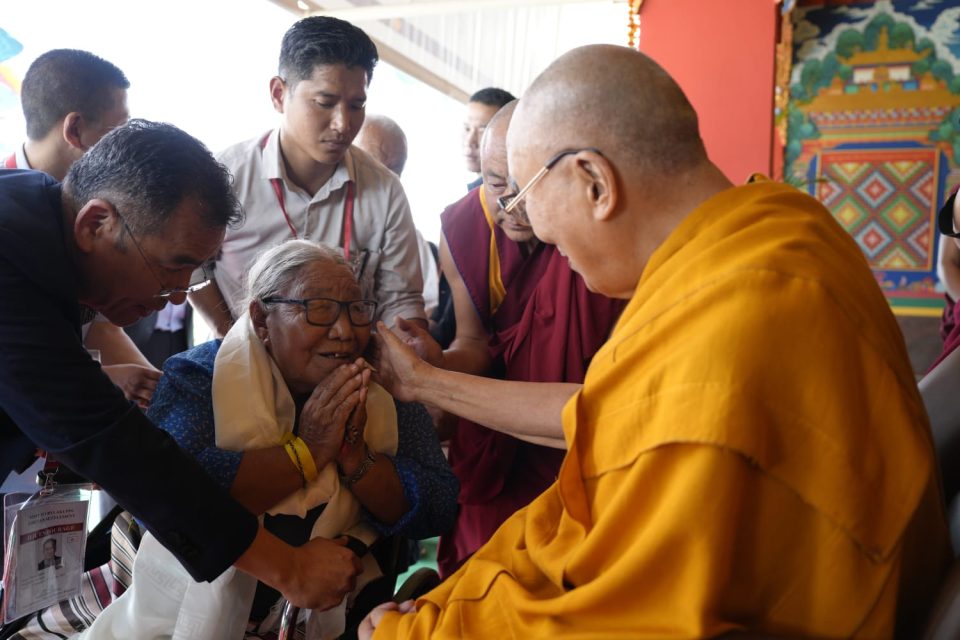
Phuntsokling OPH residents receiving blessings from the His Holiness the Dalai Lama in Dharamsala, India.
Since 2016, FPMT’s Social Services Fund has been providing essential support to Tibetan elder refugees living in homes across India and Nepal. Elderly individuals are especially vulnerable, many of these senior Tibetan citizens have no remaining family, and the help they receive through this fund ensures their most basic needs are met with dignity.
In 2025, through FPMT’s Social Services Fund, US$202,715 was granted to nine elderly homes in India. This year’s support includes not only food, accommodation, and medical care, but also upgrades to facilities and assistance to the most at risk in the settlements.
This ongoing effort continues to be inspired by the profound great compassion and wisdom of Kyabje Lama Zopa Rinpoche, whose vision was to care for the physical, emotional, and spiritual well-being of these elders. Rinpoche strongly emphasized that in addition to meeting material needs, we must also help create the conditions for spiritual practice, the accumulation of merit, and the purification of negative karma – especially at this precious time of life.
As we reflect on this year’s work, we also remember that this year is the year of compassion, in honor of the 90th birthday of His Holiness the 14th Dalai Lama on July 6, 2025. This historic milestone is a time for heartfelt celebration and deep gratitude for His Holiness’s tireless advocacy for the Tibetan people, global peace, and universal compassion. Many of the elders supported through this fund have drawn strength and inspiration from His Holiness throughout their entire lives. This year, our offerings are also dedicated to His Holiness – with prayers for His long life and continued flourishing of His vast activities.
The ability to offer this continued support is due to the kindness of our donors, and we are deeply grateful. As we look ahead, we remain committed to upholding this meaningful work and repaying the kindness of our elders for as long as we are able.
Jampaling – Dharamsala | Kalimpong | Dhonden – Kollegal | Lugsam Samduling – Bylakuppe | Doeguling – Mundgod |
Rabgayling – Hunsur | Dhondenling – Bir | Phuntsokling – Odisha | Dhargyeling – Tezu
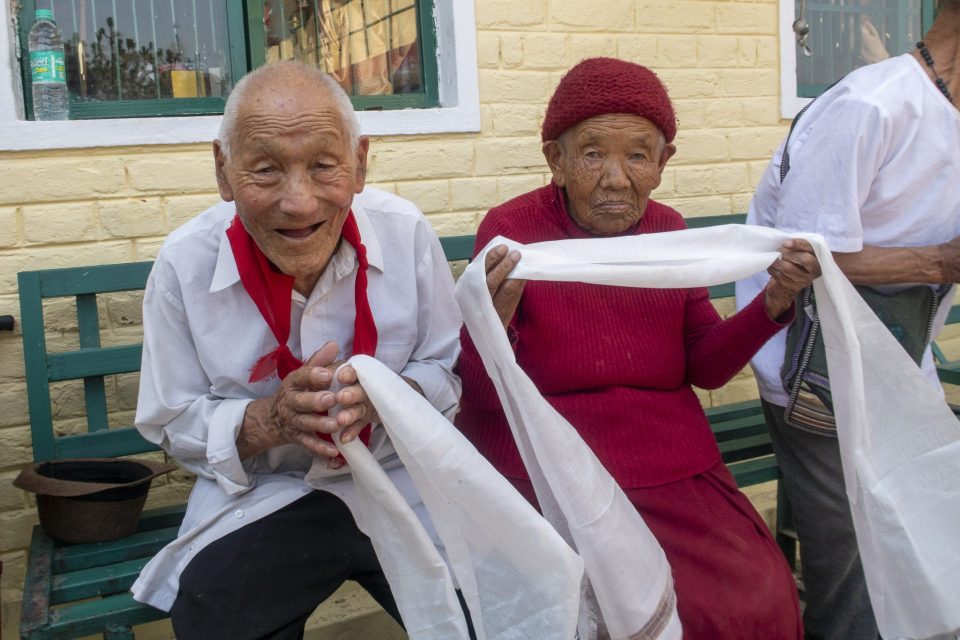
Jampaling Old People’s Home joyful residents.
Jampaling Old People’s Home, located near the kora in McLeod Ganj, Dharamsala, has long served as a sanctuary for elderly Tibetan refugees. Established in 1991, it is the largest Tibetan elderly home, currently housing 75 residents and supported by 13 dedicated staff members. In 2025, with the continued support of FPMT’s Social Services Fund, the home was able to meet their running expenses – ensuring residents receive nutritious meals, medical care, and a spiritually enriched environment. The grant played a crucial role in maintaining stability and dignity for these elders.
Kalimpong Old People’s Home is located in a charming hill town nestled in the beautiful Darjeeling district of West Bengal, India. Rich in history, it once served as a crucial trade hub connecting Tibet and India. Since 1950s many Tibetan refugees bravely crossed the Himalayas, seeking refuge in India, with a significant number finding a new home in Kalimpong.
Today, the town hosts over 3,000 Tibetan residents, yet their communities are spread out rather than organized in traditional, close-knit groups. Many of these individuals face economic hardships, struggling with unstable incomes and financial insecurity.
In response to the needs of the community, the Kalimpong elderly home was established in 2008. Opened in 2012, this home provides care for 12 elderly Tibetans who lack financial and family backing. The Old Age Home extends its reach to support elders from neighboring regions such as Darjeeling, Gangtok, and Bhutan, with the capacity to welcome 35 residents and a dedicated team of 5 staff members. The 2025 grant supported their annual running expenses, helping them maintain their high standards of care.
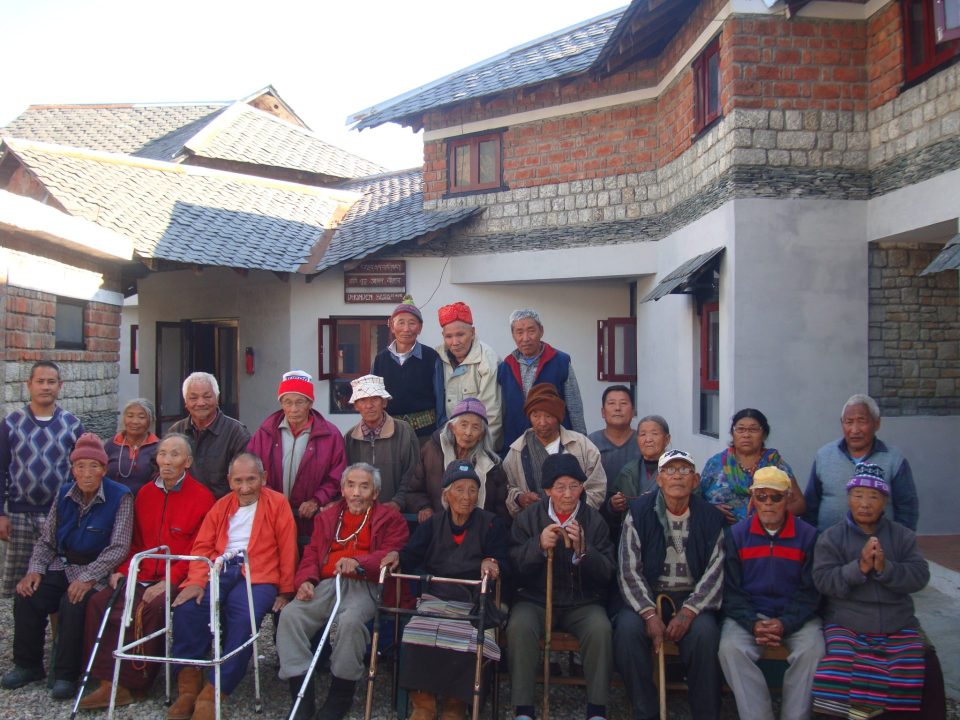
Dhonden elderly home residents.
Located in the picturesque Bir Tibetan settlement, Dhonden Old People’s Home cares for 18 elders and is staffed by five caregivers. In 2025, FPMT’s Social Service Fund supported both the running expenses and a special furniture upgrade project, enhancing communal spaces such as prayer and dining halls.
Here’s a glimpse of what the elders now enjoy:
- Kitchen shelves, utensil cabinets, and sink units for better organization and hygiene.
- Prayer shelves to support spiritual practice.
- A patient bed and office chairs for medical and administrative needs.
- A 25-liter geyser and pressure cooker for daily comfort.
- A big-screen TV in the dining hall for shared moments of joy and watching teachings of His Holiness the Dalai Lama.
- A computer to support the home’s operations.
The transformation is more than physical. Residents now live in a space that feels like home – organized, peaceful, and respectful of their needs. The upgraded prayer and dining halls have become places of meaningful connection and laughter. As the Department of Home (Central Tibetan Administration) beautifully put it in their gratitude note, this initiative has created a “dignified and nurturing environment for our senior citizens.”
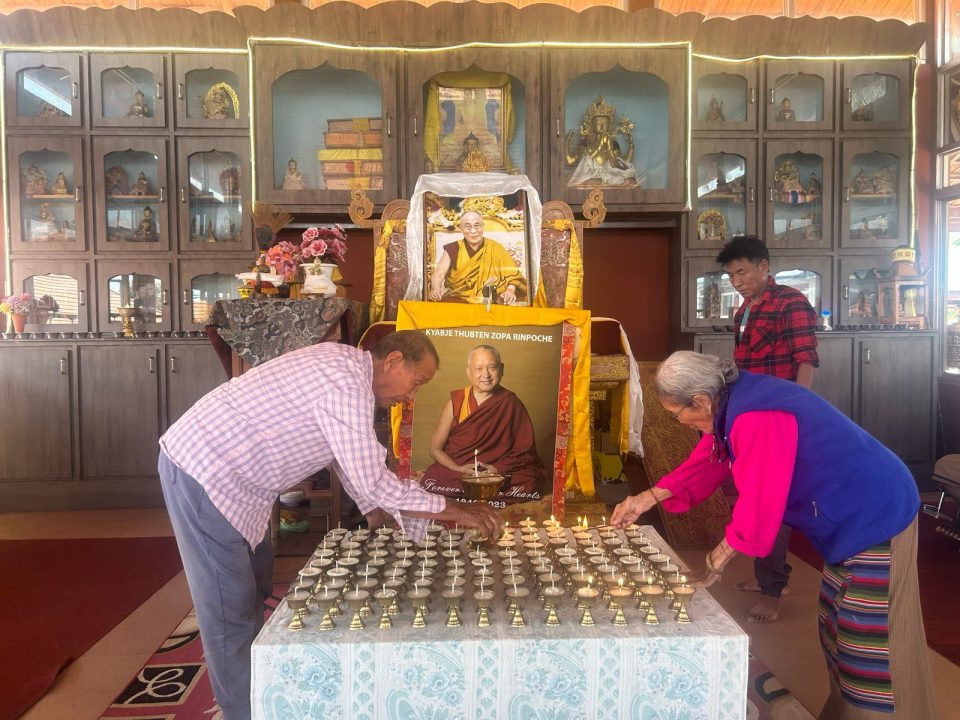
Offerings in front of Lama Zopa Rinpoche’s photo at Lugsam elderly home .
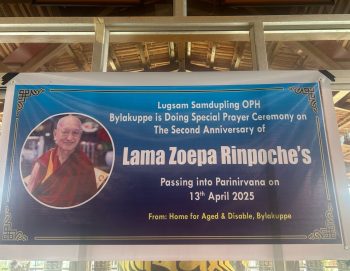
Residents of Lugsam elderly home offering their prayers.
At the heart of the Lugsam Tibetan Settlement in Bylakuppe, Lugsam Samduling Old People’s Home continues to be a sanctuary for 36 elders. This home employs 6 dedicated staff members who assist residents with daily tasks such as room cleaning, bathing, and laundry. Each day is structured with compassionate care – from nutritious meals to spiritual gatherings in the prayer hall at 4 PM.
Residents also benefit from weekly health check-ups, thanks to the collaboration with Men-Tse-Khang and Tso-Jhe Hospital. This holistic approach ensures both physical and emotional well-being.
The 2025 grant from the Social Services Fund covered their annual expenses, including food, medical support, salaries, and utilities. This contribution enabled them to continue providing this important aid while preparing to welcome more residents moving forward.
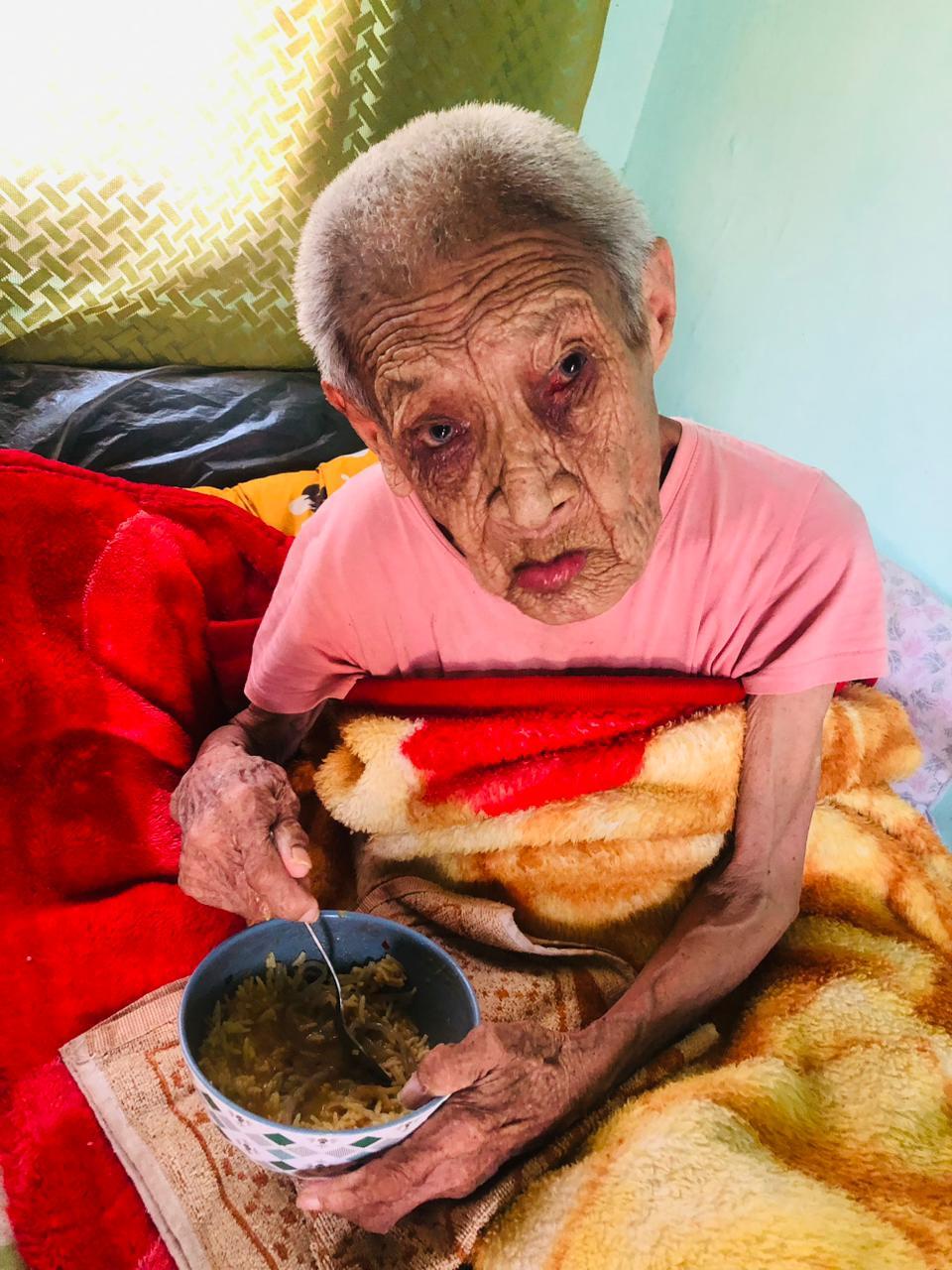
Doeguling Mundgod elderly home resident enjoying a meal.
Doeguling Old and Infirm People’s Home, located within the Doeguling Tibetan Settlement in Mundgod, has been a recipient of FPMT’s Social Services Fund for many years. In 2025, the home continues to provide essential care to 50 elderly residents – 27 men and 23 women – with the dedicated support of eight staff members.
Among the residents, 28 are over the age of 80, and nine are bedridden, requiring 24-hour assistance. The home is able to offer daily sunbathing sessions and social interaction for these individuals, ensuring they remain connected and comforted. Many residents are managing chronic conditions such as carcinoma, HIV, hepatitis, diabetes, hypertension, and arthritis, and receive both allopathic and homeopathic treatments tailored to their needs.
This year, several residents underwent critical medical procedures, including cataract surgeries and radiation therapy for cancer. The home also provided palliative care for elders who can pass away peacefully after battling serious illnesses.
In January 2025, 46 residents were taken on a spiritually enriching journey to Bylakuppe to receive blessings from His Holiness the 14th Dalai Lama. The trip, supported by individual sponsors and the local settlement office, brought immense joy and fulfillment to the elders, many of whom described it as a deeply meaningful experience.
The 2025 grant offered supported both their daily operating needs and building maintenance.
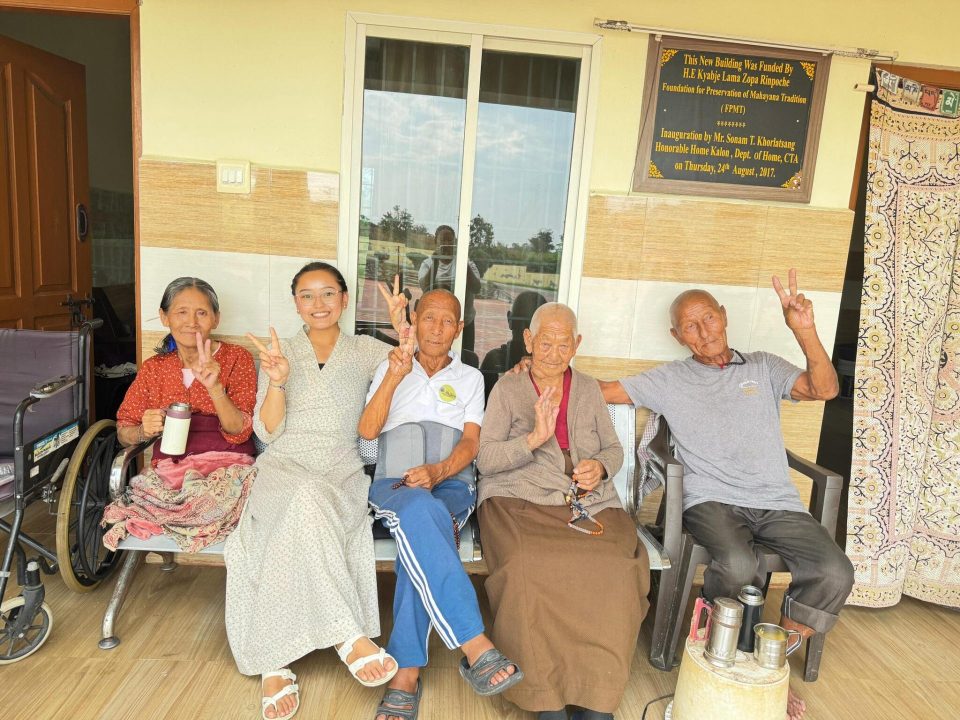
Residents of Rabgayling elderly home posing in front of inauguration plaque commemorating Lama Zopa Rinpoche’s support
Rabgayling Old People’s Home, located within the Rabgayling Tibetan Settlement in South India, has been a recipient of Social Services Funds since 2015. As of January 2025, the home cares for 12 elders. The home remains committed to providing essential support and a sense of belonging to each individual.
This year has also brought some changes in leadership and operations. Ms. Tenzin Nordon now serves as the in-charge of the home. Under her guidance, the home continues to uphold its mission with renewed dedication. In accordance with updated guidelines from the Central Tibetan Relief Committee (CTRC), staff salaries have been revised, resulting in an increase in recurring expenses. The grant provided the costs for food, medical care, staff wages, and administration costs. This support ensures these seniors living peacefully, with dedicated care tailored to their needs.
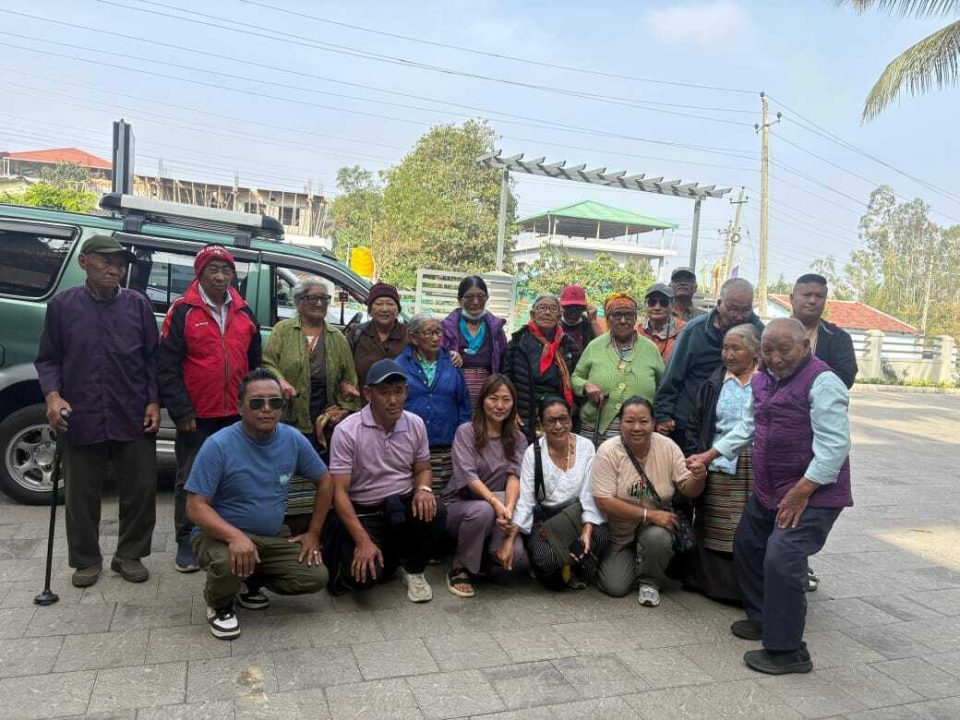
Dhondenling elderly home residents in Bylakuppe.
Dhondenling Old People’s Home, located in the heart of the Dhondenling Tibetan Settlement in Kollegal, continues to provide consistent, high-quality care for its elderly residents. With the steadfast support from FPMT and other partners, the home has made significant strides in improving both the quality of life for elders and the infrastructure that supports them.
In 2025, the grant offered enabled the successful completion of several impactful projects:
- A new concrete road was constructed, enhancing safety and accessibility for residents and staff, especially during the monsoon season.
- A nutrition program provided fresh fruits, vegetables, dairy, and protein-rich foods, boosting immunity, energy, and overall well-being for 20 residents.
- Urgent building maintenance, including kitchen drainage repairs and repainting of prayer wheel railings, helped preserve hygiene and safety.
These improvements have not only enhanced daily life but also reduced long-term maintenance needs – laying the groundwork for a more resilient future. Additionally, they are looking at taking bold steps toward long-term sustainability. A generous community member has offered land previously used as a student hostel for commercial development. Plans are underway to build a shopping complex and restaurant, with the goal of generating sustainable income to support the home’s operations for years to come.
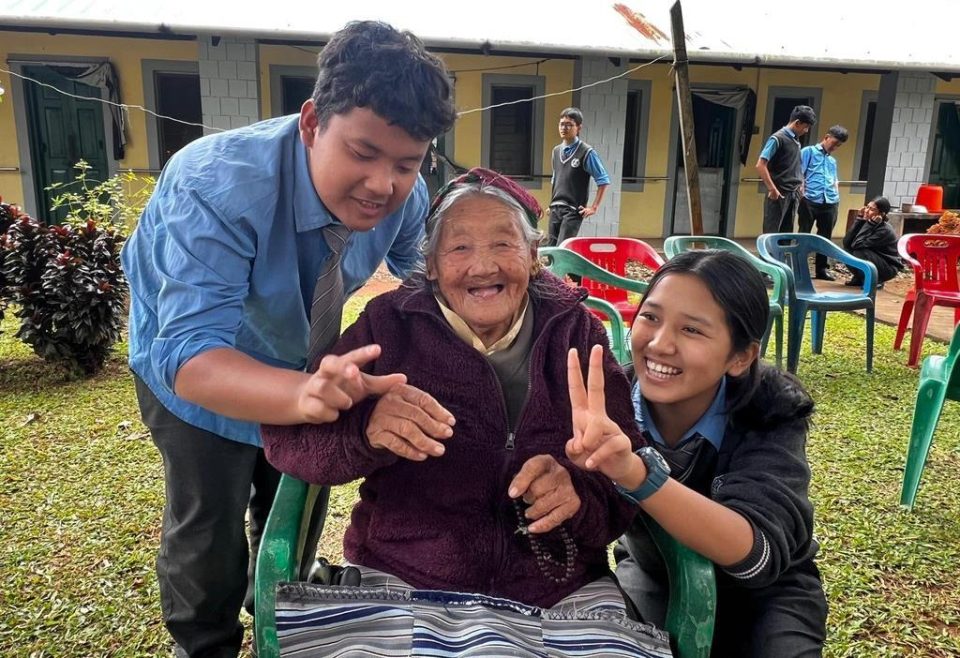
Phuntsokling elderly home resident with local children.
The Old People’s Home in Phuntsokling Tibetan Settlement, Odisha, continues to be a place of warmth and deep community connection for its elderly residents – from enabling elders to receive blessings from His Holiness the 14th Dalai Lama in Dharamsala, to supporting cultural exchanges with local schoolchildren, and providing regular health checkups and vaccinations through Menlha Hospital. Currently, the home cares for 13 elders, including four residents who are bedridden and require extensive daily assistance. A dedicated team of five staff members ensures that each elder receives the attention and care they deserve.
In May 2025, the home faced a sudden and severe challenge. A powerful rainstorm tore through the settlement, ripping open the roof of the elders’ residence and bathrooms – structures last renovated in 2016. Though no one was injured, the incident underscored the urgent need for a more durable, cyclone-resistant roofing solution in this vulnerable region.
In light of this emergency, the Phuntsokling Settlement Office has respectfully requested to reallocate the previously approved grant from FPMT which was for much needed renovation, to be now used toward the immediate roof repairs and reinforcement. This shift in priority is essential to ensure the safety and well-being of the elders, many of whom are frail and highly susceptible to environmental hazards.
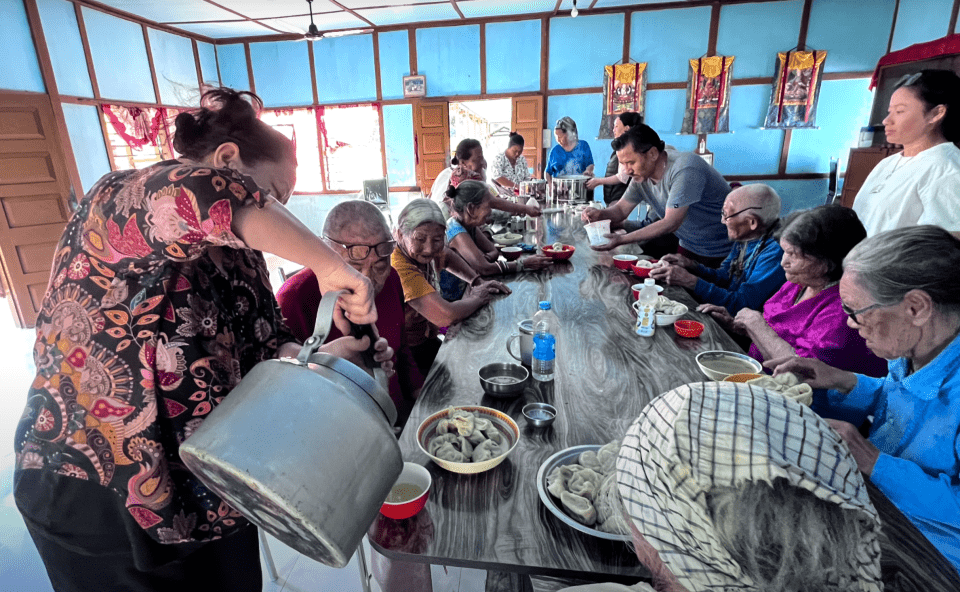
Dhargeyling residents enjoying their lunch together.
Dhargyeling Old People’s Home is nestled in the Dhargyeling Tibetan Settlement in Tezu, Arunachal Pradesh. This home is undergoing a vital transformation to ensure the health, safety, and comfort of its elderly residents. With 16 elders currently residing at the facility – and more expected as the region becomes a central hub for elder care – the need for a secure and climate-resilient living environment has never been more urgent.
In 2025, the home began reconstruction with support from the Department of Home and the Tibetan Administration’s Welfare Society. However, the intense summer heat in Tezu, combined with prolonged monsoon rains, has made it clear that the existing concrete structure requires additional protection. Without proper roofing, residents face serious risks such as heatstroke, dehydration, and respiratory issues.
To address this, the settlement office proposed the installation of Corrugated Galvanized Iron (CGI) sheet roofing – a durable, cost-effective solution that will significantly reduce indoor temperatures and protect the building from water damage. The roofing will cover an area of 12,348 square feet. The grant from FPMT is covering the cost of this roofing project, to protect the residents from extreme heat and monsoon damage, dramatically improving their quality of life.
We deeply appreciate your support, together, we can help these resilient communities build stronger and safer environments, ensuring that the Tibetan elders continue to live with dignity and peace.
Your continued support to the Social Services Fund, helps ensure continuous assistance for elderly homes and those who are in need.
- Tagged: dhargyeling old people's home, dhondenling old people home, doeguling home for elderly and disabled, elderly, elderly home, jampaling elders home, lugsam samduling home for the aged and disabled, odisha phuntsokling settlement old people's home, old age home in Kalimpong, rabgayling old aged home
8
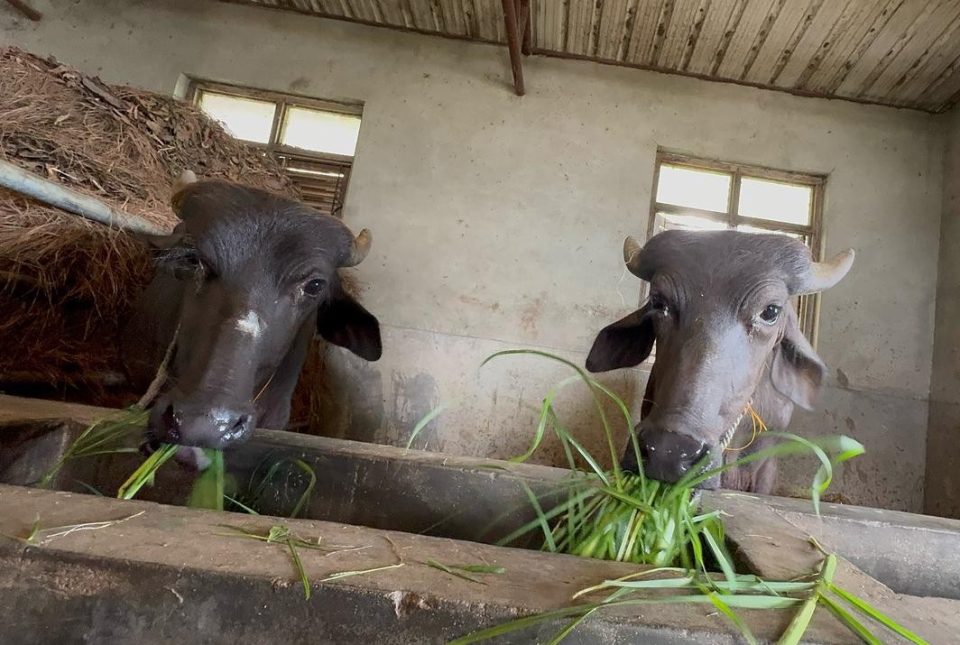
Buffalos rescued from slaughter now living out their lives at the Animal Liberation Sanctuary near Kopan Monastery.
Recently we shared that three young buffalos were saved from impending death in Kathmandu in honor of His Holiness the Dalai Lama’s ninetieth birthday and for the health and long, long life of His Holiness.
Ven. Roger Kunsang requested H.E. Ling Rinpoche to give names to the three buffalos and the following names were given: Losang (meaning: wise), Ngawang (meaning: Lord of speech), and Jampal (meaning: gentle glory).
His Holiness emphasizes the concept of “universal responsibility” for animals and the environment. As part of this universal responsibility, there is a duty to show compassion and care for all sentient beings, which of course includes animals.
We are so happy to share a video of these beautiful rescued creatures being cared for at the Animal Liberation Sanctuary, near Kopan Monastery, where they will live out the rest of their lives. In addition to food and shelter, which they need to survive, the video shows them being blessed in a variety of ways (including a Guru Rinpoche relic, special mantras, and strings blessed by Kyabje Lama Zopa Rinpoche) while listening to an audio recording of Rinpoche reciting mantras. They also have stupas to circumambulate at the sanctuary to create extensive merit.
Due to Lama Zopa Rinpoche’s perfect example and guidance, these buffalos and all the animals at the Animal Liberation Sanctuary now have such fortunate lives. Rinpoche made sure they are not only are saved from death and have a safe place to live, but most importantly they receive all these blessings and imprints that will bring ultimate benefit to them in the future.
The liberation of these buffalos have been made on behalf of the entire FPMT family, and we deeply request His Holiness to have a stable life for eons, numberless like the drops in the ocean, and to continuously guide us, in all lifetimes without separation.
These three buffalos were sponsored by the Animal Liberation Fund, This fund sponsors animal rescue, care, and liberation. The Animal Liberation Sanctuary cares for the ongoing care of all the animals living in the sanctuary near Kopan Monastery.
- Tagged: animal liberation, animal liberation fund, animal liberation sanctuary, his holiness, his holiness the dalai lama
25
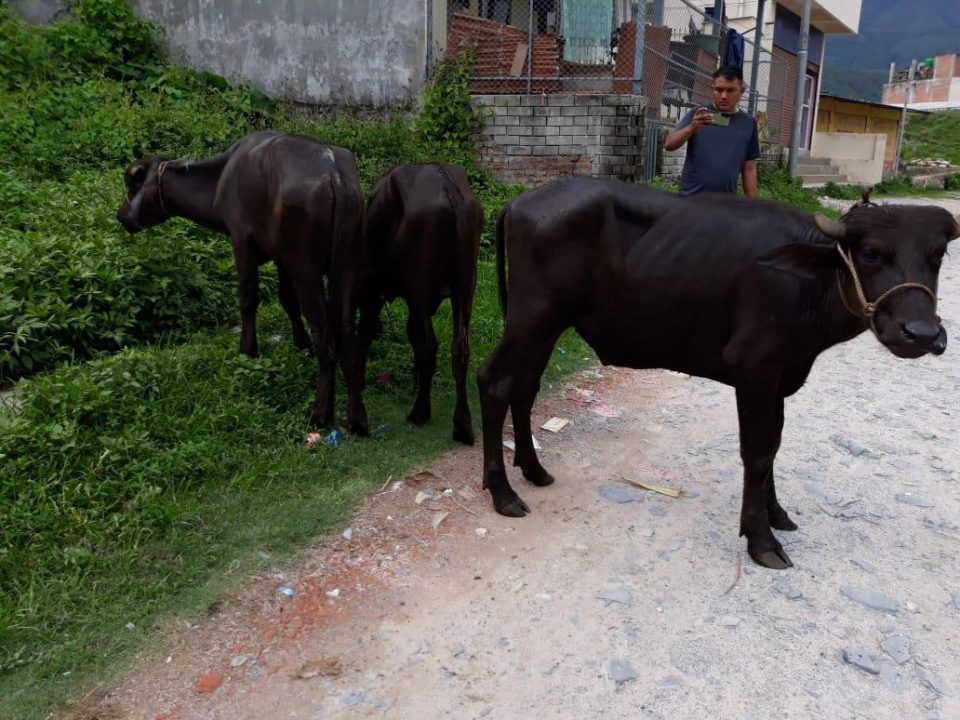
Three young buffalo liberated in honor of His Holiness the Dalai Lama’s 90th birthday.
We are so happy to share with you that three young buffalos were saved from impending death in honor of His Holiness the Dalai Lama’s ninetieth birthday and for the health and long, long life of His Holiness. These buffalos were tied up outside a butcher’s shop in Kathmandu, were bought and liberated from death. They will now live out the rest of their life at the Animal Liberation Sanctuary that is managed by Kopan Monastery.
Apart from having shelter and food for the rest of their lives, they will be able to listen to mantras and sutra recitations that are playing in the sanctuary. They will also receive blessings from the special mantras printed billions of times on microfiche, that Kyabje Lama Zopa Rinpoche had made up for all the animals that live in the sanctuary.
Please rejoice in this offering that has been made on behalf of the entire FPMT family, and we deeply request His Holiness to have a stable life for eons, numberless like the drops in the ocean, to continuously guide us, in all lifetimes without separation.
These three buffalos were sponsored by the Animal Liberation Fund, This fund sponsors animal rescue, care, and liberation. The Animal Liberation Sanctuary cares for the ongoing care of all the animals living in the sanctuary near Kopan Monastery.
- Tagged: animal liberation, animal liberation fund, animal liberation sanctuary, his holiness, his holiness the dalai lama
23
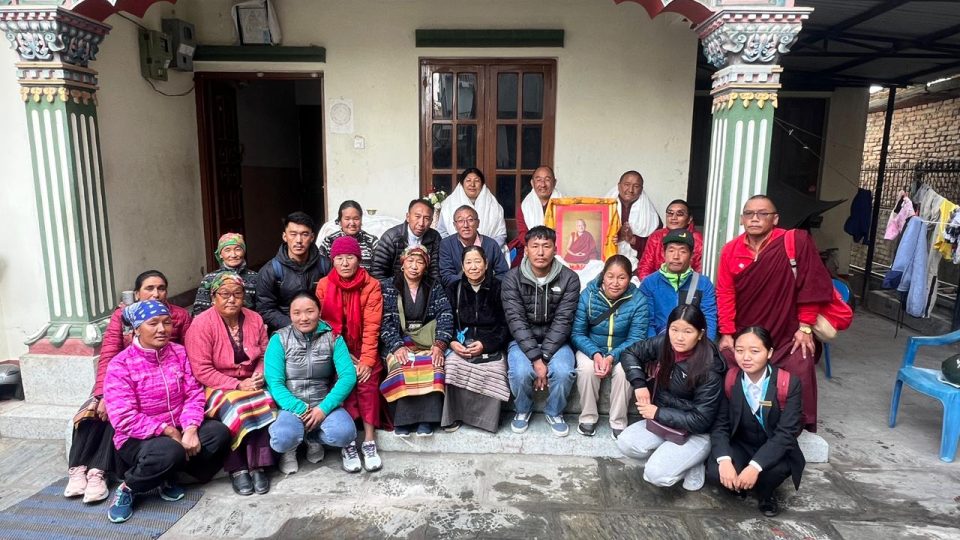
Geshe Tsultrim Sherab and Gen Tsundu with some of the Thame residents who received essential aid at the Milanchok Thameychok Kidug Hall in Kathmandu, January 3, 2025.
We are very happy to report that on January 3, 2025, at the Milanchok Thameychok Kidug Hall in Kathmandu, we disbursed US$37,127 to 55 families from Thame, who were profoundly affected by the catastrophic flood caused by the bursting of a nearby glacial lake on August 16, 2024. These funds were raised through the Thame Support Fund.
Thame, situated at an altitude of 12,450 feet (3,800 meters) with a population of 300 Sherpas, suffered immense devastation. The flood destroyed half the village, including houses, hotels, the school and health clinic plus essential infrastructure.
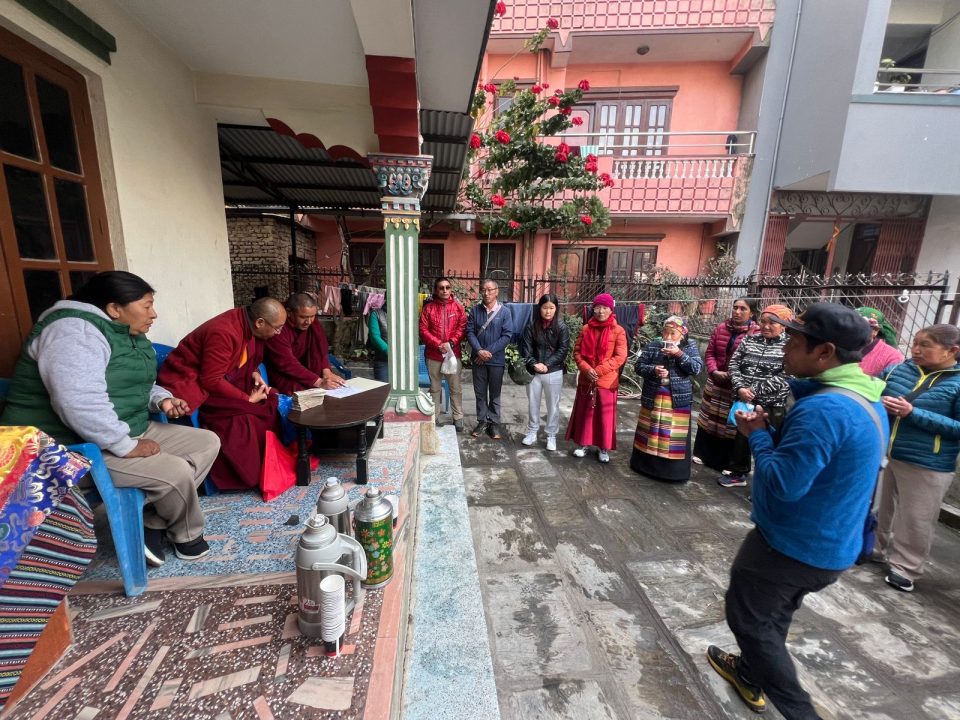
Thame families receiving essential aid at the Milanchok Thameychok Kidug Hall in Kathmandu, January 3, 2025.
Given that it is now winter and many of the families from Thame are in Kathmandu, the disbursement was carried out there and was kindly managed by Geshe Tsultrim Sherab and Gen Tsundu, from Kopan Monastery. Regarding the funds, 100,000 NPR (US$721) was offered to each of the 23 families who had completely lost their homes, while 50,000 NPR (US$360) was provided to each of the 32 families who suffered partial damage to their homes.
Please watch this heartfelt video message of gratitude from Geshe Tsultrim Sherab and Gen Tsundu of Kopan Monastery to all the supporters:
While this support is only a fraction of what is needed, many other groups and individuals have also been raising and disbursing funds for those in the Thame area. We hope that, together, these efforts will make a difference in the lives of those affected during this incredibly difficult time.
We are closely monitoring the situation in Thame and its ongoing needs. If future support can be directed toward the rebuilding of the school or health clinic, we will again try to help. We are closing the Thame Support Fund and any future needs will be managed by the Social Services Fund.
Our heartfelt thanks go to the many supporters who came together so quickly to offer assistance, as well as to Yeshe Norbu Appeal for Tibet Onlus in Italy for their generous contribution.
The Social Services Fund, established to support Lama Zopa Rinpoche’s Vast Visions for the FPMT organization, focuses efforts primarily in India, Nepal, Tibet and Mongolia. Funds help children, the elderly, sick, and very poor.
- Tagged: social services fund, thame, thame support fund
25
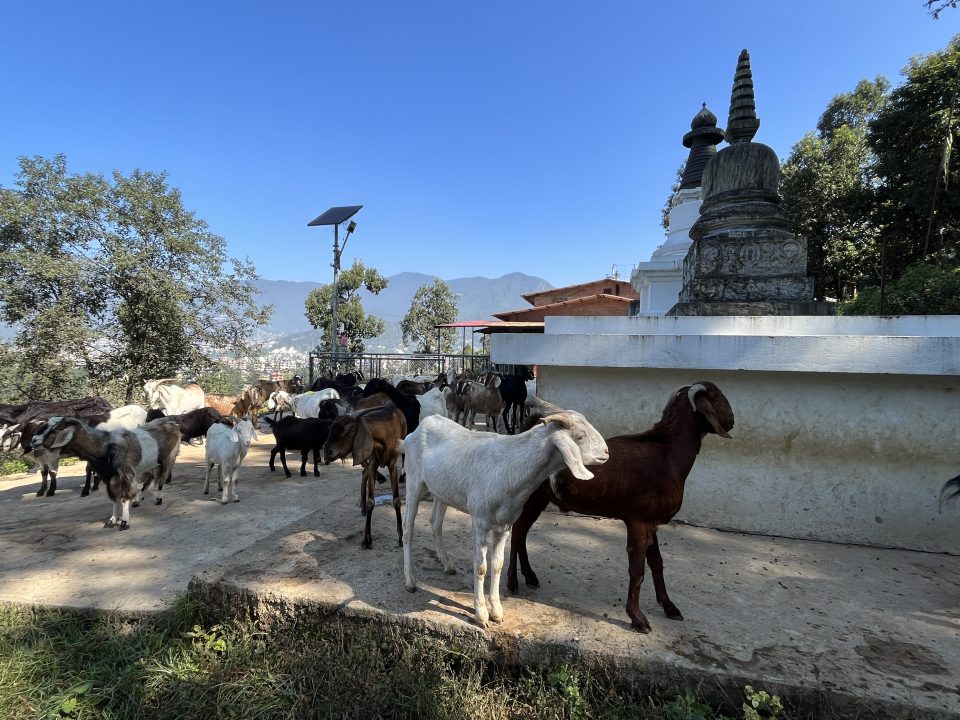
Liberated goats at Kopan Liberation Sanctuary.
The Animal Liberation Fund supports ongoing animal liberations conducted by Sangha and students, which include extensive prayers and dedications for fulfilling Lama Zopa Rinpoche’s holy wishes, his gurus, sponsors, those who are sick or facing untimely death, and specific requests from the FPMT community. Supporting these liberations fosters long life for the animals, oneself, and those to whom the prayers are dedicated. The benefits are vast, impacting the saved creatures, supporters of the practice, and those dedicated in the prayers. The fund enables weekly liberations and extensive dedications at Buddha Amitabha Pure Land in Washington State, USA. We are delighted to share that the Animal Liberation Fund provided US$11,500 in grants to the Kopan Animal Liberation Sanctuary in Nepal and for the releasing and care of animals in Buddha Amitabha Pure Land in Washington State, USA.
Kopan Animal Liberation Sanctuary, Nepal
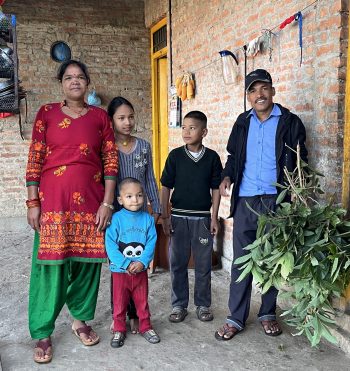
Kind local family of caretakers at Kopan Animal Liberation Sanctuary.
The Animal Liberation Sanctuary at Kopan Monastery in Nepal, initiated by Lama Zopa Rinpoche, is a haven of compassion and hope. This sanctuary rescues animals from slaughter, offering them a peaceful life and exposure to Buddha Dharma. Currently, it houses one buffalo, eight cows, two sheep, and fifty goats, all lovingly cared for by a local family of caretakers and dedicated team members.
One of the most heartwarming stories from the sanctuary is that of Bodhichitta, a buffalo blessed by Lama Zopa Rinpoche. Bodhichitta thrives in the sanctuary’s nurturing environment, enjoying daily life surrounded by care and love. The sanctuary also provides the joyful experiences of its cows and goats, each with unique personalities. Some goats are incredibly curious and love to explore, while others prefer lounging in the sun. Their well-cared-for lives are a testament to the sanctuary’s commitment to their well-being.
The animals at the sanctuary receive a diverse diet that includes fresh vegetables, fruits, and specially formulated feed. Regular veterinary check-ups, vaccinations, and treatments ensure their health and happiness. This comprehensive care underscores the sanctuary’s dedication to providing a safe and nurturing environment for all its residents.
Maintaining such a sanctuary requires significant resources. The estimated yearly expenditure for the sanctuary includes costs for feed, wages, and electricity, totaling US$23,547. In 2024, the Animal Liberation Fund offered a grant of $9,800 toward the annual expenses. This financial support is crucial for the sanctuary to continue its lifesaving work and to expand its reach to more animals in need.
Animal Liberation Practices in the USA
In Buddha Amitabha Pure Land in Washington State, USA, the Sangha members engage in various compassionate practices to benefit animals. They perform charity to ants, bless birds, and, on a monthly basis (excluding winter months), offering blessings upon all beings residing in lakes, praying for their well-being. They liberated about 33,780 animals (mainly insects) over the past year. The Animal Liberation Fund contributed US$1,500 to support this initiative.
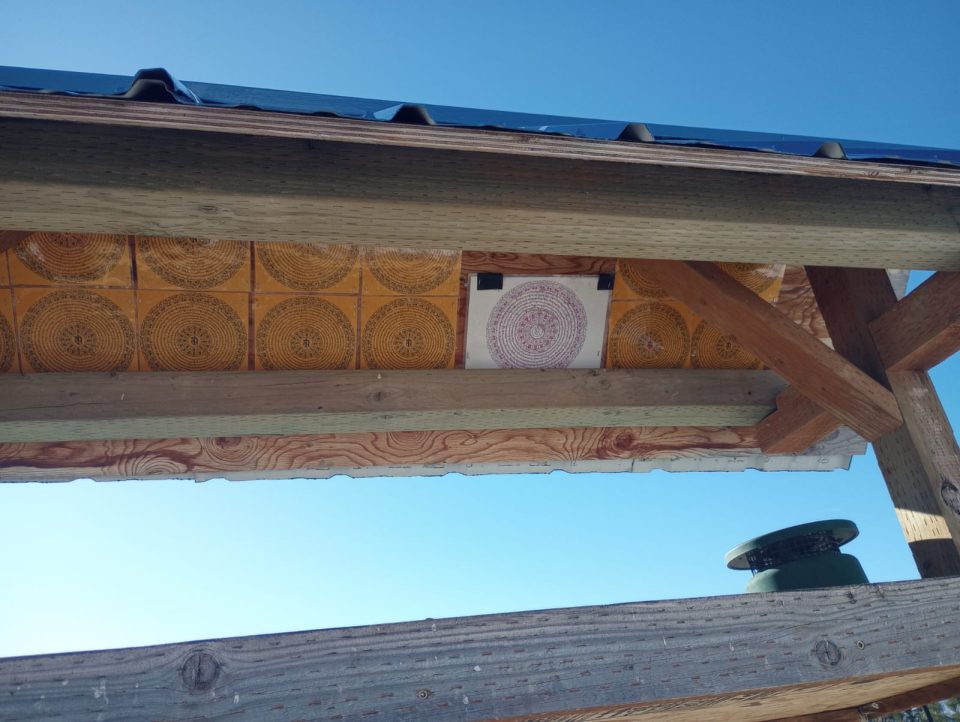
Bird feeder with the Namgyalma mantra under the rooftop.
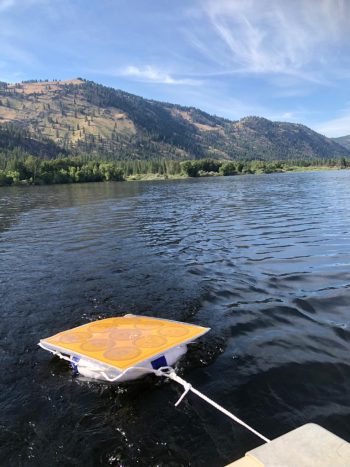
Blessing the lakes with Namgyalma mantra.
One of the local monks regularly fills a bird feeder with water infused with the powerful Padmasambhava mantra. When birds drink or bathe in this water, it creates conditions for them to attain enlightenment in a single lifetime. The monks also add finely powdered mani pills, blessed by His Holiness the Dalai Lama, to the water. Additionally, a loudspeaker plays recordings of holy sutras and mantras continuously, purifying the birds’ minds and planting seeds for enlightenment.
Lama Zopa Rinpoche actively blessed lakes and other bodies of water to liberate the animals and fish residing within them. Sangha in Washington continues to carry on these virtuous activities according to Rinpoche’s advice. These blessings aim to alleviate suffering, free animals from the cycle of rebirth, and guide them towards Buddhahood. Methods include extensive prayers, recitation of mantras, placing laminated mantra papers on the water’s surface, and playing recorded mantras near the water. Blessing fish food before offering it also contributes to the well-being of aquatic beings.
Please watch this video of scenes from Buddha Amitabha Pure Land and the blessing of all beings in the lakes with Venerables Tharchin and Tenzin taking a small boat out with mantra flags and mantra board in order to bless all the beings:
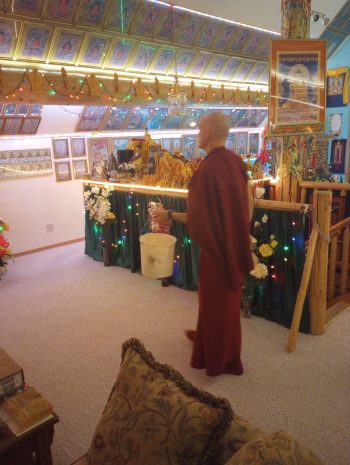
Sangha blessing the animals in the Washington house.
The monks also practice charity to ants, following Rinpoche’s detailed instructions. They mix water, tsampa (roasted barley flour), sugar, butter, and crushed mani pills into a fine powder, which they sprinkle onto ants’ nests while reciting mantras, benefiting the ants.
Additionally, the monks built a worm pit to continue their animal liberation practices during winter. When performing these liberations, they offer powerful prayers for the ill, recently deceased, and those who have requested prayers, sharing the generated merit among many beings.
Since 2005, Lama Zopa Rinpoche’s unique approach to liberating animals has led to the liberation and blessing of over a million beings, including crickets, mice, worms, fish, ants, birds, and goats.
Heartfelt gratitude is extended to each and every compassionate donor who has supported the Animal Liberation Fund in the past and will continue to do so in the future. Your generosity is truly remarkable, and immense joy is felt as the positive impact of your contributions is recognized. With great appreciation, all the merits accumulated through animal liberation and blessing are dedicated towards the great enlightenment of all sentient beings. Thank you for your kindness and dedication to this auspicious cause!
Please explore more resources and inspiration for benefiting animals:
fpmt.org/education/prayers-and-practice-materials/benefiting-animals-practices-and-advice
All are welcome to contribute to the Animal Liberation Fund to help ensure that our work sponsoring animal rescue, care, and liberation continues.
- Tagged: animal liberation, animal liberation fund, buddha amitabha pure land, kopan animal sanctuary
29
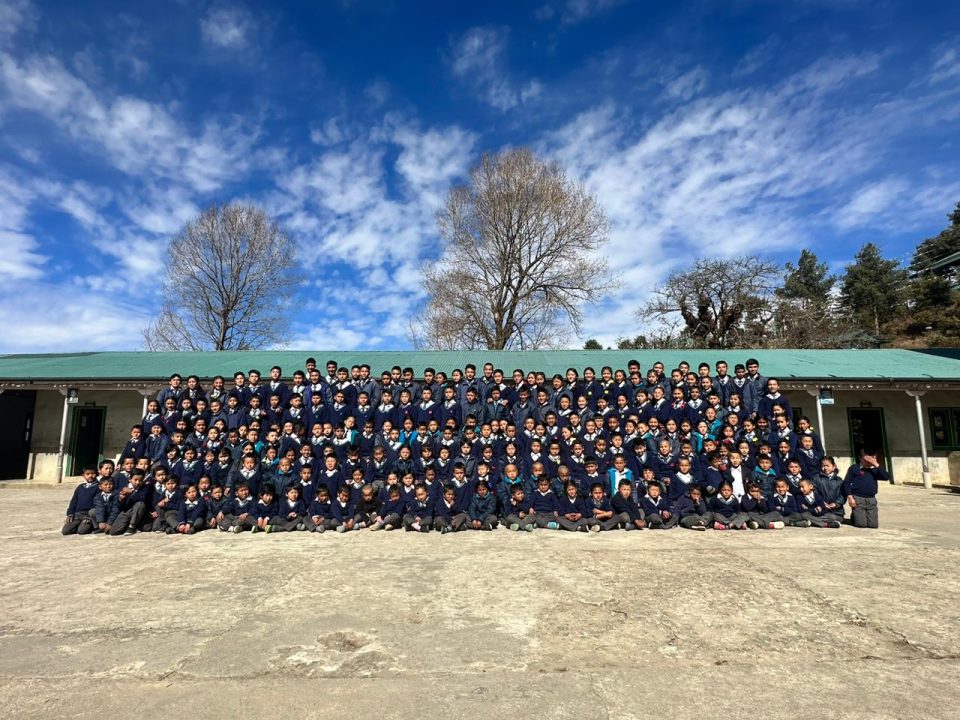
Sagarmatha Secondary School students, May 2024.
Since 2012, the FPMT’s Social Services Fund has been a cornerstone of support for schools in India and Nepal, catering to students from Tibetan, Nepali, Sherpa, and Indian backgrounds. This initiative ensures that these schools can provide quality education at no cost by covering essentials such as food, uniforms, school supplies, and teacher salaries. In 2024 alone, the fund allocated US$213,052 to seven schools, positively impacting nearly 1,500 children. This remarkable effort not only delivers essential modern education but also preserves cultural heritage and Buddhadharma teachings.
Sagarmatha Secondary School | Sambhota Tibetan School CVP Bylakuppe | Ngari Institute | Shree Sangka Dhechholing Gonpa School | Maitreya School | Rolwaling Sangag Choling Monastery School | Gaden Jangtse Monastic College | How to Help
Sagarmatha Secondary School, located in Chailsa, Solukhumbu, Nepal, is dedicated to providing holistic education to its students. The school emphasizes academic excellence, cultural heritage, and personal development through a variety of enriching programs and activities.
In 2023 Sagarmatha School admitted 25 new students, bringing the total to 235. A dental campaign improved students’ oral health, and an English debate competition saw Grade 9 and 10 students tie for first place. The school bid farewell to Director Ven. Thupten Khedup and welcomed new Director Ven. Lhundup Tsundue.
In May and June 2023, the school organized a Nepali elocution competition, with Grade 10 students securing top positions. Republic Day was marked with calligraphy and essay writing competitions. A prayer session was held on the 49th day of Kyabje Lama Zopa Rinpoche’s passing. An English poem recitation competition and a student club election were also conducted.
October and November 2023 saw an inter-house English drama competition. A new martial arts class in karate was introduced. Students participated in the “Thank You Solukhumbu” program and received warm clothes for winter. Students also attended the Guru Bhumtsok offering.
In February and March 2024, Losar was celebrated, and Saraswati Puja was performed for wisdom. They held an open art and craft exhibition as well that showcased students’ creativity.
These activities not only fostered a sense of community and learning but also provided students with opportunities to develop various skills and celebrate their cultural heritage. The school’s commitment to holistic education is evident through these diverse and enriching programs. The Social Services Fund, which has been supporting the school since 2015, and in 2024 we have allocated US$48,000, further aiding the school’s development and initiatives. With thanks also for the kind help of grants from Yeshe Norbu Association and Unione Buddhista Italiana (U.B.I.), enabling us to offer this support.
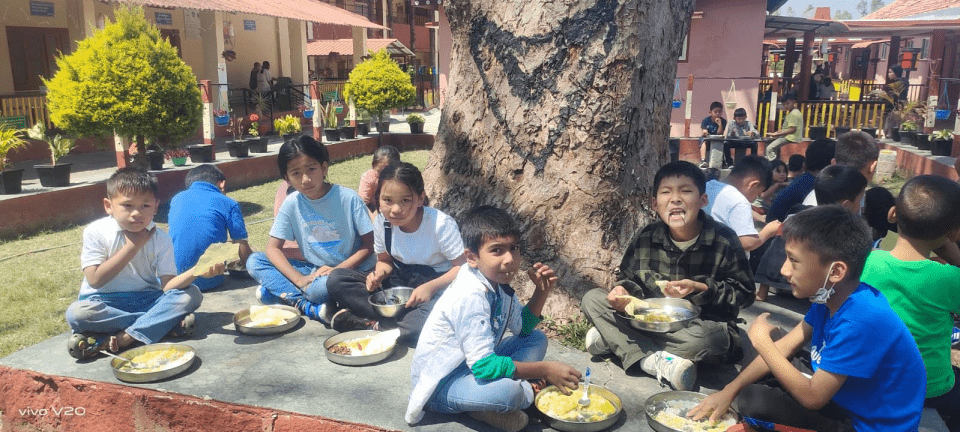
Sambhota Tibetan School students enjoying their lunch.
Following the Chinese occupation of Tibet in 1959, thousands of Tibetan refugees fled to India, Nepal, and Bhutan. To address the urgent need for education among refugee children, the Tibetan government in exile, with support from Indian Prime Minister Jawaharlal Nehru, established the Central Tibetan Schools Administration. In 1999, the Sambhota Tibetan Schools Society (STSS) was formed to manage schools previously overseen by the Department of Education, now overseeing 56 schools with a mission to foster wisdom, compassion, and innovation.
Sambhota Tibetan School CVP Bylakuppe, located in the Tibetan Dickey Larsoe Settlement in Karnataka, was taken over by STSS on May 5, 2018. Established in 1971, currently, it runs classes from one to ten, with Tibetan as the medium of instruction at the primary level and English from class six onwards.
The Social Services Fund has been a consistent supporter of the school in Bylakuppe. In 2024, it extended its assistance to US$6,081 to cover the vegetarian lunch program for 125 students, comprising 69 boys and 56 girls, ensuring their nutritional needs are met.
Nestled in the remote, desert-like region of Ladakh, the Ngari Institute plays a crucial role in preserving Tibetan culture, religion, and way of life. Ladakh, known for its stunning high-altitude landscapes, is home to a significant Tibetan community. Over the decades, many Tibetans have sought refuge in Ladakh, especially after the Chinese invasion of Tibet in 1959. This has led to a rich blend of Tibetan and Ladakhi cultures.

Ngari Institute students.
Founded in 2010 and inaugurated by His Holiness the 14th Dalai Lama in 2016, the Ngari Institute currently supports 62 students and is staffed by a dedicated team of 21 regular and 9 temporary members. The institute aims to eventually educate 200 children, focusing on orphans, children of single parents, those from impoverished backgrounds, and young monks.
Primary school students attend government public schools, while intermediate and secondary students are enrolled in private schools, with all fees covered by the institute. After school, hired teachers help students with their homework, and resident monks teach Tibetan language and meditation practices. The institute provides essential provisions such as room, board, tuition fees, books, clothing allowances, and medical care.
In addition to its educational efforts, the Ngari Institute is constructing a Buddha Relics Temple and retreat rooms. They are also working on extending the Girls’ Hostel and planning to plant 1,000 trees. Their mission is to preserve Tibetan Buddhism of the Nalanda Tradition and Tibetan culture.
The Social Services Fund has been supporting the institute since 2013, sponsoring their annual food budget with a contribution of US$30,556 in 2024.
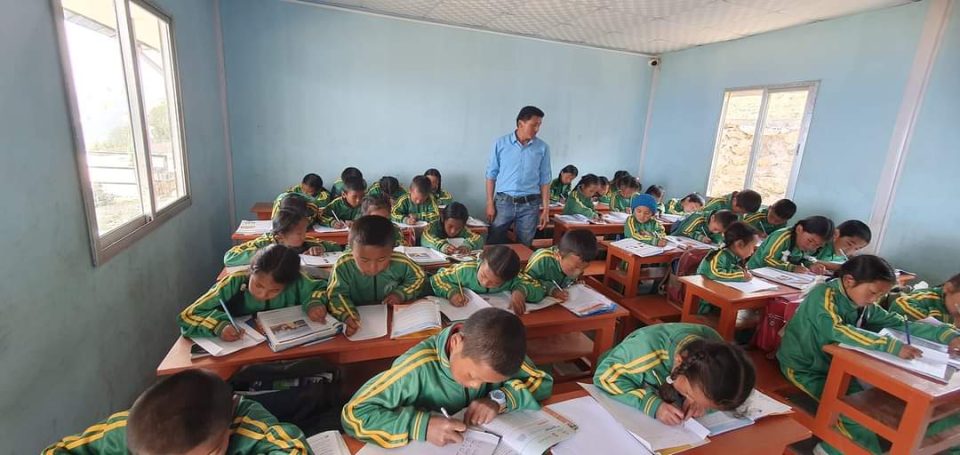
Shree Sangka Decholing Gonpa School’s students, March 2024.
Shree Sangka Dhechholing Gonpa School is located in Taplejung, Nepal, an area renowned for its proximity to Kanchenjunga, the third highest mountain in the world, adding to the natural beauty that surrounds the school. Registered in 2007, Shree Sangka School faced challenges in its early years and was not able to function properly until 2014. It was during this time that Ven. Thubten Jikdol, a senior Kopan Monastery monk, took the initiative to run the school, gradually expanding the grounds in 2016. Over the span of seven years, the school faced various obstacles that are common for schools in the Himalayan regions. These challenges included developing new curriculums, establishing monastic schools for monks and nuns, as well as creating schools for the lay communities. The aim was to incorporate Buddhist teachings, focusing on love, compassion, joy, and equanimity, with the goal of nurturing a caring society and fostering the development of good human beings.
Since 2019, the school has been receiving support from the Social Services Fund. Moreover, the responsibility for the school has now been taken over by Kopan Monastery, further solidifying its commitment to the school’s growth and development. Currently, eleven teachers educate 171 students, including 86 girls and 85 boys, who start at age three. The curriculum, taught in English and Nepali, focuses on modern subjects as well as Buddhist teachings and culture, ensuring a well-rounded education for the students. Classes are offered up to Grade ten.
In 2024, the Social Services Fund offered US$36,042, which covers the entire budget of the school for the year, demonstrating our continued support and dedication to the school’s mission and development.
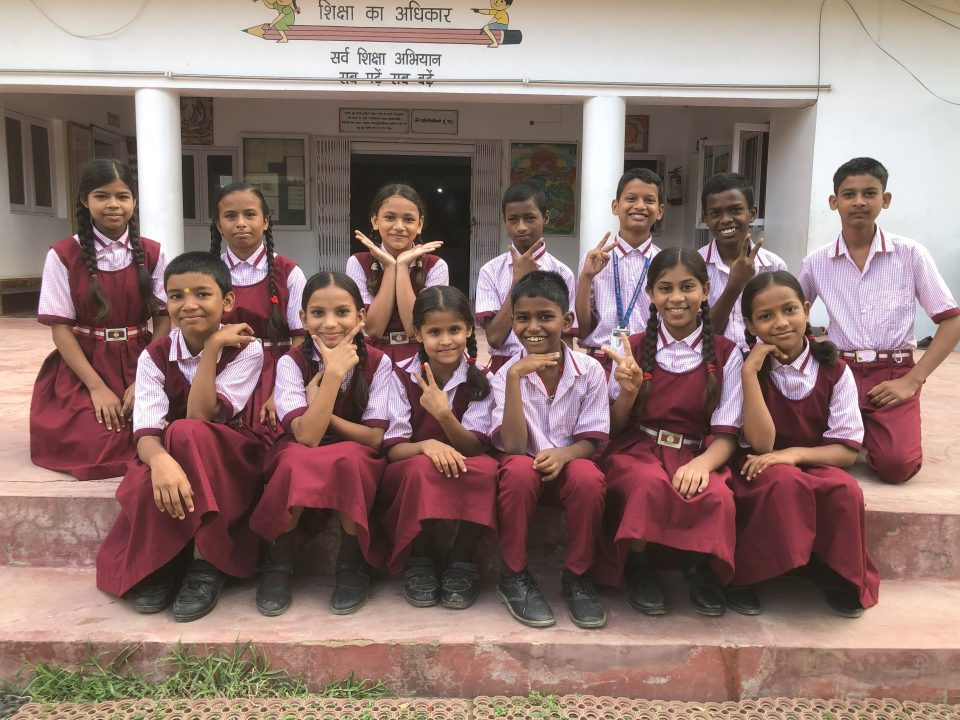
Students of Maitreya School wearing their new uniforms.
Maitreya School, a project of the Root Institute in Bodhgaya, India, is dedicated to providing quality education while fostering the overall growth and well-being of its 263 students. The school integrates academic excellence with cultural awareness and personal development through a variety of enriching programs and activities.
The Maitreya School Report for 2023 highlights numerous activities and events that underscore the school’s commitment to holistic education and student development. One significant initiative was the Girls Hygiene Awareness program, where eighth-grade girls, along with their teachers and volunteers from Days for Girls, educated local girls about menstrual hygiene and distributed sustainable menstruation kits to over 200 girls. The school celebrated Republic Day and Saraswati Puja on January 26, 2023, with traditional rituals and festivities.
A farewell party for the eighth-grade students was held on March 4, 2023, featuring performances, games, and heartfelt speeches. The school also conducted a successful Parents-Teacher Meeting, fostering communication between parents and teachers. Students participated in a procession to the Mahabodhi Temple for Buddha Jayanti on May 5, 2023, engaging in meditation and chanting.
Other notable activities included a Hindi essay competition, a cyber security workshop, a French song performance, and Children’s Day celebrations. An educational tour to Patna provided practical learning experiences, including a visit to the Patna Zoo.
The Social Services Fund has supported the school since 2013 and was delighted to offer US$29,400 in 2024, and on behalf of Kyabje Lama Zopa Rinpoche, who used to annually visit the school and at that time offer new school uniforms, bags and shows, Ven.Roger Kunsang offed an additional US$4800 for this year’s purchase of new uniforms for all students. This ongoing support has been crucial in enhancing the educational experience and overall development of the students at Maitreya School.
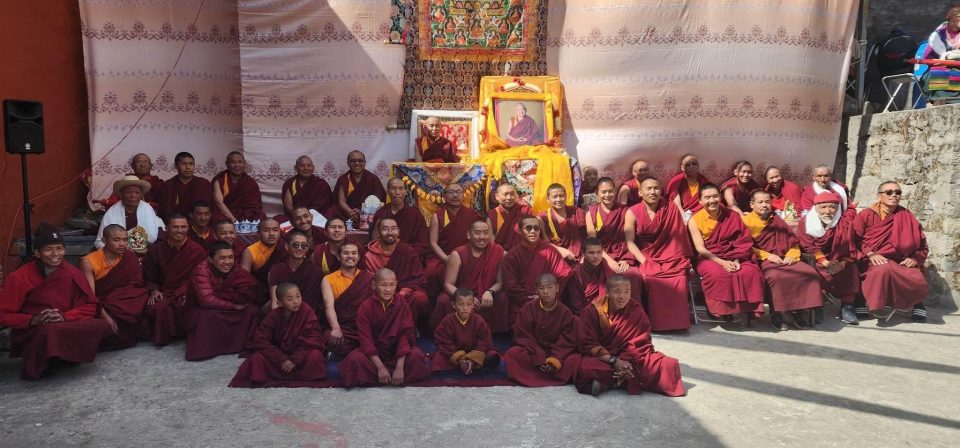
Rolwaling Sangag Choling Monastery School’s students, teachers and Kopan monks.
The Rolwaling Sangag Choling Monastery School, located in the Rolwaling Valley of Nepal, is a community-run free school providing both secular and Buddhist education. The school is serving 26 students and supporting senior students in their Ngondro preliminary practice.
Key activities in 2023 included the purchase and transportation of food supplies, collection of timber for firewood, and potato plantation, ensuring the school’s self-sufficiency in essential resources. Students participated in significant religious and cultural activities, such as the Dumji festival and Manyen prayer ceremony, preserving local traditions. Senior monk-students completed their ngondro practices under the guidance of Ngawang Lapsum Rinpoche and undertook a pilgrimage and educational tour to sacred Buddhist sites in India and Nepal, enhancing their spiritual and educational experience.
The academic year, running from March to December, included three main examinations. The school benefited from the contributions of volunteer English teachers, which improved students’ language skills and confidence.
The Social Services Fund has supported the school since 2014 and in 2024, it offered US$20,200 to cover their annual expenses covering salaries, food supplies, uniforms, books, transportation, internet, electricity, emergency medical rescue, and firewood collection wages. The school continues to play a vital role in the community, providing education and preserving cultural heritage.
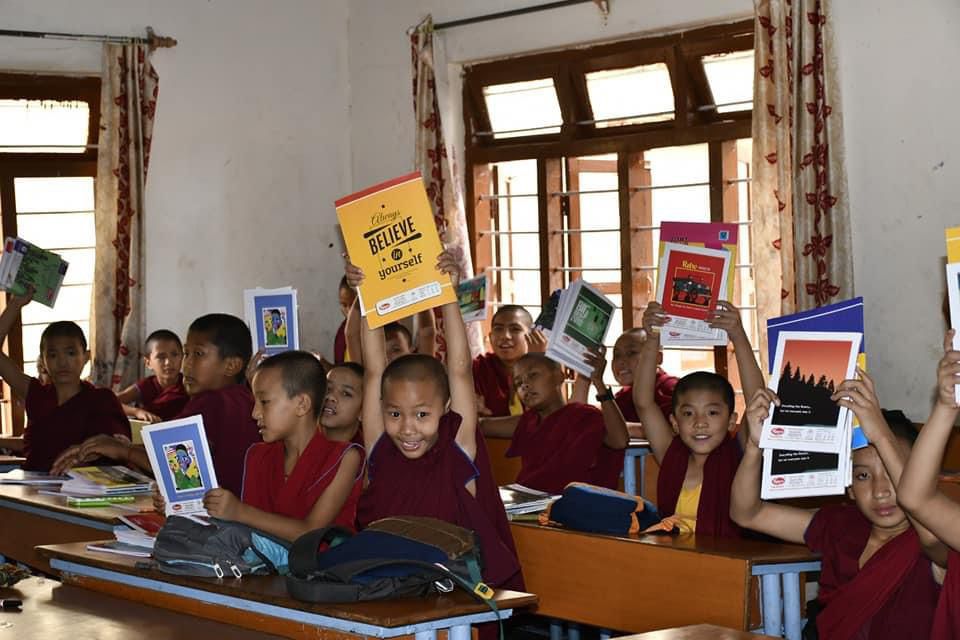
Gaden Jangtse Monastic College’s students with their new textbooks.
Gaden Jangtse Monastic College, located in South India, is a prominent institution within the Gelug lineage of Tibetan Buddhism. The college focuses on educating and training monks in Buddhist philosophy, scripture, debate, and meditation, aiming to preserve and promote Tibetan Buddhist teachings and values. The Gaden Jangtse School, part of the college, currently has 570 students and 15 salaried teachers, with an additional 15 volunteer teachers who are senior monks.
The school has had an eventful past months. They announced the annual examination results and distributed new textbooks and notebooks to all students. A significant highlight was the celebration of His Holiness the Dalai Lama’s 89th birthday in July, which brought together teachers, staff, and students for a joyous occasion. Recognizing the importance of health and hygiene, the school completed a new toilet and bathroom project in July, ensuring better facilities for the students.
Additionally, the school maintained its commitment to staff welfare by ensuring timely payment of teachers’ salaries. The Social Services Fund has been a crucial supporter, offering US$37,973 to cover teachers’ salaries in 2024. With thanks also for the kind help of a grant from Unione Buddhista Italiana (U.B.I.) that enabled us to offer this support.
How to Help
All are welcome to offer toward the Social Services Fund, to support the education of those who are truly vulnerable and in need in India and Nepal.
The Social Services Fund, established to support Lama Zopa Rinpoche’s Vast Visions for the FPMT organization, focuses efforts primarily in India, Nepal, Tibet and Mongolia. Funds help children, the elderly, sick, and very poor.
- Tagged: gaden jangtse monastic college, maitreya school, ngari institute, rolwaling sangag choling monastery school, sagarmatha secondary school, Sambhota Tibetan School CVP Bylakuppe, shree sangka dhechholing gonpa school, social service fund, social services fund
10
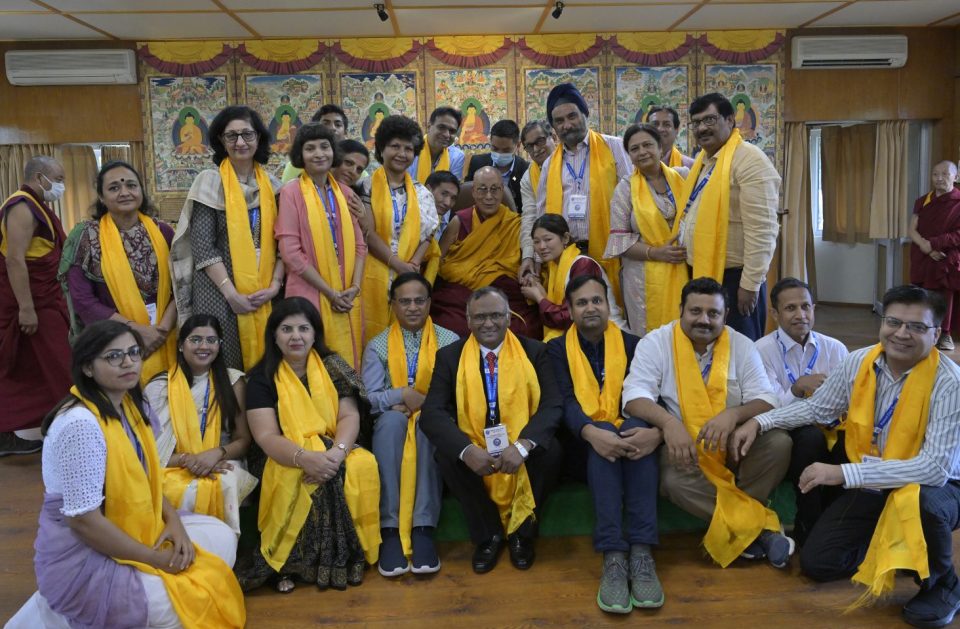
An audience with His Holiness the Dalai Lama during Patient Care Trust’s camp for the top 21 doctors and administrators from three major supporting institutions of PCT since 2012 including AIIMS-Delhi, Safdarjung, and NITRD-Delhi, and the PCT Director, September 2023.
In 2024, the FPMT Social Services Fund, driven by a commitment to compassion to others, made a significant impact by allocating over US$501,284 to support various initiatives in India, Nepal and Mongolia. Dedicated to improving the lives of those in need, the fund focuses on vulnerable populations, including children, the elderly, the sick, and the extremely poor. By providing grants for essential resources such as hospitals, health clinics, soup kitchens, substance abuse, and medical training and education. The fund supports local Indian, Tibetan, Nepali, and Mongolian communities. Through these efforts, the FPMT Social Services Fund continues its mission to alleviate suffering and foster positive change, enhancing the overall well-being of the world’s most vulnerable populations.
Shakyamuni Health Clinic | Maitri Charitable Trust | Lamp of the Path | Patient Care Trust | Tibetan Heart Foundation | Rewa Youth Center | Integrated Indigenous Tribal Children Ministry of India | Karuna Hospital | How to Help
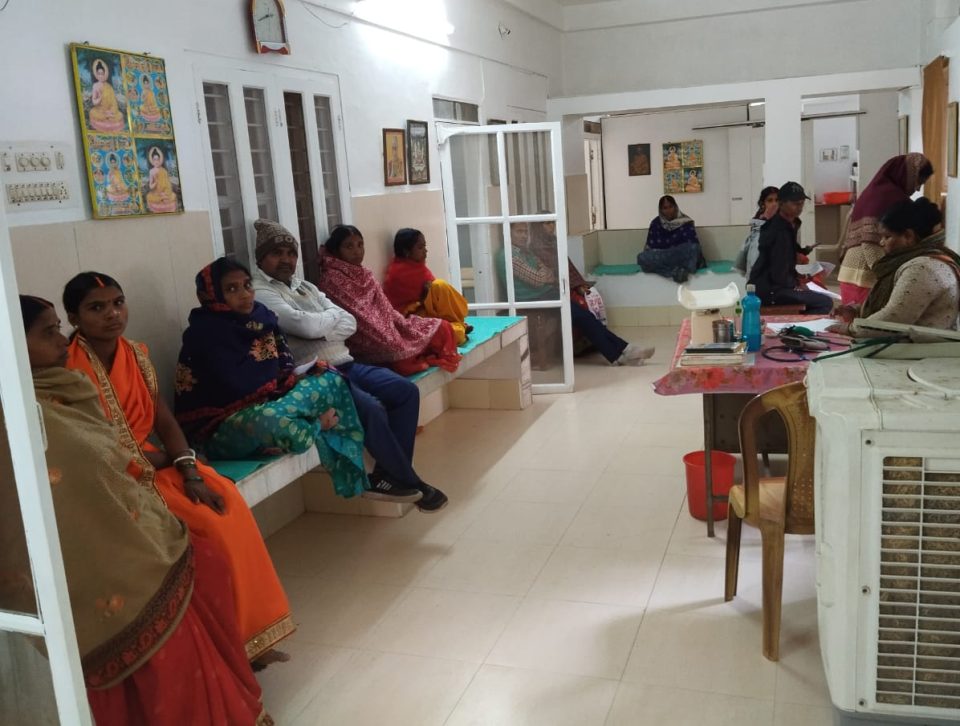
Special day of programs on women’s health issues at Shakyamuni Health Clinic.
Shakyamuni Health Clinic, a vital initiative of Root Institute for Wisdom Culture, has made impressive strides in improving healthcare accessibility in rural Bihar, India, as detailed in its 2023 impact report. Located in Bodhgaya, the clinic expanded its services significantly, seeing 34,095 patients in total —an 8% increase over the previous year. This achievement is particularly remarkable in a region where 88% of the population lives in underserved rural areas.
A key feature of Shakyamuni Health Clinic is its mobile clinic, which visited local villages 8,671 times in the last year. The clinic provides essential services such as medical tests, medication, and follow-ups. In addition, the clinic added dental services in April, providing 256 consultations despite only being open twice a month. The hope is to increase the frequency of dental care in 2024. Physiotherapy also remains a cornerstone of the clinic’s work, with 3,022 sessions conducted this year, helping patients—especially children with cerebral palsy—regain mobility and improve their quality of life.
The health clinic takes a holistic approach to care, offering allopathic, homeopathic, acupuncture, and physiotherapy treatments. A new allopathic nurse recently joined the staff, enhancing the clinic’s ability to provide comprehensive care. Moreover, educational workshops were held for adolescents at the Maitreya Universal Education School, promoting better health awareness among the youth.
Infrastructure improvements, including dental clinic upgrades and repainting the clinic, were made possible through generous donations. In 2024 the Social Services Fund contributed US$29,400, helping sustain the clinic’s operations.
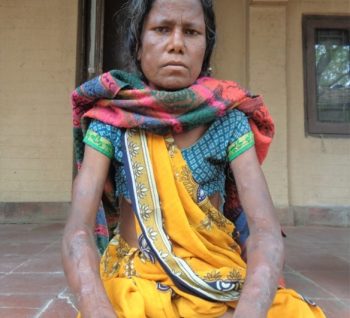
Patient at a deformities camp in Imamganj.
Maitri Charitable Trust is dedicated to providing essential humanitarian services in India, focusing on healthcare, education, and social welfare for underserved communities. The trust’s initiatives encompass leprosy treatment, maternal and child health programs, animal welfare, and education for marginalized groups. Guided by compassion and Buddhist principles, Maitri’s efforts offer hope and significantly improve the quality of life for thousands in need.
The rising cost of living has heavily impacted the communities served by Maitri, leading to increased financial strain and a surge in patient attendance at their clinics. In response, staff salaries were raised to reflect the challenging environment. Despite these economic pressures, their commitment to primary healthcare remains unwavering. However, the treatment of leprosy and tuberculosis (TB) has not yet met the necessary standards for control or elimination. Maitri has intensified efforts to detect and follow up on new cases, addressing these pressing public health concerns.
Key initiatives included identifying and managing 360 new TB cases, collecting 180 sputum samples for analysis, and extending assistance to 101 under-treatment patients through monthly food rations. An Information, Education, and Communication (IEC) program raised awareness about TB across 1,052 villages. In leprosy care, 540 new cases were registered, and the Prevention of Deformities (POD) program was implemented. Awareness efforts reached 1,741 villages through community outreach and educational initiatives.
The FPMT Social Service Fund has offered US$68,600 in annual support to further bolster their initiatives in 2024.
Lamp of the Path (LOP) NGO, under FPMT Mongolia, has been a cornerstone of community service in the Amgalan ger district of Ulaanbaatar for twenty years. Operating since 2003, their soup kitchen serves 40-50 meals daily to the homeless and those struggling with alcoholism. In 2023, it provided 10,052 meals, creating a supportive and caring environment. Monthly health check-ups are conducted in collaboration with local and international medical teams, and the program also includes alcohol abuse counseling and psychological support. LOP distributes warm clothing to families and individuals, especially during the harsh winter months.
The organization grows vegetables in two greenhouses and a large garden, producing 1,301 kilograms (2,868 pounds) of vegetables last year. These are used in the soup kitchen, sold to generate funds, and distributed to needy families. The Meals on Wheels program delivers meals to 21 people in 9 families who are unable to visit the soup kitchen due to age, disability, or illness. Launched in 2023, the Children’s Program offers weekly classes on Buddhadharma, life skills, and cultural heritage to children aged 6-14. The program includes field trips and special events.
Significant upgrades were made to the LOP facilities, including a new water well, a vegetable storage unit, and a garage for the food delivery vehicle. Looking ahead, LOP expanded its services in 2024, including enhancing the Soup Kitchen and Children’s Program, and exploring new partnerships to support the community further. For instance in 2023, they have revitalized links with Alcoholic Anonymous outreach workers and initiated collaborations with organizations like the Mongolian Quilting Center and OneSky Mongolia to provide training and support to single mothers and caregivers.
Support from the Social Services Fund, amounting to US$39,200, has been instrumental in sustaining all these initiatives.
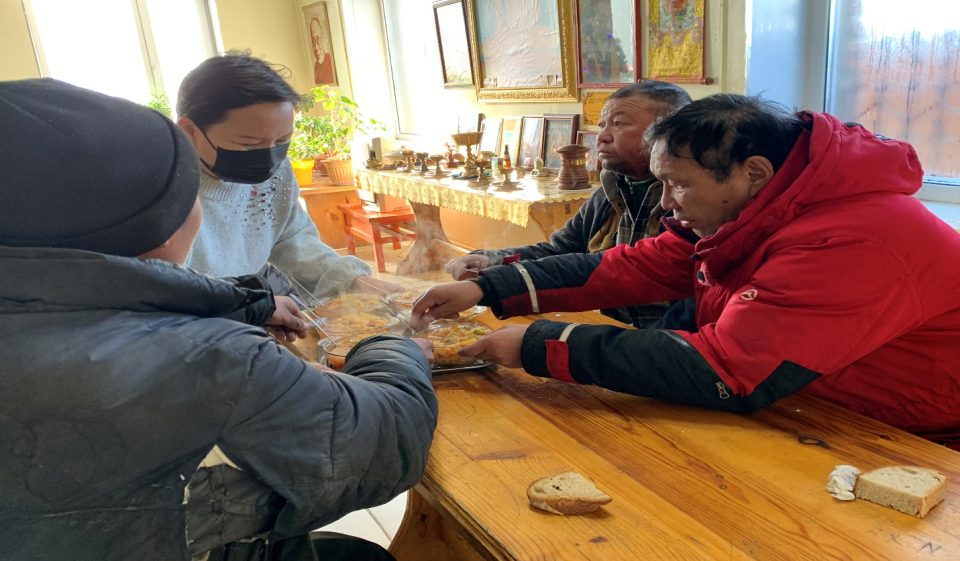
Beneficiaries of the Lamp of the Path Soup Kitchen enjoying their daily lunch.
Patient Care Trust (PCT), an NGO operating primarily in Northern India, is dedicated to providing essential healthcare services to the Tibetan community in exile. The organization focuses on supporting the ordained Sangha, elderly Tibetans, and delivering crucial social services.
One of PCT’s notable achievements is the organization of free medical camps in collaboration with leading government hospitals such as AIIMS-Delhi, Safdarjung, and NITRD. These camps provide in-person diagnostics, minor surgeries, and preventative care to vulnerable Tibetans, particularly in remote areas like Dharamsala and Bodhgaya. To date, PCT has conducted nine medical camps, reaching hundreds of individuals and offering life-saving care.
In addition to medical camps, PCT addresses critical medical emergencies by referring patients to top hospitals, significantly reducing costs by 80-90% compared to private healthcare. Since 2020, PCT has supported over 8,500 patients, providing services ranging from life-saving surgeries to long-term treatment plans. Additionally, the NGO offers destitute aid to cover medical costs for the most impoverished patients and provides housing support for those undergoing long-term treatments in Delhi hospitals. This comprehensive approach ensures that financial and logistical challenges do not hinder access to proper care.
Looking ahead, PCT’s activities will be further strengthened by the Social Service Fund’s support of US$18,762 in 2024.
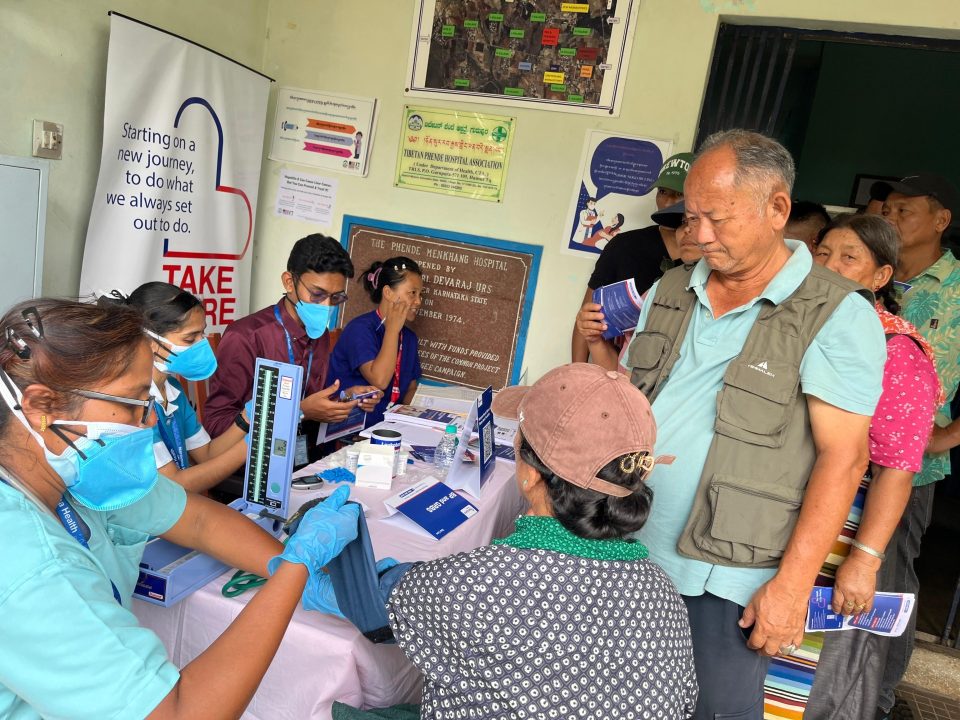
The Tibetan Heart Foundation’s free medical camp.
Tibetan Heart Foundation is a beacon of hope, delivering comprehensive healthcare services to Tibetan settlements across India and significantly improving health outcomes for these communities. Rooted in compassion and altruism, the foundation addresses critical healthcare gaps, especially in rural areas like Bylakuppe, Hunsur, Kollegal, and the Mainpat Tibetan Settlement in Chhattisgarh.
Through strategic partnerships and a commitment to holistic and preventive healthcare, the Tibetan Heart Foundation addresses the needs of approximately 35,000 individuals annually. Its dedication to enhancing the quality of life in Tibetan communities ensures that health and well-being are prioritized for all ages and backgrounds, fostering healthier, more informed societies across these settlements.
A key initiative of the foundation is organizing free medical camps, which provide essential healthcare services and early health check-ups, thereby reducing the financial burden on patients. These camps offer a variety of medical services, including 2D Echos, ECGs, bone mineral density tests, mammography screenings, and pap smear tests. Additionally, the foundation distributes general medicines as prescribed by doctors, ensuring patients receive necessary care without financial strain.
Preventive care and health education are also central to the foundation’s mission. Their initiatives focus on educating communities about heart health and the importance of cardiopulmonary resuscitation (CPR), particularly in Southern Indian settlements. By raising awareness and promoting proactive health management, the foundation empowers residents to take charge of their well-being.
The foundation also invests in educational endeavors, such as distributing CPR dummies to schools for training and conducting emergency medical training tours for students. These programs equip community members with critical skills and knowledge to manage health emergencies effectively.
Recent accomplishments of the foundation include successful free medical camps in Bylakuppe and Kollegal. In Bylakuppe, the camps served 150 individuals, primarily the elderly, providing services such as 2D Echos, ECGs, Pap smear tests, and distributing 89 free spectacles. Similarly, the Kollegal camp benefited 109 people, offering ECGs, Pap smear tests, bone mineral density checks, and breast examinations.
In 2024, the foundation received an offering of US$11,082 from the Social Services Fund to support its operations. This contribution is crucial in sustaining and expanding the foundation’s impactful work.
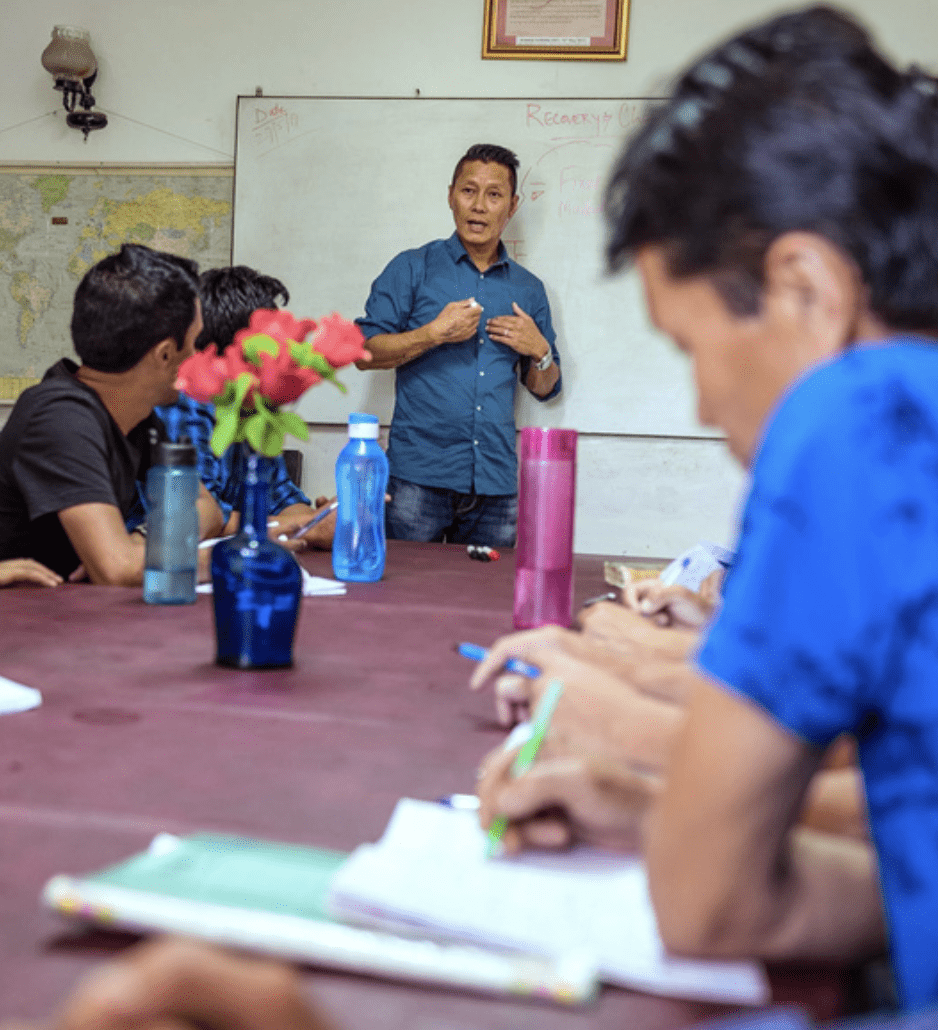
Ngawang Nyima, the Founder of Rewa Youth Center, offers a daily counseling group session.
Rewa Youth Center in Rajpur, Dehradun, India, is a dedicated initiative aimed at supporting Tibetan young men struggling with substance abuse. Established with the mission to provide comprehensive care and rehabilitation, the center has made significant efforts over the past years. Through a combination of innovative programs and community outreach, Rewa is committed to fostering recovery and personal growth among its patients.
In 2023-2024 the center has introduced several new programs, including one-on-one counseling, virtual therapy sessions, and enhanced staff training to better address addiction and mental health issues. Community outreach efforts have expanded as well, incorporating art therapy, yoga, and mindfulness training, which have been well-received by participants. The introduction of online counseling initiatives and a guitar luthier program exemplifies Rewa’s dedication to holistic recovery and skill development. Additionally, the center has expanded its educational offerings to include comprehensive addiction and recovery education, addressing root causes, triggers, and healthy coping mechanisms.
Another center’s notable achievements is the introduction of a food truck initiative, providing employment opportunities for those who have completed their treatment programs. Additionally, the center has organized outdoor activities and weekly sessions on Buddhist teachings to support spiritual growth. Over the past six months, 29 new participants have joined the program, and 19 individuals have graduated. Employment opportunities have been secured for several graduates too.
Overall, Rewa has successfully helped 55 people recover from addiction, achieving a 70% success rate. The center remains committed to providing quality care and ongoing support to ensure lasting recovery for its patients.
Financially, the center has utilized grants from various organizations to cover rent, utility bills, and hire experienced counselors familiar with Tibetan culture. The Social Services Fund offered US$14,240 to support their efforts.
With sincere thanks and gratitude to Italian Buddhist Union for providing grants for the above three initiatives that enabled this essential support.
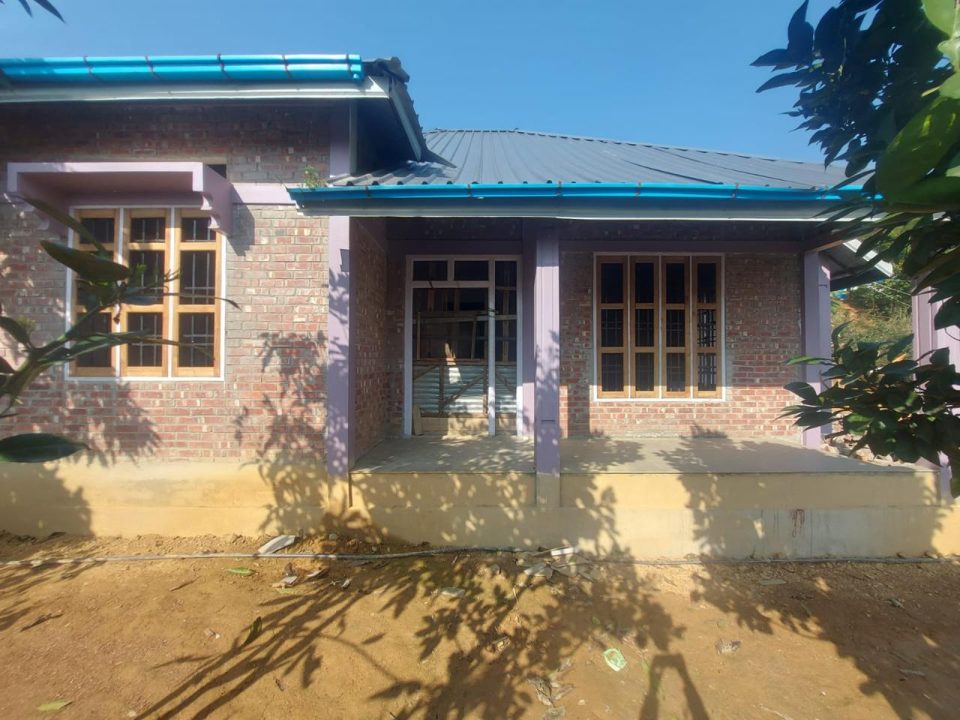
IITCMI’s shelter is nearly finished, funded in part by a grant from Lama Zopa Rinpoche the Social Services Fund.
Integrated Indigenous Tribal Children Ministry of India (IITCMI) is dedicated to supporting homeless and orphaned children from indigenous and tribal communities. Their mission is to provide a safe, nurturing environment with access to basic necessities, education, and healthcare.
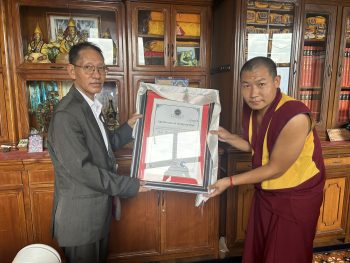
Karma Tashi of IITCMI offering thanks for the contribution from Lama Zopa Rinpoche toward the orphanage.
IITCMI focuses on creating stable living conditions for children who have lost their families or homes. One notable project is the construction of a shelter for these vulnerable children, which began in 2019. This initiative, supported by individual donations and a generous fund from Lama Zopa Rinpoche, aims to offer a secure living environment. Lama Zopa Rinpoche contributed US$50,000 through the Social Services Fund, substantially aiding the project. In 2024, significant progress has been made, with all necessary materials, including doors and windows, purchased and ready for setup. Electrical installation, painting, and fencing work are currently in progress, adding the finishing touches to the facility.
Despite the progress, the project has faced challenges, particularly due to recent riots in the area, which have affected the transportation and delivery of construction materials, causing delays. However, the team remains committed to overcoming these obstacles and ensuring the timely completion of the shelter.
In 2022 Lama Zopa Rinpoche met Dr. Ram Kumar Shrestha, who had just summited Mount Everest to raise funds for a much-needed catheterization laboratory or Cath lab for Nepal. Cath labs are used to treat patients with heart conditions minimally, without resorting to major surgeries or other invasive procedures and are an important part of treating heart conditions.

Catheterization laboratory
A cath lab is a procedural hospital room where minimally invasive tests and procedures are performed to diagnose and treat cardiovascular disease. The procedures performed in a cath lab involve tiny, flexible tubes called catheters (which is where the name is derived from). These catheters can be used as an alternative to surgery to access the heart and blood vessels.
Rinpoche was very impressed with Dr. Ram’s efforts and understanding the need for this essential medical equipment in Nepal in 2022 and 2023, Rinpoche personally began fundraising for it and committed to give US$300,000 for the cath lab.
In 2024 we were able to fulfill Lama Zopa Rinpoche’s commitment and offered US$300,000 to The Karuna Hospital in Nepal for the cath lab system. A student of Lama Zopa Rinpoche, who is a medical doctor, has also been facilitating the acquisition of the equipment at a good rate and getting it into Nepal.
We would like to extend our heartfelt thanks to all the compassionate donors who generously supported the crucial projects aimed at assisting local communities in 2024. Your kindness and contributions have made a remarkable impact and are truly appreciated.
How to Help
All are welcome to offer toward the Social Services Fund, to support essential health care for those who are truly vulnerable and in need.
The Social Services Fund, established to support Lama Zopa Rinpoche’s Vast Visions for the FPMT organization, focuses efforts primarily in India, Nepal, Tibet and Mongolia. Funds help children, the elderly, sick, and very poor.
- Tagged: integrated indigenous tribal children ministry of india, karuna hospital, lamp of the path, maitri charitable trust, patient care trust, rewa youth center, shakyamuni buddha clinic, social services fund, tibetan heart foundation
4
An Update from Thame: Ven. Sarah Thresher Reports
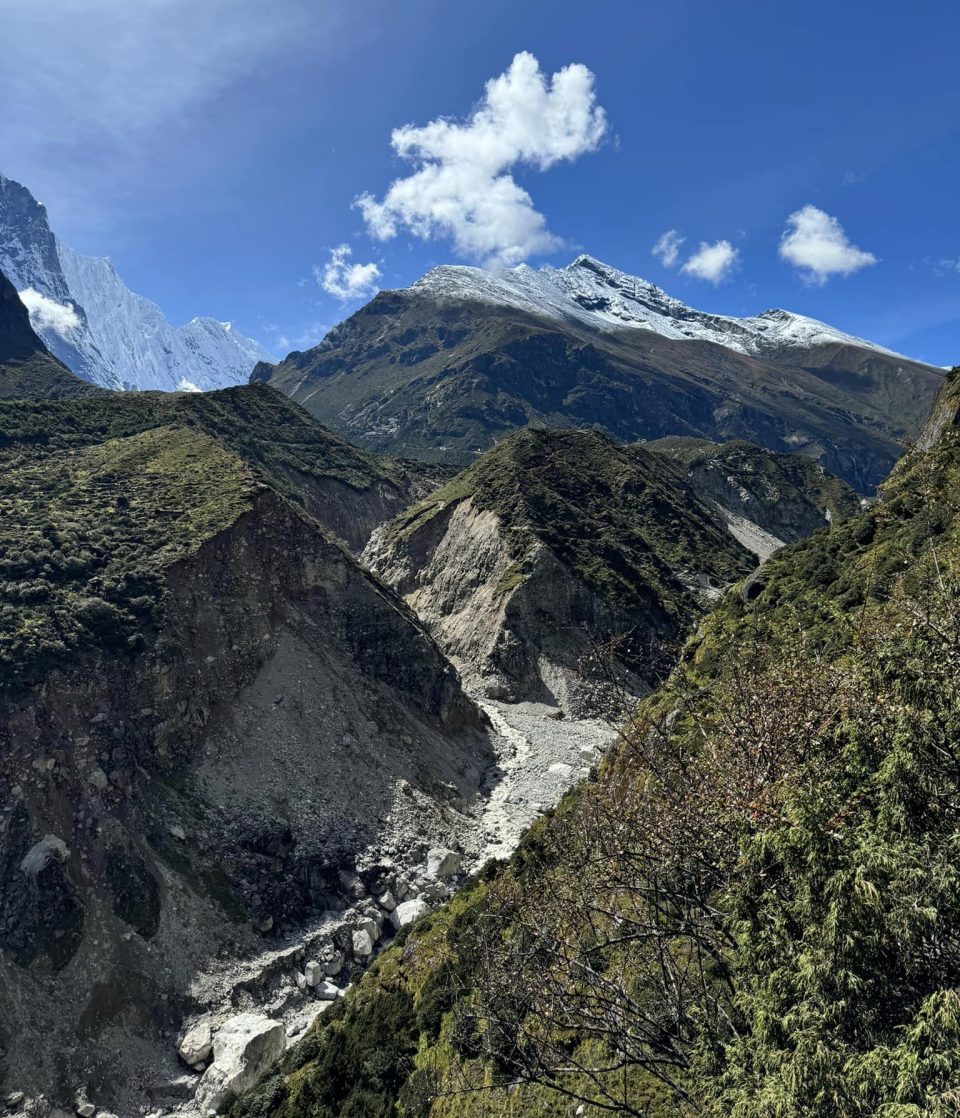
“The beautiful approach to Thame is completely washed away and instead there is a canyon of stones and gushing water from what are now three streams flowing through the village.”
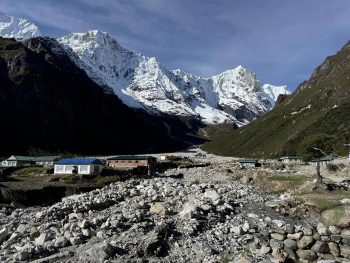
“All these houses have suffered damage and some are damaged beyond repair.”
As previously reported, on August 16 of this year, the village of Thame, birthplace of Lama Zopa Rinpoche, was hit with a devastating flood which destroyed homes, community property, and everything owned or cherished by villagers. Remarkably, not a single life was lost, but the loss of everything else was immense. The river that used to flow next to the village now runs directly through it, taking up half the land. The ground is unstable with landslides and cracks. The future of the entire settlement remains completely uncertain.
Venerable Sarah Thresher recently shared some photos, videos, and her reflections on the situation in Thame. This footage, and her thoughtful insight, really highlight the severity of the situation, and the need for all of our help:
“It was impossible not to feel a deep sadness surveying the damage in Thame as the whole landscape of the village has changed irreparably: potato fields are strewn with sand and boulders, houses and lodges have been swept away or irreparably damaged, and the land is cracking, unstable and subsiding.
“Right now, it’s hard to know what the future holds. But we found a community working together and striving to keep hope alive and rebuild and reopen despite the pain in their hearts—and your support really does make a difference.”
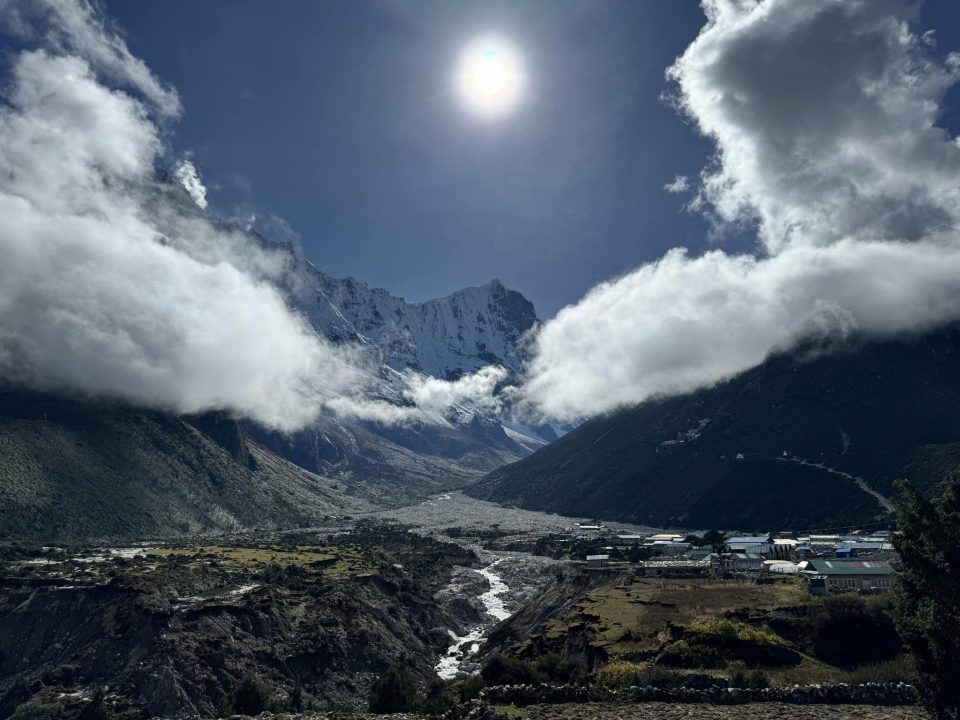
“First view of Thame … it’s still so beautiful despite the destruction. Such a special place.”
Video from the Yak Hotel, Thame Nepal:
https://youtube.com/shorts/_jPUafS4oxI?si=GzXrtG6zX8bYcXuJ
“[Regarding video]: This is the view from the back window of the Yak Hotel where I stayed in June. The dining room and kitchen were swept away along with the original house, new shower and toilet and the whole back garden and connected fields. The guesthouse is now perched over a roaring river and gutted… Behind, houses, the school, a clinic and guesthouse were washed away. It’s not even possible for the locals to say where they were located—the landscape has changed so much.”
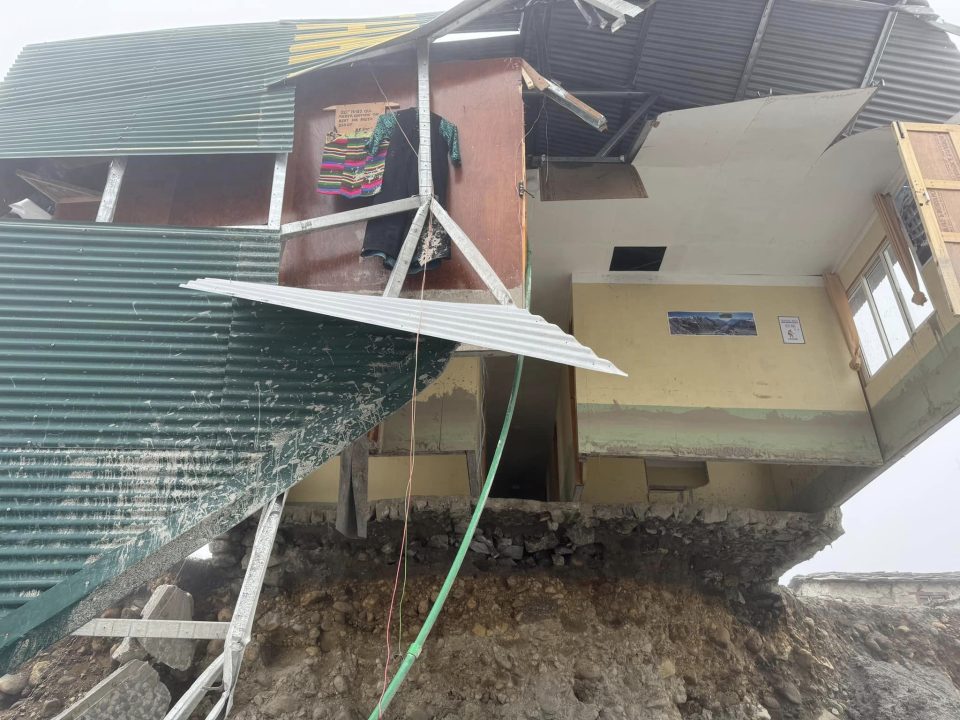
Ruins of the Yak Hotel.
“Ruins of the Yak Hotel perched over the new river that has replaced a gentle stream flowing through green fields. To get to the hotel from Rinpoche’s house it is now necessary to climb down the bank of the river, clamber over huge boulders and then walk over a simple makeshift bridge.”
Video of view from Lama Zopa Rinpoche’s birth home and prayer wheel:
https://youtube.com/shorts/MSY4UDj1N8Y?si=oDcGUTURAP0oOBjT
“[Regarding the video]: The view from Rinpoche’s birth house and the prayer wheel. Potato fields are now strewn with sand and boulders and houses washed away.”
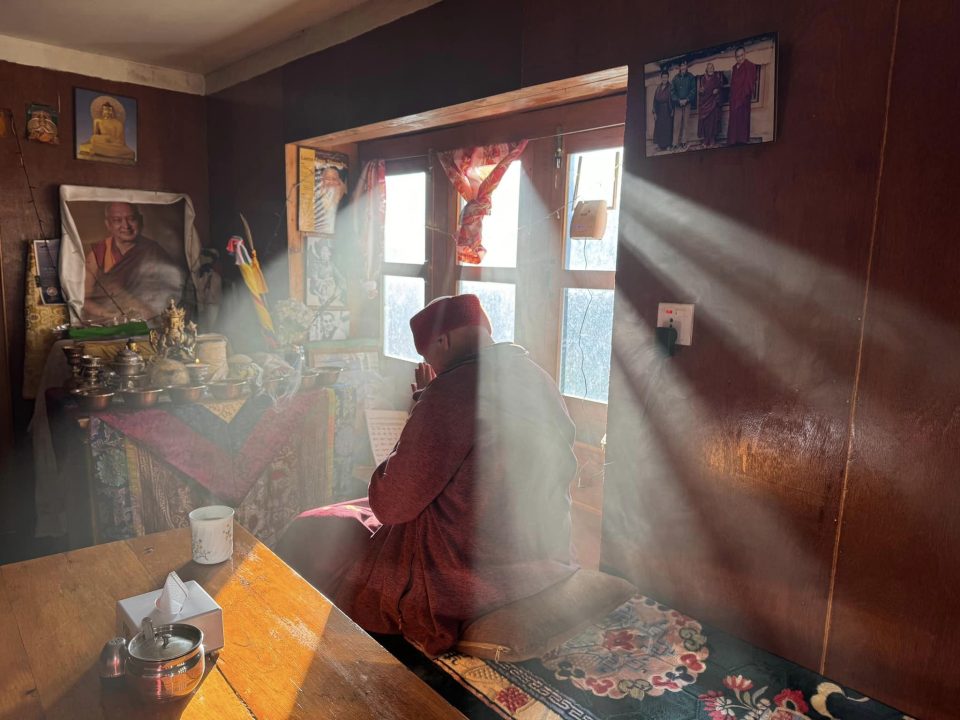
Ani Tsultrim praying at Rinpoche’s throne in his birth home, Thame, Nepal.
“Lama Zopa Rinpoche’s birth house which is now a makeshift restaurant and hotel for Rinpoche’s relatives who lost the Yak Hotel. Here is Ani Tsultrim praying to Rinpoche’s throne as the early morning sunlight streams through the window.”
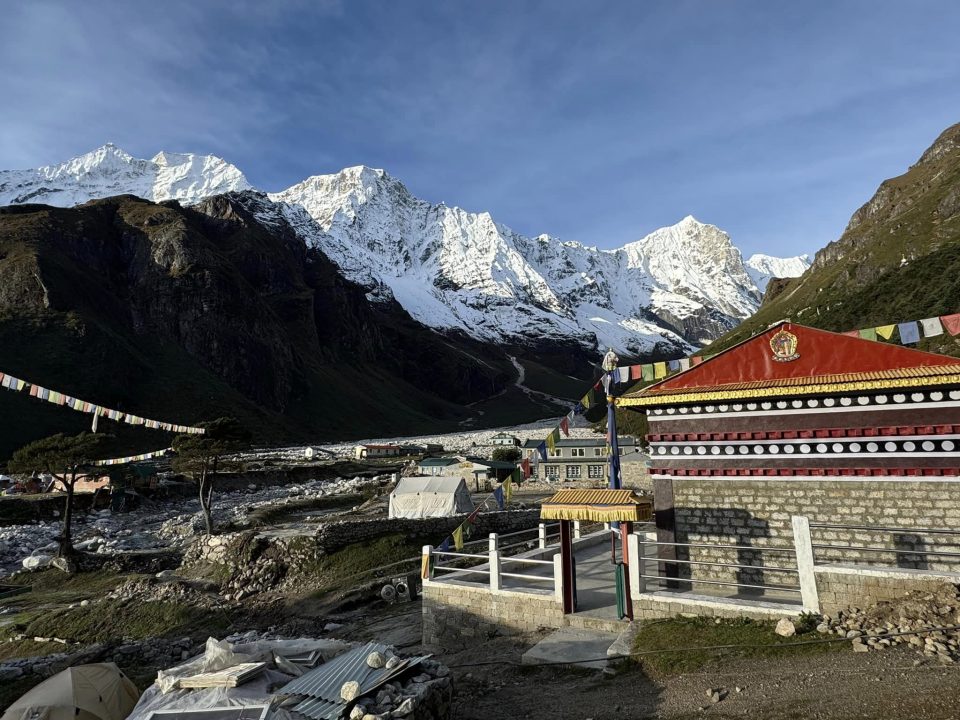
View from Lama Zopa Rinpoche’s birth house.
“View from the prayer wheel, which was sponsored by Lama Zopa Rinpoche and Rinpoche’s sister Anila Ngawang Samten, and Rinpoche’s house.”
Video of the view of Thame from the ridge and Tara Temple:
https://youtube.com/shorts/NWsHg0PwSNk?si=hfz8BWfdn1dufrpk
“[Regarding video]: The view of Thame from the ridge and Tara Temple above. The houses hugging the ridge are okay but the view is deceptive because many of these fields and house are unstable and sinking and cracking—no longer habitable. The future is uncertain. As the camera pans around you see how the village is now cut by three rivers which have formed gullies and the upper part of the village is now fields strewn with boulders and sand.”
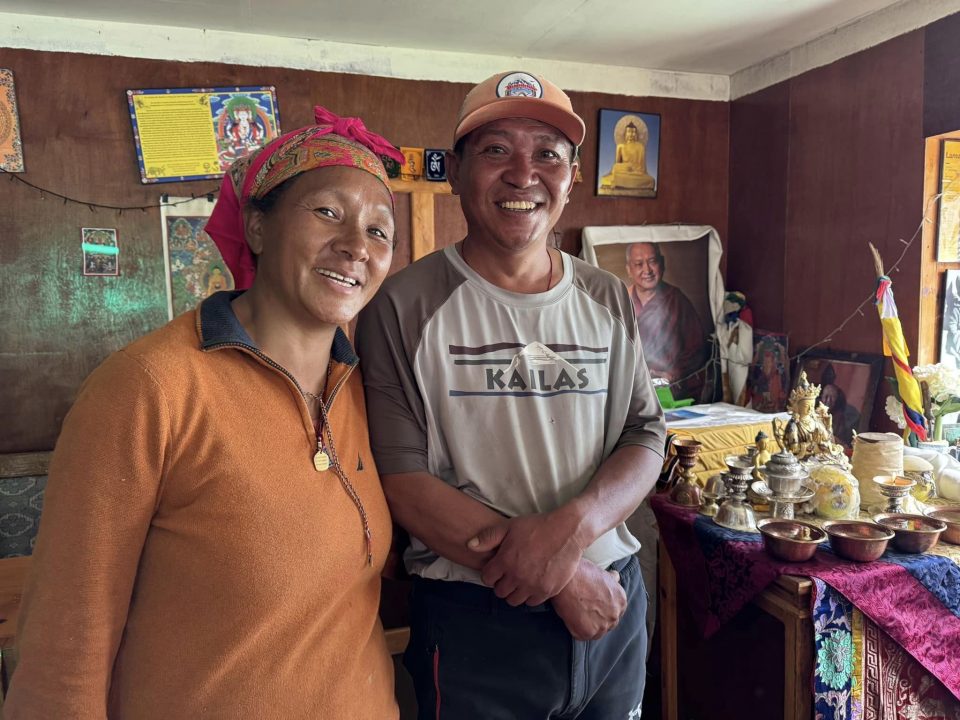
Kayla and Yangchen of Thame’s Yak Hotel. “We laugh and smile but there is pain in our hearts.”
“Kayla and Yangchen are trying to rebuild their lives amid all the uncertainty, making a place for trekkers and pilgrims to eat and stay. They lost their Yak Hotel in the flash flood and were lucky to be able to run for their lives and survive. ‘We laugh and smile but there is pain in our hearts,’ Kayla told me.
“No matter how much you hear about it nothing prepares you for the devastation of Thame when you see it.”
With grateful thanks to Ven. Sarah Thresher for these words, photos, and video.
How to Help
In response to this crisis, the Thame Support Fund has been established to provide essential aid to the residents of Thame and support their future needs. The fund will be administered through Kopan’s Helping Hands, who will work directly with the community to assess and address their needs. Please consider offering support at this most critical time: https://fpmt.org/support/socialservices/thame/
Please watch and read about a recent interview with a Thame family who describe their experience, and the uncertain situation of Thame.
Foundation for the Preservation of Mahayana Tradition (FPMT), is a Tibetan Buddhist organization dedicated to the transmission of the Mahayana Buddhist tradition and values worldwide through teaching, meditation and community service.
- Tagged: social service fund, thame, thame flood, thame support fund
26
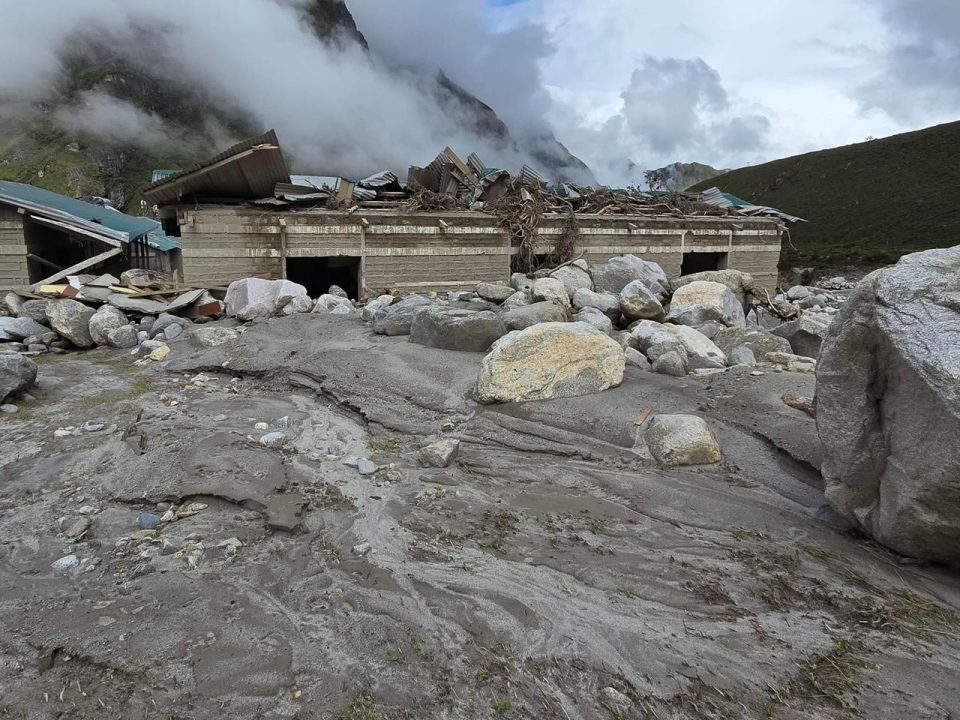
One of the many houses devastated by the recent flooding in Thame, Nepal.
On August 16, 2024, the serene Himalayan village of Thame, birthplace of our kind guru Kyabje Lama Zopa Rinpoche, faced an unprecedented calamity. Two Thyanbo glacial lakes burst their banks, unleashing a devastating flood that would forever alter the landscape and lives of its inhabitants. This glacial lake outburst flood struck with fierce intensity at 1:30 p.m., leaving a trail of destruction in its wake. The flood’s impact was immediate and severe. many homes crumbled under the torrent’s force, while the village’s elementary school and clinic – pillars of community life – were swept away.
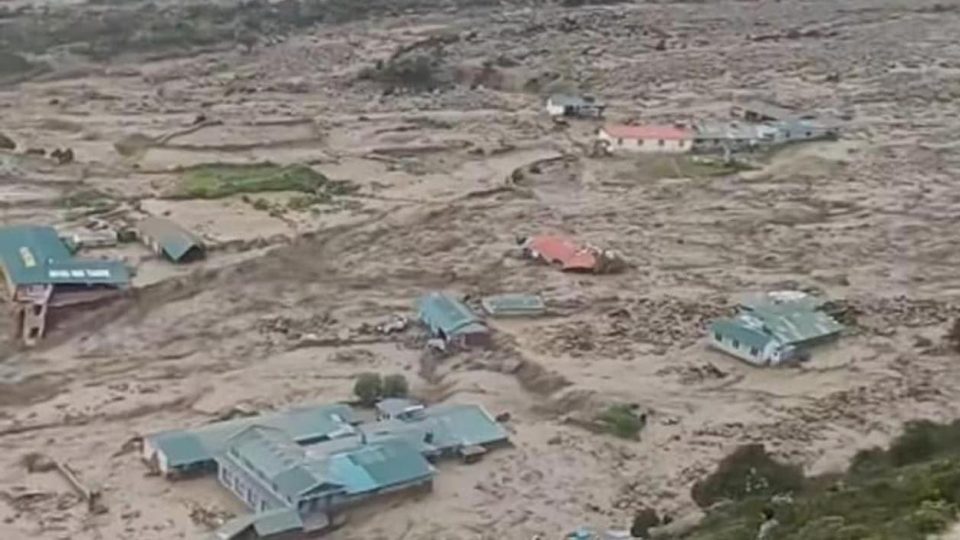
Image of the flooding in Thame.
In the aftermath, the villagers found themselves displaced, their lives upended in mere moments. The disaster buried the settlement under a mountain of debris, leaving no ground for immediate rebuilding.
Yet, amidst this chaos, a miracle unfolded. Remarkably, not a single life was lost. However, while lives were spared, Thame now faces an uncertain future. The river that used to flow peacefully by the village now runs right through it, taking up half the land. The ground is still dangerous, with landslides and cracks appearing. This ongoing instability endangers even those few houses that initially escaped the flood’s wrath, making the future of the entire settlement uncertain.
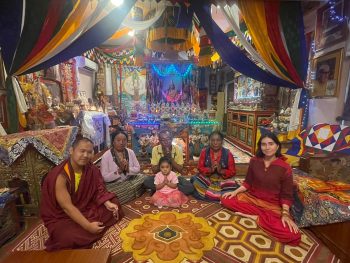
Thame family at Kopan Monastery, who shared their experience, needs, and concerns following the Thame flood.
Recently Mingma Rita Sherpa and his family came from Thame to make prayers in front of Lama Zopa Rinpoche’s kudung (holy body) at Kopan Monastery and we took this opportunity to interview them. Please watch the video of the interview. They explained the immediate needs now and then the longer-term needs, and that they are waiting to understand what will happen and if they can be relocated as well as possible allocated lands. We share below some of the more profound statements from this interview (lightly edited), and we encourage you to watch the full interview to understand the scope of their experience and how we can help.
Describing the experience of the flood:
“At first, we saw that this flood is not that strong, it’s not so big, we thought we’re safe now, it’s not so much damage in the ‘village, but again, such an unfortunate thing happened, a second flood came, and this flood was much stronger, then the previous ones. … Most of the many houses have been damaged and people were unable to save their belongings, their property and many other things. Because they were so worried, and just trying to save themselves, they ran away. … We never expected these unbelievable things. Then the flood came again and then again, the third time was the strongest, from the top it slowly swept away the village and this was really a tragedy. We could not think, it was just like a dream, we could not believe it.
“People were worried and crying, they are facing so many problems and difficulties. In the location where the Lama Zopa Rinpoche’s stupa is [Thametang Stupa] and the Mani Prayer Wheel [sponsored by Lama Zopa Rinpoche’s sister Anila Ngawang Samten], that side was not affected much by the flood. We believe that it was protected because of this Mani Prayer Wheel, as that area was not affected as much.”
Explaining some of the turmoil, loss, and devastation:
“All the things have been destroyed within a few minutes, and we were not even able to save our shoes, we just ran away, and many have even left their own shoes and had to run away. … We cannot believe it, or we cannot accept, what to really believe at first. We have been rescued by the local government and we stayed there. Of course, all the people were crying, everyone was crying, and not able to think about what had just happened. Whatever they have owned in their lifetime, everything has gone away, all has been destroyed by floods. … Unbelievable things happened, and of course we cannot imagine this, and we cannot think of this happening, and so we feel so sad, even now just remembering these things.”
Regarding the plans for rebuilding and recovering from this disaster:
“There are four or five lakes. They are not protected. Also now global warming is creating disasters everywhere in the world. … Now the government wants to rebuild Thame, but not at the same places, and they are trying to move to some other areas. Until now they have appointed the area Hungo Tengma which means upper Hungo behind southern Thame, and the government wants to rebuild Thame on the other side. That decision is not really fixed, but they are trying to rebuild Thame, but I don’t know if they will do or not. And also, ourselves we are not going to build at the moment because the route from Namche to Thame is not quiet [stable].
In Thame, half of the people are farmers, they have yaks and naaks [female yaks], and others have many other cattle. If we move to Zarog that’s too far to get cattle and that’s why some people are saying it’s a bad idea, and the best idea is upper Hungo, which is nearby, 15 minutes from Thame. But there is a problem with the drinking water. There’s no drinking water, that’s a problem, but otherwise the landscape is good really.”
A plea to take global warming and the protection of our environment seriously:
“In my opinion that we know, everybody in the world knows, that [the issue is] global warming, climate change, it continues to get warmer and warmer. Even in the winter we didn’t get any snow this winter, not only this winter, the last two years we didn’t get any snow in the winter. And in summer there was a lot of rain, and sometimes so hot, sometimes too much rain, and that means we are feeling the climate change. … I want to request everywhere in the world, everybody has to protect the environment. There are many, many factories, much smoke [pollution], and the countries who are strong, they create a lot of pollution. And even in our country we have to protect the environment, we have to plant more trees, and we have to protect cultures, also our culture’s environment. That’s why we also we have to protect our natural culture like Dharma and the language. … I think everybody, we all have to protect the environment.”
Insight into needs at this time:
“So now even material things, these things will not work there because the land is totally unstable, kind of unusable. If we could have [support] or some support with the money, with cash, we think that this is the best support now, and with that money we can have some other place. At the moment the highest priority is having money, rather than material things, trying to support to rebuild our house, all this is not working. If someone helps with cash, that is most useful for us.”
Extracted and edited for reading from an interview at Kopan Monastery, September 2024. A rough transcript of the full interview is also available. Watch the full interview with Mingma Rita Sherpa and his family:
How to Help
In response to this crisis, the Thame Support Fund has been established to provide essential aid to the residents of Thame and support their future needs. The fund will be administered through Kopan’s Helping Hands, who will work directly with the community to assess and address their needs. Please consider offering support at this most critical time.
We will provide updates on the needs and how the funds are distributed. We are sincerely requesting everyone to hold the Thame families in their hearts, as they have lost everything, including their livelihoods, homes, and land. They need our help: https://fpmt.org/support/socialservices/thame/
Foundation for the Preservation of Mahayana Tradition (FPMT), is a Tibetan Buddhist organization dedicated to the transmission of the Mahayana Buddhist tradition and values worldwide through teaching, meditation and community service.
- Home
- News/Media
- Study & Practice
- About FPMT Education Services
- Latest News
- Programs
- New to Buddhism?
- Buddhist Mind Science: Activating Your Potential
- Heart Advice for Death and Dying
- Discovering Buddhism
- Living in the Path
- Exploring Buddhism
- FPMT Basic Program
- FPMT Masters Program
- FPMT In-Depth Meditation Training
- Maitripa College
- Lotsawa Rinchen Zangpo Translator Program
- Universal Education for Compassion & Wisdom
- Online Learning Center
- Prayers & Practice Materials
- Overview of Prayers & Practices
- Full Catalogue of Prayers & Practice Materials
- Explore Popular Topics
- Benefiting Animals
- Chenrezig Resources
- Death & Dying Resources
- Lama Chopa (Guru Puja)
- Lama Zopa Rinpoche: Compendium of Precious Instructions
- Lama Zopa Rinpoche: Life Practice Advice
- Lama Zopa Rinpoche Practice Series
- Lamrim Resources
- Mantras
- Prayer Book Updates
- Purification Practices
- Sutras
- Thought Transformation (Lojong)
- Audio Materials
- Dharma Dates – Tibetan Calendar
- Translation Services
- Publishing Services
- Teachings and Advice
- Find Teachings and Advice
- Lama Zopa Rinpoche Advice Page
- Lama Zopa Rinpoche: Compendium of Precious Instructions
- Lama Zopa Rinpoche Video Teachings
- ༧སྐྱབས་རྗེ་བཟོད་པ་རིན་པོ་ཆེ་མཆོག་ནས་སྩལ་བའི་བཀའ་སློབ་བརྙན་འཕྲིན།
- Podcasts
- Lama Yeshe Wisdom Archive
- Buddhism FAQ
- Dharma for Young People
- Resources on Holy Objects
- Ways to Offer Support
- Centers
- Affiliates Area
- Teachers
- Projects
- Charitable Projects
- Make a Donation
- Applying for Grants
- News about Projects
- Other Projects within FPMT
- Support International Office
- Projects Photo Galleries
- Give Where Most Needed
- FPMT
- Shop
Translate*
*powered by Google TranslateTranslation of pages on fpmt.org is performed by Google Translate, a third party service which FPMT has no control over. The service provides automated computer translations that are only an approximation of the websites' original content. The translations should not be considered exact and only used as a rough guide.When you meet miserable conditions, it is extremely important to use skillful means. In other words, there is a meditation to mix with whatever suffering you experience. When you apply the teachings in this way, all sufferings are mixed with virtue. All experiences of suffering become virtue.








